- GTA 5 Cheats
- Print on a Chromebook
- Nothing Phone 2 Review
- Best YouTube TV Alternatives
- Asus ROG Ally vs. Steam Deck
- Gameshare on Nintendo Switch

The best web browsers for 2024
All web browsers have the same basic function, and yet, the choice between them has always been one of the most contentious in tech history. You have more options these days than ever before, whether you’re looking for the best web browser for privacy , the best for speed, or perhaps something a bit more adventurous.
To help you decide on the best web browser, we grabbed the latest browsers and put them through their paces. Even if some could use a complete overhaul, these options are your best chance for a great online experience.
The best web browser: Google Chrome
Chrome is ubiquitous — and for good reason. With a robust feature set, full Google Account integration, a thriving extension ecosystem (available through the Chrome Web Store), and a reliable suite of mobile apps, it’s easy to see why Chrome is the most popular and the best web browser.
- The 5 best laptops for browsing the web in 2024
- The best PDF editors for 2024
Chrome boasts some of the most extensive mobile integration available. Served up on every major platform, keeping data in sync is easy, making browsing between multiple devices a breeze. Sign in to your Google account on one device, and all Chrome bookmarks, saved data, and preferences come right along. Even active extensions stay synchronized across devices.
Chrome’s Password Manager can automatically generate and recommend strong passwords when a user creates a new account on a webpage. Managing saved passwords and adding notes to passwords is even easier. The search bar, or Omnibox, provides “rich results” comprised of useful answers, and it now supports generative AI capabilities. Favorites are more accessible as well, and they’re manageable on the New Tab page. And it’s now easier to mute tabs to avoid unwanted sounds.
Other updates have included a Dark Mode for Windows and macOS , better New Tab customization and tab group creation, tab hover cards, and an in-browser warning if your password was discovered in a data breach. There’s a price tracking feature that can help locate the best deals. Android users will appreciate the Phone Hub for linking and monitoring their phones. There’s also the ability to quiet notifications, so websites don’t bombard you with requests to enable in-browser notifications.
What’s the bottom line? The Google Chrome browser is fast, free, and even better looking than before. With a thriving extension ecosystem, it’s as fully featured or as pared-down as you want it to be. Everything is right where it belongs, privacy and security controls are laid out in plain English, and the browser just gets out of your way. While it can be a little RAM-hungry at times , Google is working to make it more efficient — like Microsoft’s Edge, Google can now hibernate tabs in the background to stop them from using too many resources.
Overall, Chrome remains the best web browser download for the average user.
And, things are looking to get even better. Google announced some significant upgrades to the browser that haven’t gone live yet, to celebrate Chrome’s 15th birthday . A Material You design language will allow users to customize Chrome’s look and feel and attach themes to profiles to make it easy to tell them apart. The menu system will be revamped to provide easier access to a variety of settings and features including Extensions, Password Manager, Translate, and others. The Chrome Web Store will be redesigned using Material You to be easier to use, and AI will help identify useful extensions. And finally, Safe Browsing will now work in real time to protect against threats.
The best Chrome alternative: Microsoft Edge
In response to the market’s rejection of its original home-grown Edge browser, Microsoft rewrote Edge using the open-source Chromium web browser engine. The new Edge launched on February 5, 2020 , as a separate, stand-alone browser that replaced the integrated version. It became part of Windows 10 with the May 2020 update, although you can still download it for Windows 10 builds prior to version 2004. Of course, it’s the default web browser for Windows 11.
At first glance, the new Edge browser looks and feels like Google Chrome. It prompts you to import Chrome’s bookmarks toolbar and other settings. This is great if you hated the old Edge browser and want to give Microsoft’s new browser another shot. It also supports Chrome extensions , though the browser leads you to the Microsoft Store for add-ons. You must manually load the Chrome Web Store to install anything not listed in Microsoft’s repository.
However, it’s not Chrome with a Windows 11 theme. Microsoft reportedly disabled many features, including Google’s Safe Browsing API, ad blocking, speech input, Google-centric services, and more. In return, the company worked to optimize Edge and reduce its footprint while continuing to add new, Microsoft-oriented features. As of January 2023, Edge is the most efficient browser in terms of memory usage. It also allows sleeping tabs, to let tabs release their resources when they haven’t been used for some time.
Features launched since its release have included the new Edge Sidebar that provides easy access to various tools, more flexibility in managing how Edge starts up, Citations to make it easier for students to cite sources, and various other updates to make the browser more productive. Edge Workspaces lets users organize tasks into dedicated windows, and Microsoft has continuously tweaked various features, like the Edge Sidebar, to make them more user-friendly.
Microsoft Edge also provides simpler privacy settings and security updates. Microsoft Edge uses a graphically friendly interface that displays three security levels: Basic, Balanced, and Strict. With Balanced set as the default, many sites request you to disable your pop-up blocker even though one isn’t manually installed. All in all, we’re very optimistic that Edge is on its way to challenging Chrome as the best web browser.
The best Chromium alternative: Mozilla Firefox
Firefox is the best browser that’s not based on the Chromium browser engine. Mozilla has taken real strides to make its browser a truly modern way to surf from site to site, thanks to efforts like its upgrade to Firefox Quantum , its VR alternative Firefox Reality , and password-free browsing .
It wasn’t too long ago that Mozilla rebuilt the browser’s interface, offering a cleaner, more modern take on what a web browser should be. The changes weren’t just skin-deep, however. There’s some impressive engineering going on behind the scenes.
For example, Firefox Quantum is designed to leverage multicore processors in ways that its competitors just aren’t doing. It was not designed to make a huge difference in your day-to-day browsing, but Mozilla hopes this design will give Firefox Quantum an edge moving forward. By engineering for the future now, Firefox Quantum is in a better position to take advantage of quicker processors as they emerge.
Some Firefox strengths include privacy protections with SmartBlock anti-tracker support, improved password syncing across devices, enhanced readability, integrated breach alerts, and a Protections Dashboard that provides a summary of how Firefox protects your privacy behind the scenes. WebRender improves the graphics performance on Windows PCs with Intel and AMD CPUs.
Recent updates include easier download management, captions, and subtitle support on YouTube, Prime Video, and Netflix videos watched in picture-in-picture mode, HDR support in macOS, and the ability to edit PDFs with text, drawings, and signatures. Firefox can also recognize text from an image, which is copied to the clipboard when selected. Finally, Firefox Colorways provides new options for optimizing how Firefox looks on-screen.
Beneath those changes, Firefox remains a comfortable, familiar standby. It’s a capable browser with a deep catalog of extensions and user interface customization. While managing settings across platforms isn’t as seamless as Google Chrome , the mobile browser app lets you share bookmarks between devices when using a free Firefox account.
There’s a bit of a fringe benefit, too. Since it’s been around longer than Chrome, some older web apps — the likes of which you might encounter at your university or workplace — work better on Firefox than they do on Chrome. For that reason, it never hurts to keep it around.
Overall, Firefox is more privacy-centric than Chrome and comparably fast, but its feature set isn’t quite as expansive elsewhere. If you like the sound of this, download the Firefox browser today.
The most innovative web browser: Opera
Another venerable browser and popular alternative, the Opera browser shares much of Chrome’s DNA and deserves its place as one of the best web browsers. Like both Edge and Chrome, Opera is built on Google’s open-source Chromium engine and, as a result, they all have a very similar user experience. Both feature a hybrid URL/search bar, and both are relatively light and fast.
The differences appear when you look at Opera’s built-in features. Where Chrome relies on an extension ecosystem to provide functionality users might want, Opera has a few more features baked right into the browser itself. It introduced a predictive website preload ability, and an Instant Search feature isolates search results in their separate window while the current page fades into the background, letting users more easily focus on the research task at hand.
You can install extensions from the Opera Add-ons store , which are just like Chrome extensions. Similar to Google’s browser, you’ll find useful tools like Giphy, Amazon Assistant, Avast Online Security, Facebook Messenger, WhatsApp, and more. If Chrome’s wide variety of extensions is important to you, then Opera becomes an intriguing alternative. It might just be one of the best browsers for quickly navigating web pages.
Opera also features a built-in “Stash” for saving pages to read later. There’s no need to sign up for a Pocket or Evernote account to save a page for later reading. Similarly, Opera features a speed-dial menu that puts all your most frequently visited pages in one place. Google Chrome also does this, but only on a blank new tab. Finally, Opera has a built-in unlimited VPN service, making it a more secure browser option.
The biggest changes came with Opera 60 and Reborn 3, a complete revamp that brought a new borderless design, Web 3 support, and a Crypto Wallet, allowing users to prepare for blockchain-based sites. With version 69, Opera became the first browser with a built-in Twitter tool, and the company has added others as well including Instagram and TikTok. Just click the icon on the toolbar, log in to your account, and tweet away right from within the slide-out menu.
Other recent advancements include Lucid Mode, which sharpens video playing on a variety of platforms, supports emojis instead of web links, and other enhancements. The Opera Sidebar adds new functionality much like Edge’s Sidebar, allowing quick access to various Opera features. And Opera Aria adds new generative AI capabilities built right into the browser.
You can see that we’re well into hair-splitting territory, which is why it’s important to remember that your choice of browser is, more than any other service or app you use each day, entirely dependent on your personal preferences — what feels most right for you. The Opera web browser has a unique look and feel, and it combines some of the best features of Mozilla Firefox and Google Chrome.
Alternative browsers
While the preceding browsers will meet most users’ needs, other alternatives exist for anyone looking for something different. This section is for those who have a more niche preference in web browsers or want to try something new.
Apple Safari
If you use Apple devices exclusively, Safari is already your default browser. It’s also significantly faster than in the past, surpassing Chrome in its quickness. It’s integrated into iOS, iPadOS, and macOS, and you’ll likely get better battery life thanks to Apple’s in-house optimizations and the underlying hardware.
Safari also focuses a great deal on privacy and security. If you want to minimize how you’re tracked and whether Big Brother is looking over your shoulder, then Safari is a good choice. If you also use an iPhone and/or an iPad, then using Safari on your Mac will make for the most seamless transition between platforms. Open websites on an iPad or iPhone are carried over to macOS.
Safari is not offered outside the Apple ecosystem.
Vivaldi Browser
The Vivaldi browser is truly unique. No two Vivaldi users will have the same setup. When you run it for the first time, you’re guided through a setup process that lays out your browser in a way that makes sense for you. You choose where your tabs and address bar go and whether you want browser tabs displayed at the top of the page or in a separate side panel. This is a browser built from the ground up to deliver a unique user experience, and for the most part, it succeeds. Vivaldi 2.0 enhanced the customization features and made them easier to access.
This browser excels at customization, and you can choose from a variety of tasteful themes that don’t feel dated or out of place on a modern PC, in addition to the aforementioned UI choices. It also has some standout privacy-enhancing features, like its team-up with DuckDuckGo to make the non-tracking search tool the default option when in privacy mode.
Finally, recent updates added more powerful tab management, enhancements like Web Panels that make for smarter browsing, and (as mentioned) even more powerful customization options. Other new updates include a built-in ad blocker, a built-in tracker blocker, a clock in the Status Bar, a new Notes Manager, and a Break Mode for pausing the internet while keeping the browser open.
Brave Browser
One of the most unusual browsers around is Brave — or, perhaps, it’s Brave’s business model that’s the strangest. Brave blocks all ads on all web pages by default, which makes it arguably the fastest browser around. Ads are a huge portion of how many websites make money — block these ads, and suddenly the most important web financial tool is eliminated.
That’s where the Brave Rewards program comes in. Users receive Basic Attention Tokens (BATs) when they view alternative ads that Brave places in the browsing stream. Users can pass along a portion of their tokens to publishers. As of January 2021, there were over 70,000 websites that supported BAT-based transactions through the Brave browser, including Wikipedia, The Guardian, WikiHow, MacRumors, and more.
What’s in it for users? Simply put, if you’re not waiting for ads to download along with website content, then your web experience will feel much faster. Brave performs no user tracking, making it ideal for private browsing as well.
Tor Browser
The Tor Browser is a version of Firefox that serves one very specific purpose: A simple entry point for The Onion Router, or Tor .
Tor is software combined with an open network aimed at making you invisible by routing your traffic through several anonymous servers. While it’s not foolproof, it’s very difficult for someone to identify you when you’re properly configured and using something like the Tor Browser to surf the web — especially if combined with a VPN .
There are many legitimate uses of the Tor Browser and the Tor network. It’s a good choice for people who live in countries with repressive governments, as well as journalists and activists. The dark web is also one of the destinations for people using Tor, which includes many nefarious and illegal sites.
In any event, if you want to remain completely anonymous while surfing the web, the Tor Browser and network are for you. If you want a more mainstream alternative, Opera includes a VPN component, but it’s far less private.
Avast Secure Browser
Avast Secure Browser first arrived as the Opera-based Avast Safezone Browser in 2016 as part of the Avast Antivirus paid bundle. It was revised and rebranded in 2018 as a free stand-alone product based on Chromium. Originally the “SafeZone” aspect kicked in when users visited websites to make purchases or manage money.
Avast Secure Browser provides several built-in tools to protect your data and privacy. These include an anti-phishing module, fingerprinting and online tracking prevention, an ad blocker, and a Webcam Guard tool to control which websites can access your camera. The Hack Check tool will determine if your info was leaked in a data breach.
Avast Secure Browser is a stand-alone download for Windows, macOS, Android, and iOS. The desktop version doesn’t include an integrated VPN but instead directs users to download the company’s separate SecureLine VPN software. The listed Bank Mode — part of the Avast Free Antivirus client — flips on when users load a banking website.
Best web browser features — what to look for
Benchmark tests.
Notice we don’t include Safari in our main comparison. Apple’s Safari web browser is unavailable on Windows, Android, or Chrome OS, so we removed it from our primary list.
Most browsers are compatible with web standards and handle performance with relative ease. A casual user probably won’t notice a difference in the rendering speed between today’s modern browsers, as all six are much faster and leaner than those of a few years ago.
We ran the following benchmarks on a desktop with an AMD Ryzen 7 5800X processor, 32GB of RAM, a 1TB M.2 PCIe NVMe solid-state drive, and Windows 11. All browsers were clean installs of the most current production versions as of January 2023, and all were run at their default settings.
First, JetStream 2 is a JavaScript and WebAssembly benchmark. It tests how quickly a web browser can start and execute code, and how smoothly it runs. Higher numbers are better.
Notice how all three Chromium-based browsers outperform Firefox. In fact, there’s very little difference between them, while Firefox’s performance is quite poor by comparison.
The next test we ran was Speedometer 2.0 . It measures how responsive a browser is to web applications by repeatedly adding a large number of items to a to-do list. Higher numbers are better.
Here, Opera led the pack, with Chrome and Edge running nearly neck to neck. Firefox came in last here with a relatively low score.
Finally, we tested how much RAM each browser uses, both with no tabs open and then with 10 tabs open accessing the same popular sites. We made sure that each browser had no extensions running, and we let each browser settle in before looking at its memory use. For the test with 10 tabs open, we averaged memory use when all the tabs were opened and then five minutes later to account for any variability.
It’s not a scientific test, but it should be sound enough to give you an idea of which browsers are the most and least efficient in terms of taking up your RAM. We found Opera to use the least amount of RAM when first opened, barely ahead of Edge, while Chrome used the most. Edge used the least with all 10 tabs loaded by a significant margin, a third or less than the other browsers. Chrome used the most with all 10 tabs open, and Firefox and Opera weren’t far behind.
Security and privacy
The most valuable tool for secure and private browsing is user discretion, especially when you consider that every web browser has encountered security breaches in the past. In particular, Internet Explorer and Chrome’s reputations for protecting users’ security and privacy credentials are spotty at best.
Chrome, Safari, Vivaldi, Opera, and Firefox all rely on Google’s Safe Browsing API to detect potentially dangerous sites. Thanks to constant updates, Mozilla, Chrome, and Opera all make constant security improvements. Microsoft disabled this API in Edge.
All browsers offer a private session option, too. Private sessions prevent the storage of browsing history, temporary internet files, and cookies. Browser support for Do Not Track remains spotty.
Mozilla made some strides in differentiating itself from others with a real focus on privacy in recent years. It even debuted a Facebook Container in 2018 to make it harder for the social network to harvest user information.
Frequently asked questions
Do you need to use a VPN when browsing the web?
You do not have to use a VPN when browsing the internet. However, a VPN can be a good tool to use as it protects your privacy and data by creating a secure and encrypted data tunnel between your browser and a VPN server. In turn, that server creates a secure and encrypted connection between it and the target website.
As a result, the website can’t identify you personally, nor can it see your true geological location or internet address. Not even your ISP knows where you’re surfing or the device you use with a VPN enabled. Some VPN services are free while others require a subscription. We have a list of the current best VPN services .
Which browser is most used in the world?
Google Chrome leads the web browser market with a 64.68% share, according to Statcounter . Apple Safari follows with 18.29%, Edge at 4.23%, Mozilla Firefox at 3.01%%, and Opera at 2.25%. Internet Explorer is still in use with 0.81%, while Microsoft Edge “Legacy” is fading out at 0.32%.
What are the best ad blockers to use for your browser?
We have a guide on the best ad blockers for Google Chrome , but here’s a short list:
- AdBlock and AdBlock Plus
- AdGuard (Chrome only)
- CyberSec by NordVPN
- Poper Blocker (Chrome only)
- Stands Fair AdBlocker (Chrome only)
- uBlock Origin (Chrome and Firefox only)
What is browser fingerprinting and how can you prevent it?
Websites want to know everything about you: Your tastes, your habits, and where you like to surf. When you load a website, it quietly runs scripts in the background that collect information about you and your device. The operating system, the web browser, all installed extensions, your time zone — all of this information is strung together to create a “fingerprint,” which in turn can be used to trace you across the internet via cross-site tracking.
Avast provides a detailed explanation and outlines various forms of fingerprinting. For example, the “canvas” method forces the browser to draw an image or text in the background, without the user knowing, to determine the operating system, web browser, graphics card, installed drivers, and the current font style. Device fingerprinting determines all internal and external device components.
As your fingerprint is tracked across the internet, this “profile” can be sold to data brokers, who then resell the data to advertisers. It’s a more silent means of gathering information about you versus using cookies that require your consent. The problem is, browser fingerprinting is still perfectly legal.
The best way to prevent browser fingerprinting is by randomizing and generalizing data. Third-party software like Avast AntiTrack does this by inserting “fake” data when website scripts try to collect your information. However, this tool allows scripts to continue running in the background so the website doesn’t “break.”
Many browsers offer some type of anti-fingerprinting protection. These include Avast Secure Browser (see above), Brave Browser (randomization), Mozilla Firefox (blocks fingerprinting scripts), and Tor Browser (generalization).
Editors' Recommendations
- 9 best 2-in-1 laptops in 2024: tested and reviewed
- The 23 best Google Chrome themes in 2024
- The best Chrome VPN extensions for 2022
- Best Products
- Google Chrome

Mark has been a geek since MS-DOS gave way to Windows and the PalmPilot was a thing. He’s translated his love for technology into a marketing, consulting, and freelance writing career aimed at helping people use technology to enhance their lives. At Digital Trends, he reviews laptops and desktops, including the latest from HP, Dell, Lenovo, Apple, and more, and writes news and easy to understand how-to articles about the computing industry as a whole.
When he’s not writing, you’ll find him reading and watching science fiction, taking photos with his family, and obsessing over Indiana University basketball.
Laptop Reviews
Best Budget Laptops Best 2-in-1 Laptops Best Business Laptops Best Laptops Under $1,000
You don't need to spend several hundreds of dollars on a new laptop that you'll use as a productivity tool because there are budget-friendly options like the Asus Vivobook Go L510MA. It's actually currently even cheaper from Walmart after an $80 discount, which brings its price down to just $199 from $279 originally. There's no telling how much time is remaining before the offer expires though, so if you want to take advantage of it, you're going to have to proceed with the purchase as soon as possible.
Why you should buy the Asus Vivobook Go L510MA For a laptop that will be able to handle basic activities like doing online research, building reports, and browsing social media, you can't go wrong with the Asus Vivobook Go L510MA. It's equipped with the Intel Pentium Silver N5030 processor and 4GB of RAM, which are a far cry from the specifications of the best laptops, but it will be enough for simple tasks. The device also comes with a 15.6-inch screen with Full HD resolution, which is pretty large and sharp for its price, but it's still portable as it only weights about 3.5 pounds with a thickness of just 0.72 of an inch.
We review dozens of gaming PCs each year. In 2024, there are a ton of great options, but we've narrowed them down to a list of the 10 best gaming desktops that deserve your hard-earned money.
In 2024, we still recommend the Alienware Aurora R16 because of its fantastic design, solid performance, and decent value. However, there are several other options depending on your needs and budget. If you want a deeper look into how we evaluate gaming PCs, make sure to read about how we review desktops.
Your investment in gaming PC deals will go to waste if you don't upgrade your screen, and if you're willing to splurge for the best possible gaming experience, you'll want to go for the 57-inch Samsung Odyssey Neo G9 curved gaming monitor. It's pretty expensive at its original price of $2,500, so you're going to want to take advantage of any discounts that are available. Fortunately, Samsung has slashed its price by $700 so it's down to $1,800 -- it's still not cheap, but once you're playing your favorite games on this monitor, you'll quickly understand why it's worth every single penny.
Why you should buy the 57-inch Samsung Odyssey Neo G9 curved gaming monitor The Samsung Odyssey Neo G9 curved gaming monitor features a 57-inch screen with dual 4K Ultra HD resolution and a 1000R curvature, so it will fully immerse you in the worlds of the video games that you play with its lifelike details and vivid colors. It also supports HDR 1000 for better visual accuracy, and it uses Quantum Matrix technology for controlled brightness and improved contrast.
You are using an outdated browser. Please upgrade your browser to improve your experience.
Compared: Safari vs. Chrome vs. Firefox vs. Edge on macOS in 2022

Safari vs. Chrome vs. Firefox vs. Edge on macOS, compared.
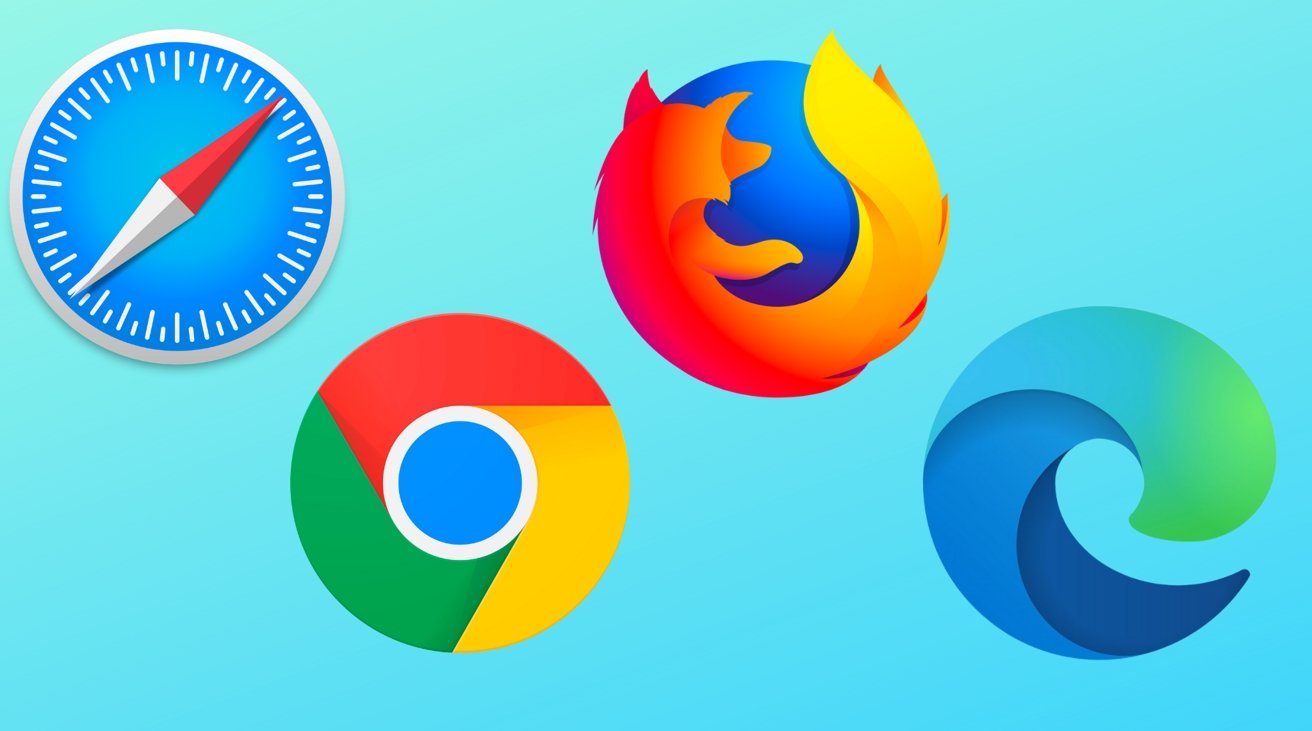
The truth is, the perfect browser doesn't exist. Each of the four most popular macOS browsers has its own set of strengths and weaknesses, just based on the engine that's used for web rendering, and what the developers of the big-four have prioritized.
While the best browser for the individual varies on use case, and which websites behave the best on any given browser, there are a series of benchmarking tools that can measure performance on synthetic tasks.
Browser benchmarks
We tested each browser on three different testing platforms: JetStream 2, Speedometer, and MotionMark.
JetStream 2 is a JavaScript-benchmark that scores browsers based on how quickly they can start and execute code, which translates to faster JavaScript performance. Since JavaScript is used on most web browsers, it's a good test of snappiness for code-intensive sites.
MotionMark is a graphical browser testing suite that measures the ability to render complex web pages. Think a page that has complicated graphics and animations. A higher score results in smoother transitions and animations.
Speedometer 2.0 determines the responsiveness of a browser when running web applications. Among the three, it's the truest option for testing real-world performance across many popular websites and online services. A good example is adding tasks to a to-do list in a web app.
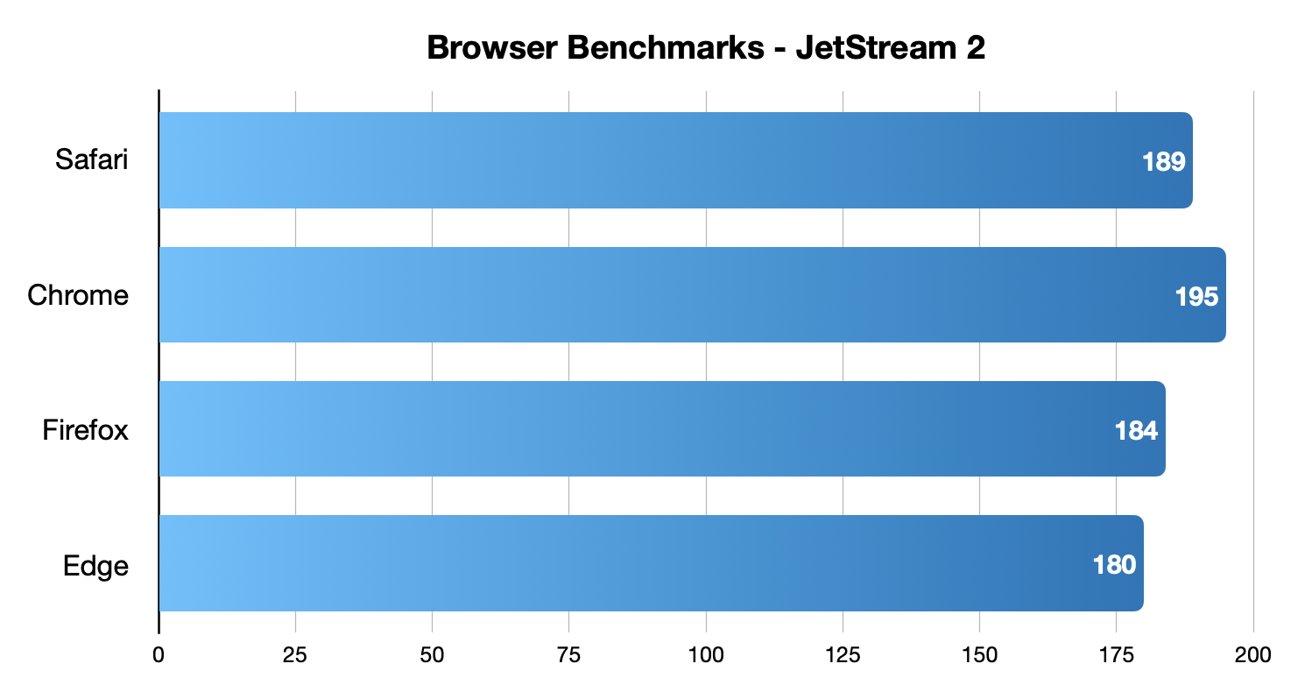
Chrome came out on top in JetStream 2 testing, while Safari took second place.
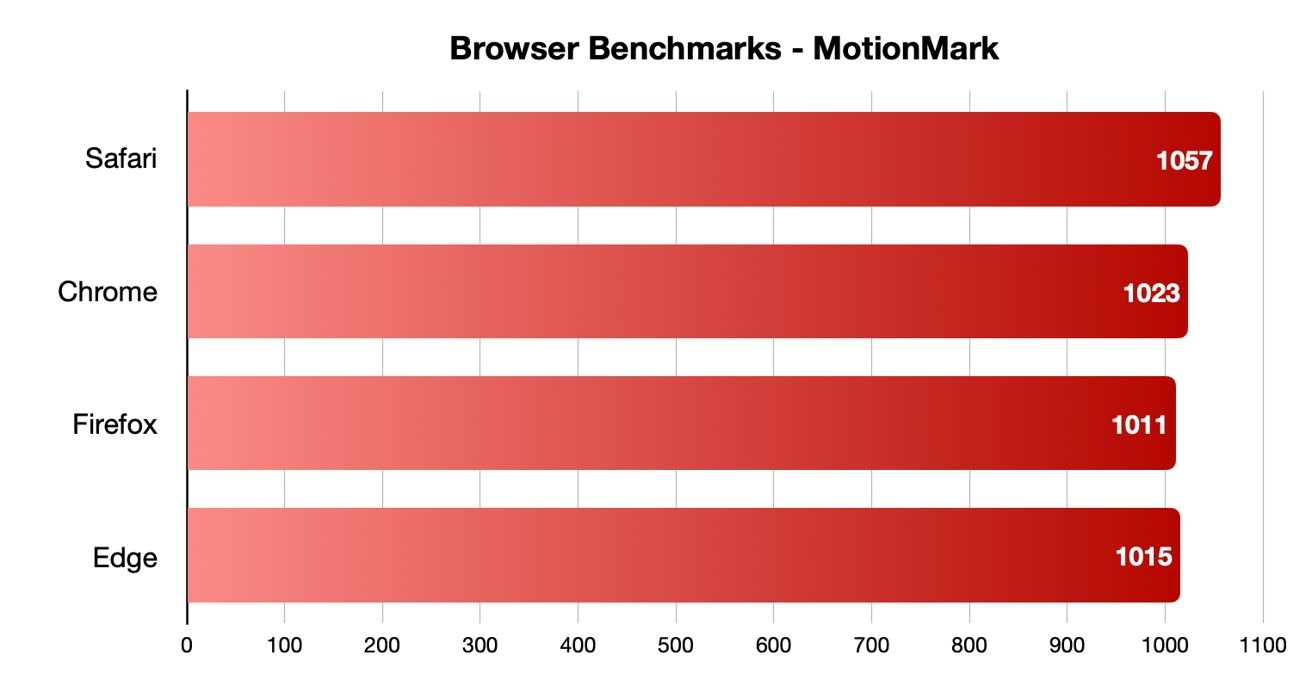
Safari was the fastest in MotionMark benchmark testing.
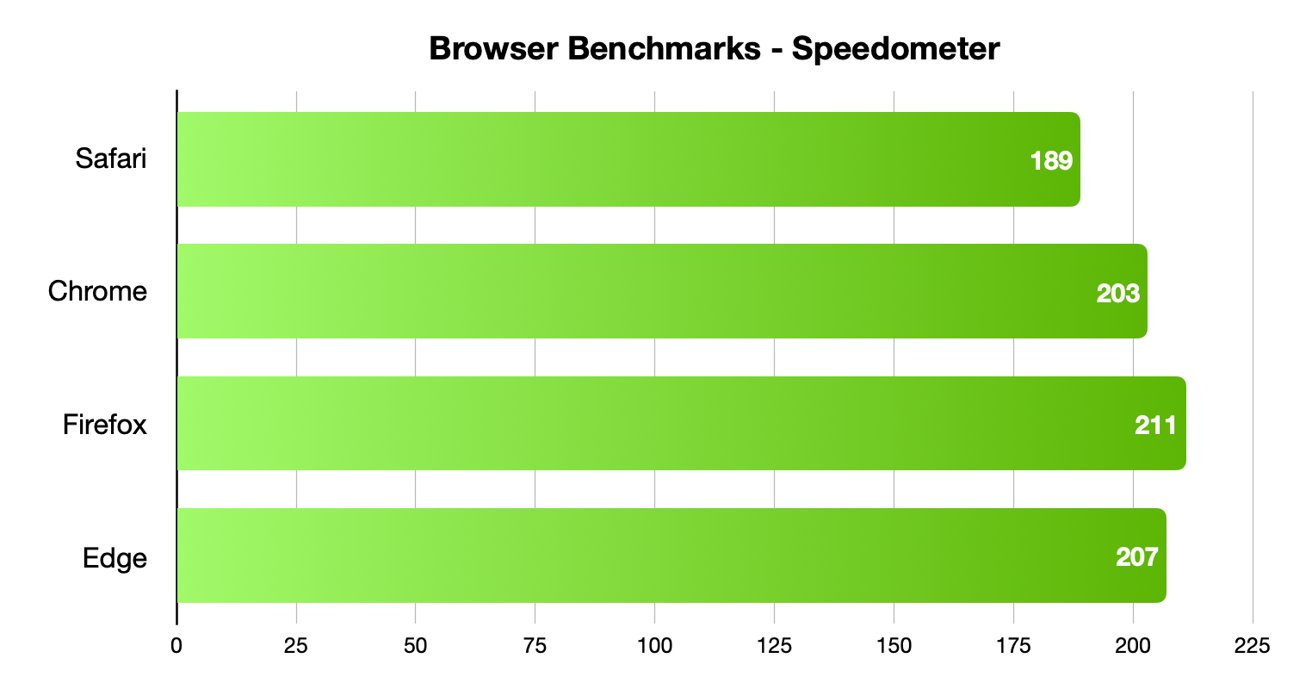
Speedometer testing showed off interesting results, with Firefox and Edge coming in first and second, and Safari in last place.
Different testing platforms result in different scores, so your own mileage may vary. Safari was the best for graphical performance, for example, but its responsiveness lagged behind others. Choose what specific metrics are most important to you.
For Mac users, Safari is an institution. It's the default browser on Apple platforms and is generally lightweight and efficient. As you'd expect for an Apple product, Safari also emphasizing privacy while you browser online.
From the very first boot on a new Mac, Safari is instantly available and configured for easy, private browsing. That makes it the best choice for the most non-technical among us, since you won't need to download and install anything. Safari "just works" out of the box.
It also features the tighest integration across Apple's other devices and systems. You can use Continuity to easy hand-off your browsing between your Mac and any iPhone or iPad you have around. If you need to buy something with Apple Pay , you can authenticate purchases with Face ID or Touch ID.
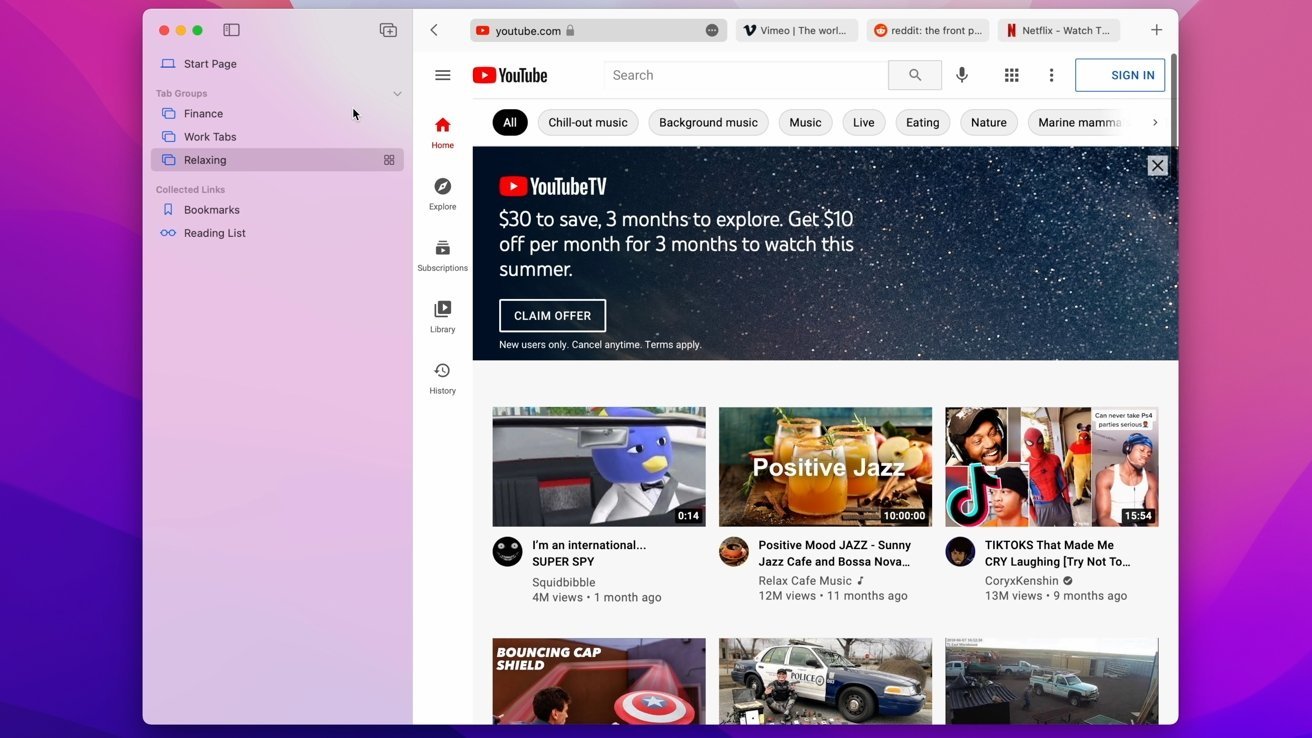
Safari also features some strong privacy protections, including mechanisms aimed at mitigating cross-site tracking and ad targeting. It features a built-in password manager that allows you to save and store passwords — with easy autofill options — across your Apple devices.
As an Apple-made product, Safari is the most convenient option on this list for Mac users — particularly those who own multiple Apple devices. It's also a good choice for the privacy conscious, though it isn't the fastest and it doesn't yet have a strong extension marketplace.
- Default Mac browser with effortless setup
- Strong privacy protections
- Integration with other Apple products
- Not the fastest or most responsive browser in some testing
- Lackluster support for add-ons and extensions
Google Chrome
Google Chrome is a massively popular browser, and a particular favorite of those who routinely use extensions to customize their web experience. It's the most-used web browser in the world, and it's faster and more RAM-efficient than it used to be. Chrome is even currently speedier than Safari on macOS.
The browser also has one of the world's most extensive list of add-ons, plug-ins, and extensions. From plugins focused on online privacy or to video content downloaders, there are around 190,000 extensions in total to choose from. You can also choose from a number of different themes and customization options.
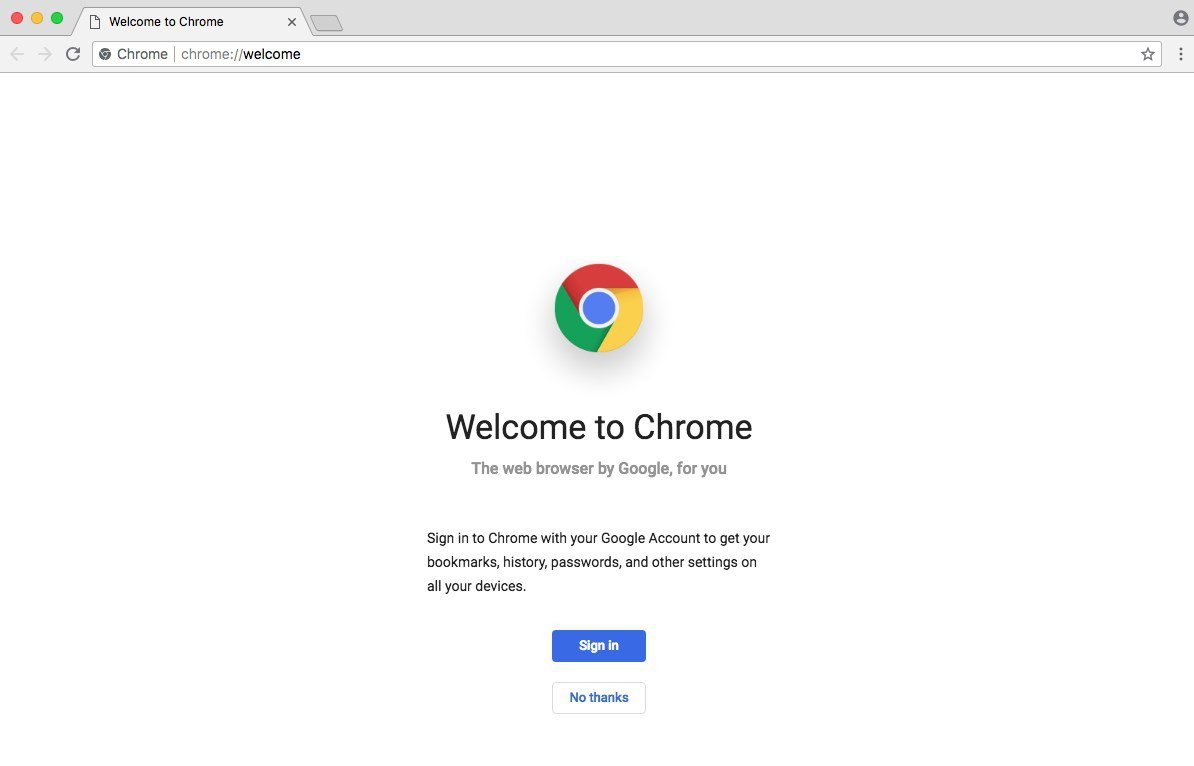
Intelligent Google-made features include automatic site translations and deep integration with the company's online tools and services — so it's great for those who rely on Gmail, Google Docs, or another Google service. Syncing between Google apps on different devices is also top-notch.
However, Google is a data company that relies on collecting information about its users. While the company has taken steps to bolster its privacy reputation, it's still a company that makes money on harvesting data. Those who are particularly privacy-conscious will probably want to look elsewhere.
It's hard to go wrong with the world's most popular web browser, particularly with its seamless workflow features and customization options. However, if you are even slightly concerned about online privacy, you may want to go with another option.
- Simple to learn, fastest option in some cases
- Syncs your Google account across other devices
- Extensive list of extensions and add-ons
- It's Google — so not that private
- Is a RAM and CPU hog
Mozilla Firefox is one of the only popular and mainstream browsers to have started life as an open source project. It's still a free and open source browser with a hefty focus on privacy and security, which could make it a good fit for those who want a Google Chrome alternative.
Because of its open source nature, users are free to explore Firefox's code — and they do. The browser doesn't have any hidden secrets or data-harvesters. It also features some excellent built-in privacy and security protections, including Enhanced Tracking Protection and an extensive list of customizable permissions.
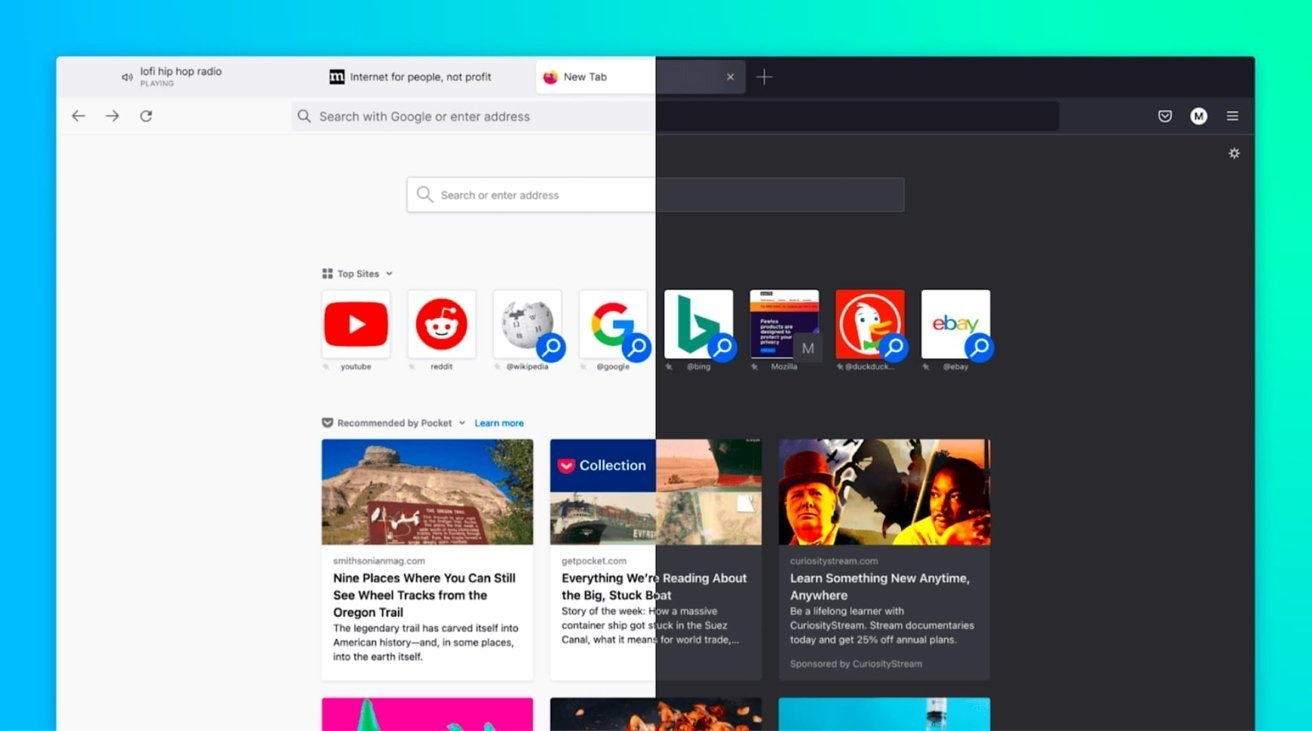
Firefox was also the first browser to actually offer third-party extensions and add-ons. Although it might not have as many extensions as Google Chrome, you'll still find a hefty list of options ranging from privacy add-ons to customizable themes for your browser.
Although Firefox has some cross-platform integration between its app and built-in Pocket support, it isn't as seamless as Chrome or Safari. If speed if your primary concern, it's also important to note that Firefox isn't the fastest browser by most metrics.
Users who want an open source browser or are committed to Mozilla's mission of keeping the internet open and free will find a browser after their own hearts here. For the average user, however, another browser on this list might be a better fit.
- Completely free and open source
- Extremely customizable with extensions, themes, etc.
- The best option for hardcore privacy
- Not the fastest or most RAM efficient
- Synchronicity isn't as robust
Microsoft Edge is the spiritual successor to Internet Explorer that was first released in 2015. Originally HTML-based, Microsoft overhauled the browser to be based on Chromium, which is the same underlying software used to make Google Chrome.
As such, Microsoft Edge is now much more competitive than it used to be. It's far from a Google Chrome clone, but you should expect a similar level of performance from it. Some users believe that Microsoft Edge even feels snappier than Chrome on a Mac.
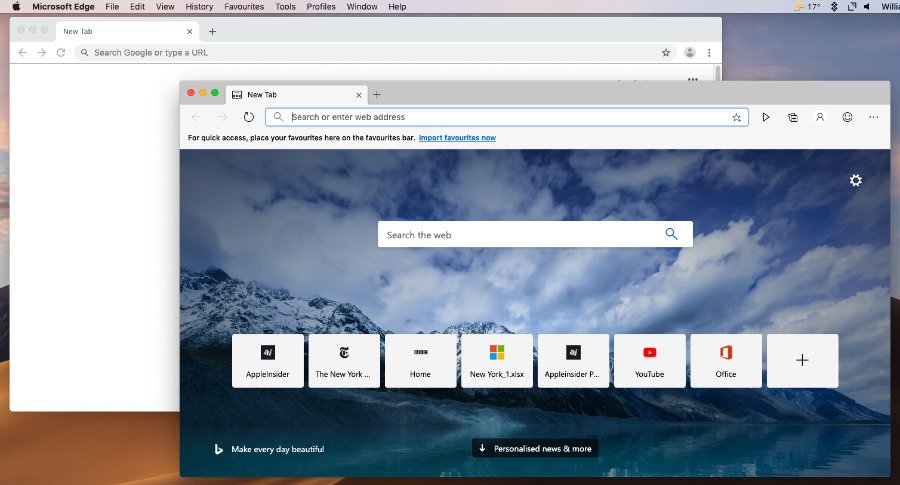
Because it's Chromium-based, Microsoft Edge also has a list of extensions similar to Chrome. It also sports a number of unique features, such as a "Collections" ability that lets you save information like text or webpages to a built-in notebook. There's also a vertical tab bar, a built-in read aloud feature, and an easy native screenshot tool.
It's a solid option for anyone that doesn't like Safari and wants an alternative to Google Chrome because of privacy reasons. If you use a Microsoft account like some use a Google account, then Edge might also be a solid option.
- Snappy, lower RAM and CPU usage
- Unique features like Read Aloud and Collections
- Good performance in most metrics
- Can be slower than Chrome in terms of pure performance
- Syncing isn't as strong as Safari or Chrome
The perfect browser doesn't exist, but you can pick and choose what you need
There's no clear answer for what the "best" browser on macOS is. However, some browsers are better suited to specific tasks than others.
When it comes to smooth JavaScript execution, Chrome is in the top spot with Safari a close second. Safari, according to the MotionMark testing, handles complex web pages better than any other browser.
Firefox, interestingly enough, may be the fastest when it comes to general everyday web apps.
Of course, there's also the issues of extension support, privacy, and synchronization across other devices. Many of the browsers are evenly matched on these metrics, but some excel in specific areas like privacy or cross-platform integration.
But, unlike on iOS, you aren't effectively stuck with one browser core technology. These four browsers, and several more, are available on macOS, and can be run in parallel.
While we don't recommend running all four unless you're a web developer or unit case tester, two or three different browsers can be run at-will, if any given browser doesn't handle your work case well.
Top Stories

Amazon drops Apple's M3 MacBook Air to record low $989

Retro gold rush: these emulators are coming to the App Store soon

The Worst of WWDC - Apple's biggest missteps on the way to success

Apple's generative AI may be the only one that was trained legally & ethically

Arizona TSMC facility continues to fight cultural battles, rising costs & logistical hurdles

New iPad Air & iPad Pro models are coming soon - what to expect
Featured deals.

Save up to $350 on every Apple M3 MacBook Pro, plus get up to $80 off AppleCare
Latest comparisons.

M3 15-inch MacBook Air vs M3 14-inch MacBook Pro — Ultimate buyer's guide

M3 MacBook Air vs M1 MacBook Air — Compared

M3 MacBook Air vs M2 MacBook Air — Compared
Latest news.

Apple said to have restarted discussion for OpenAI integration into iOS 18
A report suggests that Apple is still looking across the spectrum of AI providers for iOS 18, with OpenAi again in conversations with the iPhone maker.

Apple is allowing emulators to be submitted to the App Store. Here's what's on the way so you can play your favorite retro games on your iPhone.

How to connect to FTP servers in macOS using modern apps
File Transfer Protocol is an older networking protocol for transferring files to network servers. Here's how to use it on your Mac.

Apple finally pulls generative AI nude apps from the App Store
Apple has removed apps from the App Store that claimed to make nonconsensual nude imagery, a move that demonstrates Apple is now more willing to tackle the hazardous app category.

ByteDance would rather shut down US TikTok than sell it
TikTok owner ByteDance reportedly will not sell to a US firm if it is unable to convince a court to overturn President Biden's day-old law forcing a sale or ban.

Apple's recently released M3 MacBook Air has dropped to an all-time low of $989 at Amazon while supplies last.

Unistellar Odyssey Pro review: Unlock pro-level astronomy with your iPhone from your backyard
Unistellar's Odyssey Pro smart telescope delivers amazing results even from a light-polluted backyard — and we have the photographic evidence to prove it.

iPad Air screens, Spotify complaints, and a TikTok ban on the AppleInsider Podcast
On this week's episode of the AppleInsider Podcast, the US is looking out for its companies, the EU is looking out for Spotify, and Korea wants to help Samsung. And, we've got new iPads to look forward to, plus FineWoven cases to collect while we still can.

Patrick Wardle teams up with ex-Apple researcher to boost Mac security for all
Two long-standing Mac security experts have formed DoubleYou, a firm that aims to develop security tools that other Mac developers can incorporate into their systems.
As copyright concerns plague the field of generative AI, Apple seeks to preserve privacy and legality through innovative training methods for language learning methods, all while avoiding controversy.
Latest Videos

All of the specs of the iPhone SE 4 may have just been leaked

When to expect every Mac to get the AI-based M4 processor
Latest reviews.

Ugreen DXP8800 Plus network attached storage review: Good hardware, beta software

Espresso 17 Pro review: Magnetic & modular portable Mac monitor

{{ title }}
{{ summary }}
Firefox is no longer supported on Windows 8.1 and below.
Please download Firefox ESR (Extended Support Release) to use Firefox.
Download Firefox ESR 64-bit
Download Firefox ESR 32-bit
Firefox is no longer supported on macOS 10.14 and below.
Firefox Browser
Get the browser that protects what’s important.
No shady privacy policies or back doors for advertisers. Just a lightning fast browser that doesn’t sell you out.
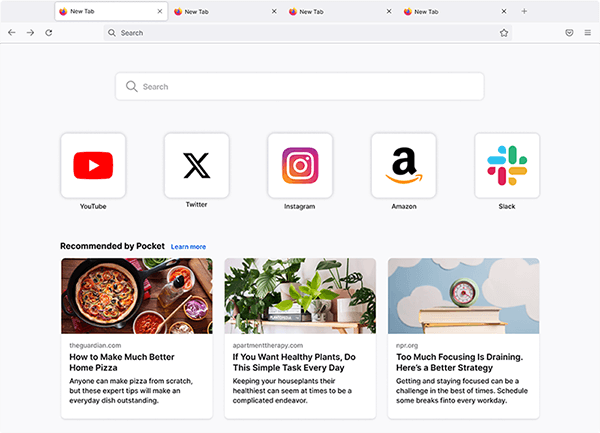
Latest Firefox features

Pick up where you left off
Firefox View lets you see your tabs open on other devices and recent history.

Edit your PDFs directly
Forget printing a PDF ever again. Start editing forms in Firefox directly.
Browse knowing you’re protected
Firefox’s Total cookie protection gives you outstanding privacy by default.
See Release Notes
Do what you do online. Firefox Browser isn’t watching.
We block the ad trackers. you explore the internet faster..
Ads are distracting and make web pages load slower while their trackers watch every move you make online. The Firefox Browser blocks most trackers automatically, so there’s no need to dig into your security settings.

Firefox is for everyone
Available in over 90 languages, and compatible with Windows, Mac and Linux machines, Firefox works no matter what you’re using or where you are. Make sure your operating system is up to date for the best experience.
Review system requirements

Put Firefox on all your devices
Take your privacy with you everywhere. Firefox Browsers for iOS and Android have the same strong privacy settings to block trackers from following you around the web, no matter where you are.
Do it all with Firefox
Search smarter, faster
- Search from address bar
- Search engine options
- Smart search suggestions
- Bookmark, history and open tab in results
Boost your productivity
Works with google products.
- Built-in screenshot tool
- Bookmarks manager
- Autosuggest URLs
- Sync across devices
- Reader mode
- Spell check
- Pinned Tabs
Stream, share and play
- Block Autoplay of video & audio
Picture-in-Picture
- Curated content on new tab
- Share links
Protect your privacy
- Third Party Cookie Blocking
- Fingerprinter Blocking
- Cryptominer Blocking
- Private Browsing mode
- Individual protections report
Secure your personal info
- Breached website alerts
- Built-in password manager
- Clear history
- Form autofill
- Automatic updates
Customize your browser
- Library of extensions
- Adjust search bar settings
- Change new tab layout
Make Firefox your own
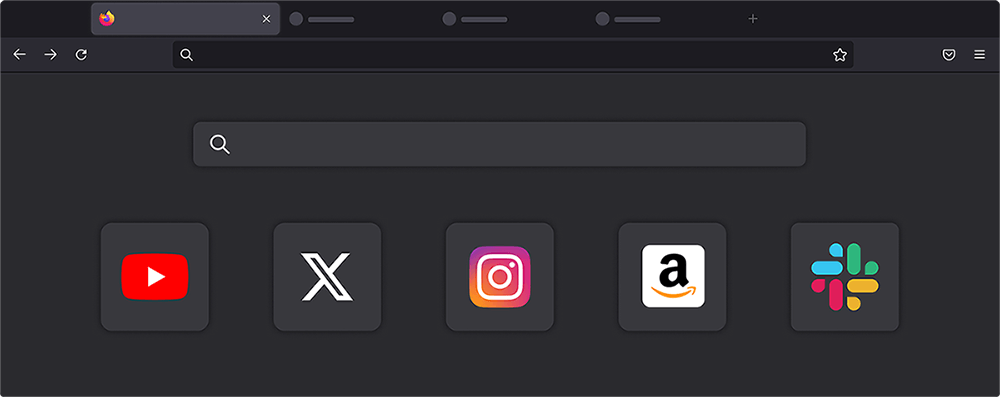
Extensions for every interest
From security to news to gaming, there’s an extension for everyone . Add as many as you want until your browser is just right.
Change up your look
Go from light mode to dark mode depending on your mood or preference, or liven things up with a custom theme (rainbow unicorn, perhaps).
Tweak your settings
There’s no need to settle. Change up the new tab page, search bar, bookmarks and more to explore the internet the way you want.
Backed by the non-profit that puts people first

Challenging the status quo since 1998
Firefox was created by Mozilla as a faster, more private alternative to browsers like Internet Explorer, and now Chrome. Today, our mission-driven company and volunteer community continue to put your privacy above all else.

Your privacy comes first
As the internet grows and changes, Firefox continues to focus on your right to privacy — we call it the Personal Data Promise : Take less. Keep it safe. No secrets. Your data, your web activity, your life online is protected with Firefox.
Keep all your favorite browser features — and discover new ones.

All your favorite Google tools (like Gmail and Docs) work seamlessly in the Firefox Browser.

Facebook Container
Download this browser extension to stop Facebook (and Instagram) from tracking you around the web.

Sync your devices
Firefox is available on all your devices; take your tabs, history and bookmarks with you. All you need is a Mozilla account and you’ll get access to syncing and more Mozilla products.

Screenshots
Grab a high-resolution image of anything online with our screenshot tool built right in the browser

Enhanced Tracking Protection (ETP)
Firefox automatically blocks many third party trackers from collecting and selling your web activity.

From watching a web tutorial to keeping an eye on your favorite team, your video follows you while you multitask.
We review products independently , but we may earn affiliate commissions from buying links on this page. Terms of use .
Chrome, Edge, Firefox, Opera, or Safari: Which Browser Is Best?
You probably take your web browser for granted, but you have real options: performance, feature sets, and privacy tools vary wildly among internet-surfing apps..

The browser battle has been raging almost as long as the internet has existed. But with new competitors in the fray and longtime entries revving up new technologies, the stakes have never been higher.
In the late nineties and early aughts, it was Microsoft’s Internet Explorer versus Netscape Navigator. Fast forward 20 years, and IE’s proprietary technologies for enabling interactive, application-like websites have given way to W3C standards-based features for delivering the online experience.
Meanwhile, the browser landscape has a new dominant force: G oogle, the search and web advertising behemoth that delivers the most content of any source on the internet (according to comScore ), also claims nearly 70 percent of the browser market with Chrome (based on both NetMarketShare and StatCounter numbers). That’s for desktop use; if you add in mobile, Chrome is still king at over 60 percent.
Chrome may be leading in usage (except, of course, on Apple devices), but it’s not ahead by every measure or by number of capabilities. Firefox, Edge, Safari, and Opera all have features not found in Google's browser. That’s not to say that Chrome isn't an excellent piece of software, but you should know there are worthy alternatives. This article examines the top five browsers in the U.S. in order of popularity. Unfortunately, that rules out Brave and Vivaldi —both first-class and unique choices—but you can read about them in my article covering the best alternative web browsers .
So what’s important in a browser these days? Speed and compatibility remain the top requirements. But in this day of the ever-present smartphone, the linkage between your desktop browser and your phone has become increasingly important. Indeed, some browsers now let you send a webpage from one device to another, and all let you sync bookmarks between them.
A rough measure of standards compatibility is the HTML5test website, which scores browsers’ compatibility with the moving target of web standards. The maximum possible score is 555, with points awarded for each standard supported. The new Chromium-based Microsoft Edge has taken over the lead from Chrome on this test with a score of 535 compared with Chrome's 528. The difference? Support for Dolby Digital and screenshots. Opera and other Chromium-based browsers hew closely to Chrome, while Firefox gets 491, and Safari 471. Just a few years ago, a score in the 300s was considered excellent, and Internet Explorer (still used by millions) is stuck at 312.

For speed testing, I ran each browser through the WebXPRT 3 benchmark, which tests the speed of internet applications such as photo enhancement, stock option pricing, encryption, and text manipulation. I tested on my Asus Z240IC 4K touch-screen all-in-one PC with a 2.8GHz Core i7-6700T processor running Windows 10. For Safari I used a 3.1GHz Core i7-4770S iMac (I realize the hardware is not completely comparable, but it’s sufficient for a rough comparison). Take benchmark results with a grain of salt, however, since purely synthetic tests don’t measure every component of actual browsing conditions.
In terms of disk space usage, on my Windows test system (after a cache clear) Edge took 319MB, Firefox 187MB, Opera 191MB, and Chrome 437MB. Since Chrome and Opera don’t report their storage use in the Settings / Apps & Features page, I used the size of their folders. I noticed that Chrome installs itself in the Programs (x86) folder, which is normally only for 32-bit apps; nevertheless, typing chrome://version/ in the address bar showed I was testing with the 64-bit version.
Privacy, customization, convenience features, tab and start-page tools, and mobile integration have replaced speed and standards support as today's primary differentiators. All browsers now can remember passwords for you and sync them (in encrypted form) as well as your browsing history and bookmarks between desktops or laptops and mobile devices. Chrome by default signs you into Google services like Gmail and YouTube, which some consider presumptuous .
Privacy mavens like to use VPNs (virtual private networks) to hide browsing activities from ISPs and any other intervening entities between you and the site you’re visiting. Opera is the only browser that includes a built-in VPN. Firefox also has a good privacy story, with a private mode that not only discards a session’s history and cookies but also hides your activities from third-party tracking sites during the private session. In addition, Firefox and Safari include fingerprint protection—preventing trackers from identifying you based on your hardware and software setup. Firefox also has built-in Content Blocking to fend off known trackers and cryptocurrency-mining ploys.
Useful browsing tools can play a part in your decision, too. One, Reading Mode, strips webpages of clutter—mostly ads, videos, and content pitches—so you can focus on text. Another is the Share Button. With this era’s obsession with social media, it’s nearly an essential convenience.
Opera is alone among the popular web browsers included here with a built-in cryptocurrency wallet, though the aforementioned Brave browser also includes one. Opera is also notable for its Speed Dial, which consists of pinned tiles on your home screen (though the other browsers have similar functionality) and a toolbar for accessing frequently needed services such as WhatsApp.
Microsoft Edge offers voice-reading of webpages with remarkably realistic speech, a helpfully customizable homepage, detailed privacy settings, and (soon) a Collections feature for web research. Firefox lets you instantly save a page to Pocket or open a new Container in case you want to be logged into the same site with two different identities. Screenshot tools are making their way into browsers, with Edge, Firefox, and Opera for starters.
If you feel strongly about one browser or another, as is likely the case if you’re reading this, please feel free to let us know about it in our social channels.
Google Chrome

Most web users need no introduction to the search behemoth's browser, Google Chrome. It’s attractively designed and quick at loading pages. At this point most every website’s code targets it, so compatibility is usually not an issue. That said, every browser is occasionally flummoxed by a particular site or two, and sometimes a browser update breaks even well-crafted sites.
As mentioned earlier, Chrome gets top marks on the HTML5Test website. It also does reasonably well on the WebXPRT 3 benchmark, which tests the speed of internet applications like photo enhancement, stock option pricing, encryption, and text manipulation. It uses more RAM than other Windows browsers, but some of that is for speeding up operation by preloading content. It also creates far more program processes than the others, to ensure stability by isolating not only tabs, but also plug-ins and frames from other domains on the page.
Google is constantly working on security and feature enhancements, but as with all software, bugs happen, so make sure you stay updated . Another benefit of using Chrome is that you won’t have to dismiss those messages urging you to switch to Chrome every time you visit Google News, Gmail, YouTube, and so on.
Chrome can no longer boast any unique browsing features: There’s no built-in VPN, no fancy tab organization tools, no cryptocurrency locker, no Reading Mode, no share button, and no screenshot tool. That’s just fine for most web consumers, apparently. The Android version of Chrome has been getting more love from Google lately, with tab groups and dark mode.
Google has lately made two seemingly contradictory announcements, both concerning privacy. In May, it announced that it would be removing the API function that allowed ad-blocker software to fully block ads. Then in August it announced a set of open standards intended to enhance privacy on the web, called Privacy Sandbox. It’s just in the planning stage at present, and it tries to cater to both ad targeting and user privacy .
There are loads of features in Chrome that are only available to web geeks who can tinker in the about:flags settings. Examples include the recently announced password leak detection, a distilled page view, and forced dark mode for websites.
The Chrome mobile browser is very capable, and offers syncing of bookmarks, passwords, and settings. Like the desktop browser, it includes voice input when using Google search. The mobile browser also suggests content that may be of interest to you based on your browsing.
Mozilla Firefox

Firefox, an open source project from the nonprofit Mozilla Foundation, has long been a PCMag favorite. The browser has pioneered many web capabilities and the organization that develops it has been a strong advocate for online privacy. It’s also notable for its wealth of available extensions. Pocket , the synchronizable site-saving service, is built in, and the unique Multi-Account Containers extension lets you sequester multiple logins to the same site on different tabs—without this, you'd have to open a private browsing window or another browser to sign out of all your web accounts and start a fresh session.
Mozilla’s browser is in the vanguard of supporting new HTML5 and CSS capabilities, and the company is working on open-source AR and speech synthesis standards. The organization now offers a full password management service called Lockwise, which can generate complex passwords, sync them between devices, and secure everything under a strong master password.
The mobile Firefox apps offer excellent interfaces, and you can send a webpage tab from any device to any others that are logged into your syncing account. That’s right: You can be reading a webpage on your desktop PC, and have it instantly open on your iPhone or vice versa—a slick and useful feature.
If that’s not enough, Firefox has a Pocket button in the address bar, letting you save a page for later viewing anywhere with one click. The Reader View button de-clutters a webpage loaded with ads, promos, and videos, so you can peruse it with no distractions. Finally, the browser is ultra-customizable, letting you select and arrange buttons on the toolbar to taste.
Apple Safari

The default Mac and iOS browser is a strong choice, though its interface has some nonstandard elements on both desktop and mobile. Safari was a forerunner in a few areas of browser capability: For example, it was the first with a Reading mode, which cleared unnecessary clutter like ads and video from web articles you want to read. That feature debuted in 2010 and has made its way into all other browsers except for Chrome.
More recently, with macOS Catalina and iOS 13, Safari adds fingerprinting protection—preventing web trackers from identifying you by your system specs. The new version also gets Apple Pay support and a Sign in with Apple feature to replace Facebook and Google as web account authorizers.
If you use an iPhone and a Mac, Safari integration makes a lot of sense, since Apple’s Handoff feature lets you continue your browsing session between devices.
Safari has trailed other browsers on support for emerging HTML5 features, but I haven’t run into or heard of any major site incompatibilities with it. It performed faster than the other browsers here on the WebXPRT 3 benchmark, even though I was using an iMac with a Core i7 CPU a generation earlier than that of my Windows machine.

Microsoft Edge

There’s a new Edge in town. The Microsoft developers in charge of Windows’ default web browser got tired of chasing compatibility issues resulting from site developers’ only targeting Chrome for compatibility. So, they decided to switch to using Chrome’s webpage-rendering code, Chromium, in the Edge browser software. That freed them up to add unique features instead of putting out compatibility fires. Notably, Edge now runs on Apple macOS and earlier Windows versions, in addition to Windows 10.
The compatibility is certainly now there in spades: For the first time since I’ve been reviewing browsers, another browser edges out Chrome on the HTML5Test measure of supported web standards. See the intro and table above for the actual scores. What pushes Edge over is support for Dolby Digital, ObjectRTC, and the Screen Capture API. In general, however, you won’t run into the kind of site incompatibilities that the previous Edge incarnation occasionally encountered. Amusingly enough, Google still prompts you to download Chrome on its websites, even though there’s no difference in compatibility or performance when using Edge on those. If you’re a Netflix watcher, Edge is the only web browser that lets you view shows in 4K, and also the only Windows browser that supports Dolby Digital audio (Safari supports it, too).
But compatibility isn’t the only benefit of the new Edge: As you can see in the table above, it’s also a leader in performance as well as thrifty memory and disk usage.
What new features has the Edge team been working on, you ask? The initial focuses have been privacy, the customizable start page, and the intriguing Collections feature for web research. For enterprise customers who still rely on Internet Explorer to run legacy programs (and I still run into these at places like insurance and doctors’ offices), Edge offers an IE Mode, but this won’t be available in standard consumer setups.
Another new feature worth highlighting is Immersive Reader mode. Not only does this offer distraction-free web article reading, stripping out ads and nonessential eye candy (or eye poison , more aptly), but It can also read webpage text aloud using lifelike Neural Voices. This is really something to try: It reads with sentence intonation, rather than simply word-by-word, as we’ve come to expect text-to-speech audio.
The Collections feature presents a sidebar onto which you can drag webpages and images, write notes, and then share the whole assemblage to Excel or Word. This feature hasn't appeared in the released version, but works well in the beta and Microsoft says it's coming soon.
Maybe you don’t want a colorful corporate logo burning itself into your consciousness every time you open your browser? Edge offers four Home page options: Focused, Inspirational, Informational, and Custom. Focused is a blank page with search and buttons for your most-visited sites; Inspirational adds the gorgeous Bing photos that change daily as backgrounds; to all this, Informational adds customized news, weather, sports, and finance cards.
The browser offers three preset privacy levels: Basic, Balanced, and Strict. As you move from the first to the last, you increase privacy but possibly disable site features. The private browsing mode, like that in all browsers, doesn’t save any history from a private session.
Mobile versions for Android and iOS with syncing smooths moving from desktop to mobile, and I find that password management works more reliably than in most other browsers, though it’s still a good idea to use a separate password management utility such as LastPass.
For a more in-depth look, read my hands-on preview of Microsoft’s Edge web browser .

Perennially hovering around the 2 percent usage level, the Opera browser has long been a pioneer in the segment, bringing us innovations as basic as tabs, CSS, and the built-in search box. Some people got scared of Opera when its parent company was bought by a Chinese investment coalition, but the firm is now publicly traded on NASDAQ, so the move was clearly just an investment and not some scheme to send data to Beijing.
In fact, Opera can make a bigger privacy claim than any other browser—if you’re a believer in VPNs , since it includes a built-in VPN that works well and quickly. Some consider Opera’s VPN to actually be an encrypted proxy server, but the only real difference between it and a standard VPN is that it only protects and reroutes traffic from Opera itself, rather than from any internet-connected app on the computer or smartphone.
Opera uses the Chromium page-rendering engine, so you'll rarely run into site incompatibilities, and performance is fast. Opera also takes up far less drive space and memory than Chrome—hundreds of megabytes less in my testing with 10 media-rich websites loaded.
Beyond the VPN, another unique feature in Opera is its built-in ad blocker, which also blocks crypto-mining scripts and trackers. Note that Opera added crypto-mining protection more than a year before Firefox did. (Google is still mulling adding similar protection to Chrome.) Ad blocking also means less data consumed, especially of interest for those using metered connections or mobile plans with data caps.
More unique features in Opera include its Speed Dial start and new-tab page, its quick-access sidebar of frequently needed services like WhatsApp, and its cryptocurrency wallet, which supports Bitcoin and Tron.
On mobile, Opera Touch is a beautifully designed app that connects (via quick QR scan) to your desktop. My Flow is the result of this connection, letting you send webpages and notes between devices easily.
Alternative Web Browsers

More Inside PCMag.com
- Feds Investigate Tesla's Autopilot Safety Fix, Citing Crash Concerns
- Meet Thermonator, a Flame-Throwing Robodog That Can Light Fires, Melt Snow
- E3 Is Dead, But Tickets for IGN Live Are Now on Sale
- 12 Top Picks to Ace Your Spring Cleaning
About Michael Muchmore
PC hardware is nice, but it’s not much use without innovative software. I’ve been reviewing software for PCMag since 2008, and I still get a kick out of seeing what's new in video and photo editing software, and how operating systems change over time. I was privileged to byline the cover story of the last print issue of PC Magazine , the Windows 7 review, and I’ve witnessed every Microsoft win and misstep up to the latest Windows 11.
More From Michael Muchmore
- Adobe Photoshop
- CyberLink PowerDirector 365
- The 10 Worst Things About Windows 11
- Apple iMovie
- Apple Watch
- Accessories
- Digital Magazine – Subscribe
- Digital Magazine – Info
- Smart Answers
- New iPad Air
- iPad mini 7
- Next Mac Pro
- Best Mac antivirus
- Best Mac VPN
When you purchase through links in our articles, we may earn a small commission. This doesn't affect our editorial independence .
Best web browser for Mac

We spend a lot of our time on browsers. Whether it’s using communcations apps to talk with friends, family or colleagues, searching for things online, streaming entertainment, using services for work or doing a bit of shopping. So, it makes sense that you’d want to use a browser that can make this experience as good as it can be. Many people stick with Safari on their Mac, as it’s already there and works well. But, if you’re willing to look beyond Apple’s favoured child, then there are plenty of interesting alternatives available. With this in mind, we round up the best alternatives to Safari and see what they have to offer.
If you want to increase the privacy and security on your browser then you should also read Best VPN for Mac and How to use a VPN on your Mac .
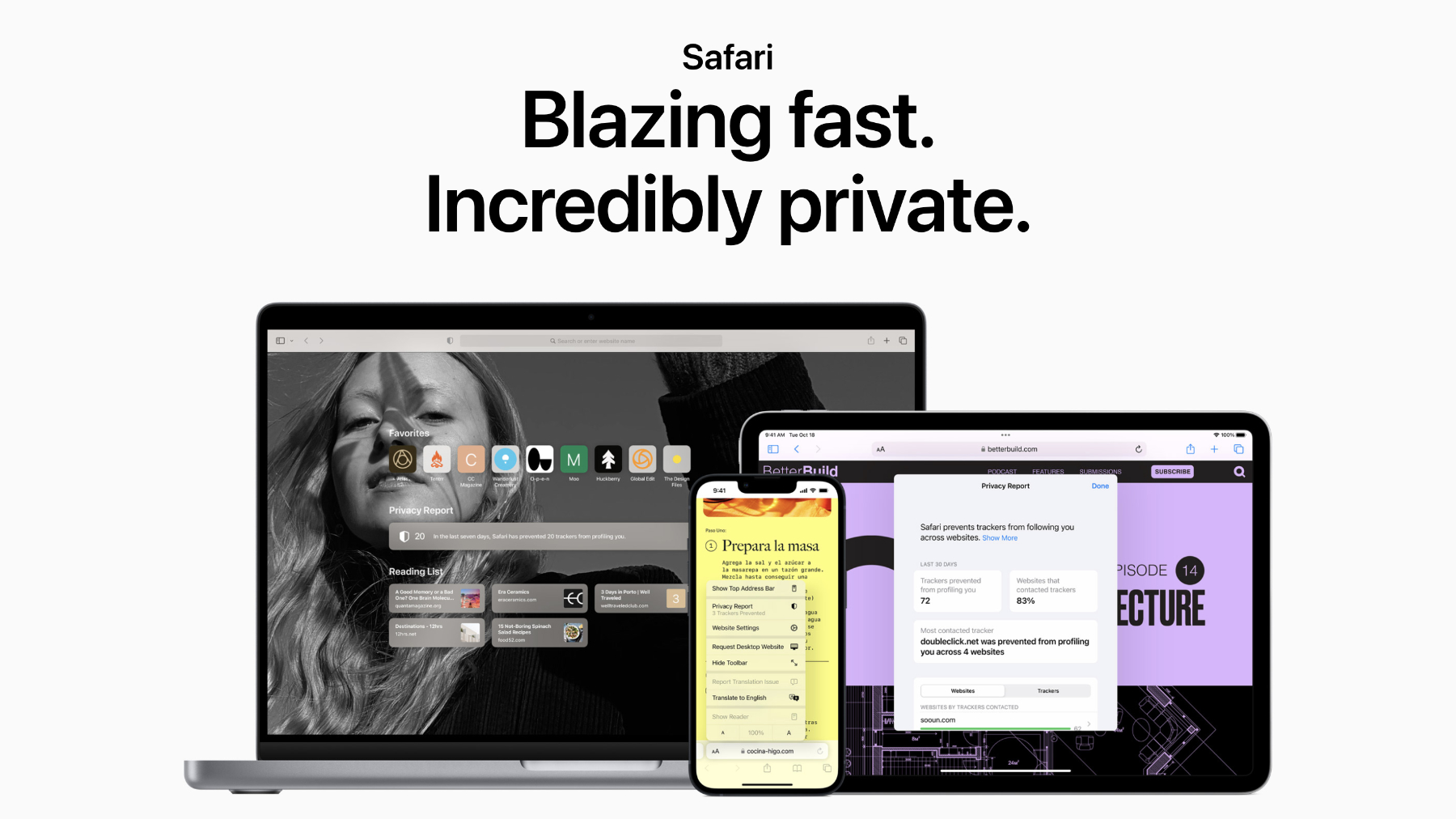
- Built-in to every Mac
- Syncs very well with other Apple devices
- Good performance
- Less extensions that Chrome-based rivals
- Doesn't play well with non-Apple devices
Apple’s Safari browser has been around for a long time, and over the years it’s been improved to the point where it’s now a very solid choice for most people. As you’d expect, it boasts the standard features found on most modern browsers, including bookmarks, tabbed browsing, a password manager, private browsing options, a dark mode, read later list, plus a Shared with You section on the Home page that lists links you’ve been sent in Messages.
The reading mode is still one of Safari’s hidden gems, as it turns any webpage into a clean, clear article devoid of ads, links, and other distractions. There’s also now the Quick Note feature which, as the name suggests, allows you to instantly grab text or images from a webpage and have them appear (complete with links) in the Notes app.
With macOS Monterey, Apple introduced Tab Groups, a feature that gained even more capabilities in Ventura. It is a handy feature that allows you to collect particular tabs together by a category of your choosing, so you don’t have to search for them among your other open tabs. This is useful if you’re planning a holiday, event or researching another interest. Best of all, the Group Tabs sync to Safari on your iPhone, iPad or other Macs. Apple built on this in macOS Ventura by making these Tab Group shareable, so you can send them to friends, colleagues or family who can instantly see all the pages and links – perfect if you’re all collaborating on a project. You can also pin tabs within these groups and give them customised start pages too.
Privacy is an important part of Apple’s offering, with Intelligent Tracking Protection there to stop advertisers from watching what you do. This is accompanied by anti-fingerprinting settings that prevent sites from looking at your hardware and software configuration to work out who you are online, plus security features that block sites that could contain malware.
The newest weapon in this armoury is PassKeys. This is an encrypted login that seeks to eventually do away with passwords althogether. It’s a little fiddly to set up initially, but after that it’s very easy to use. You can check out more details in our how to use PassKeys guide.
There’s also full integration for Apple Pay, making it easy to buy items online either through the Touch ID sensor in Macs with Touch Bars or via your iPhone. See our How to use Apple Pay on a Mac for more details.
In its current form Safari is better than ever, and that’s before you start exploring the available extensions that can increase its capabilities even further. The truth is, the best browser for your Mac is probably already installed.
Google Chrome
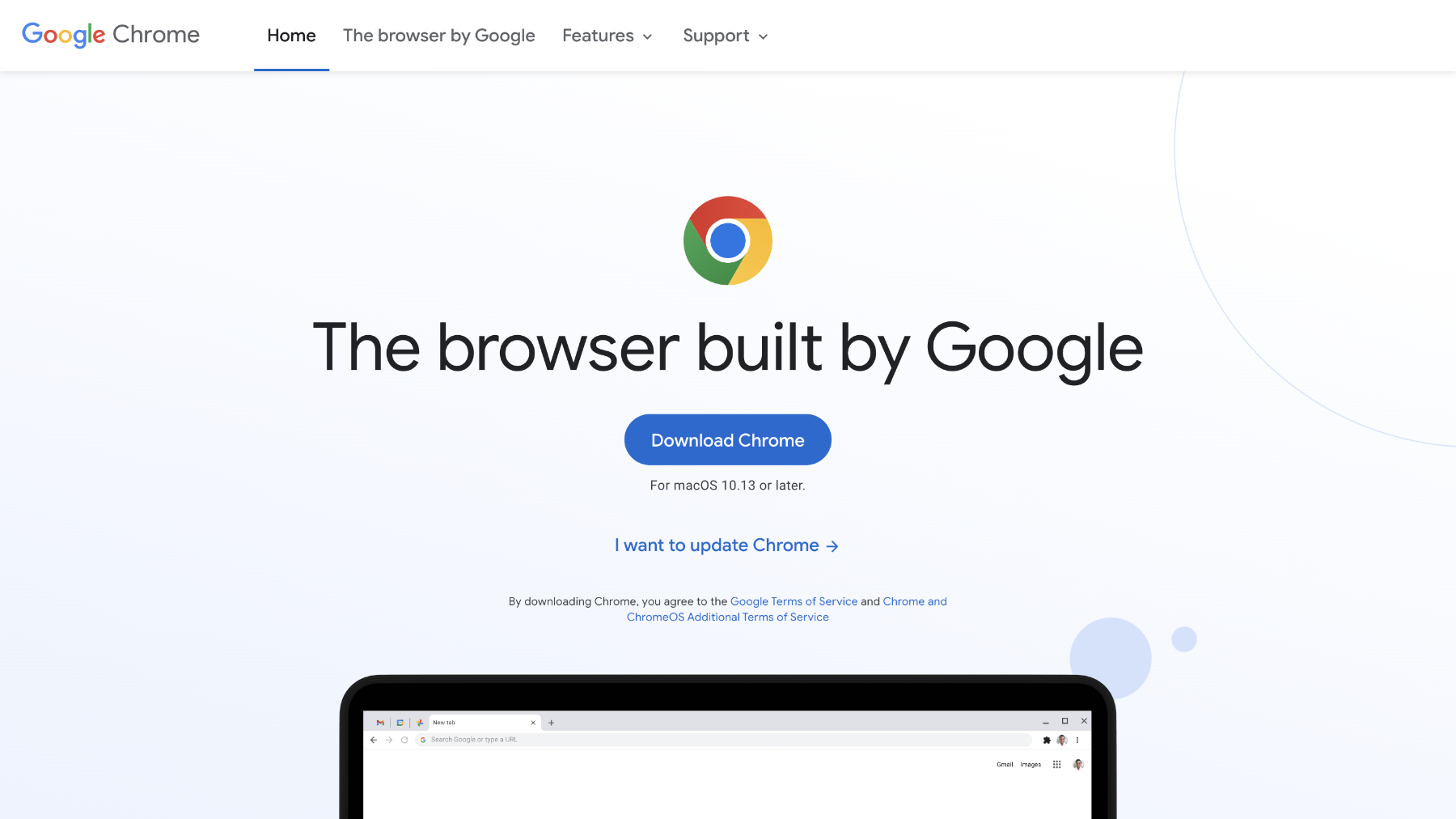
- Huge selection of extensions
- Cross-platform
- Loads of features
- Traditionally a memory-hog
- Requires Google account
Google’s Chrome remains the world’s most popular desktop browser by quite a margin, although that does encompass Windows users too. This success isn’t hard to fathom, as Chrome is an excellent tool which has an entire ecosystem of plug-ins and extensions, ranging from privacy monitors to ones that fix your grammar.
Multiple tabs are handled very well, although it can lead to RAM being hogged by Chrome if you like to leave a huge amount open at the same time, but this is often true of most browsers. Google has recently addressed this though, allowing users to now set memory and energy use filters that should improve performance.
In use, it’s fast. Pages are rendered quickly and there’s a global setting for the zoom, which can be handy if you find text a bit small on modern sites.
As you’d expect, being a part of the same family, Chrome dovetails effortlessly with Google’s online apps – Drive, Docs, Calendar, Photos, Translate etc – allowing users to launch them from an app tray in the menu bar. You can also utilise the extensions available to create reminders directly from the browser thanks to the likes of Google Keep. A new feature we’ve found very helpful is a quick price comparison guide that’s built right into the browser. Great way to save money when shopping.
The extensions are the things that differentiate Chrome from other browsers, with a bewildering 150,000+ to choose from. You can use password managers like Dashlane , discount coupon checker Honey , Grammarly to improve your writing, and so much more. To see our pick of the crop read Best Chrome extensions . As with Safari, there’s also a group tabs feature in Chrome that can keep your window tidy and make it easy to quickly find related webpages among your open tabs.
Password storage is secure, and you can keep your payment details in Chrome so that it’s easy to make payments online, albeit not through Apple Pay.
Google uses high-levels of security to ensure you don’t access sites that contain malware and also isolates each tab to prevent any kind of cross infection should you stumble into something nasty.
Of course, this is Google we’re talking about, so you’ll be giving your data directly to the company as you use Chrome, including your online habits, so just be sure you’re ok with that before you begin.
Edge Chromium
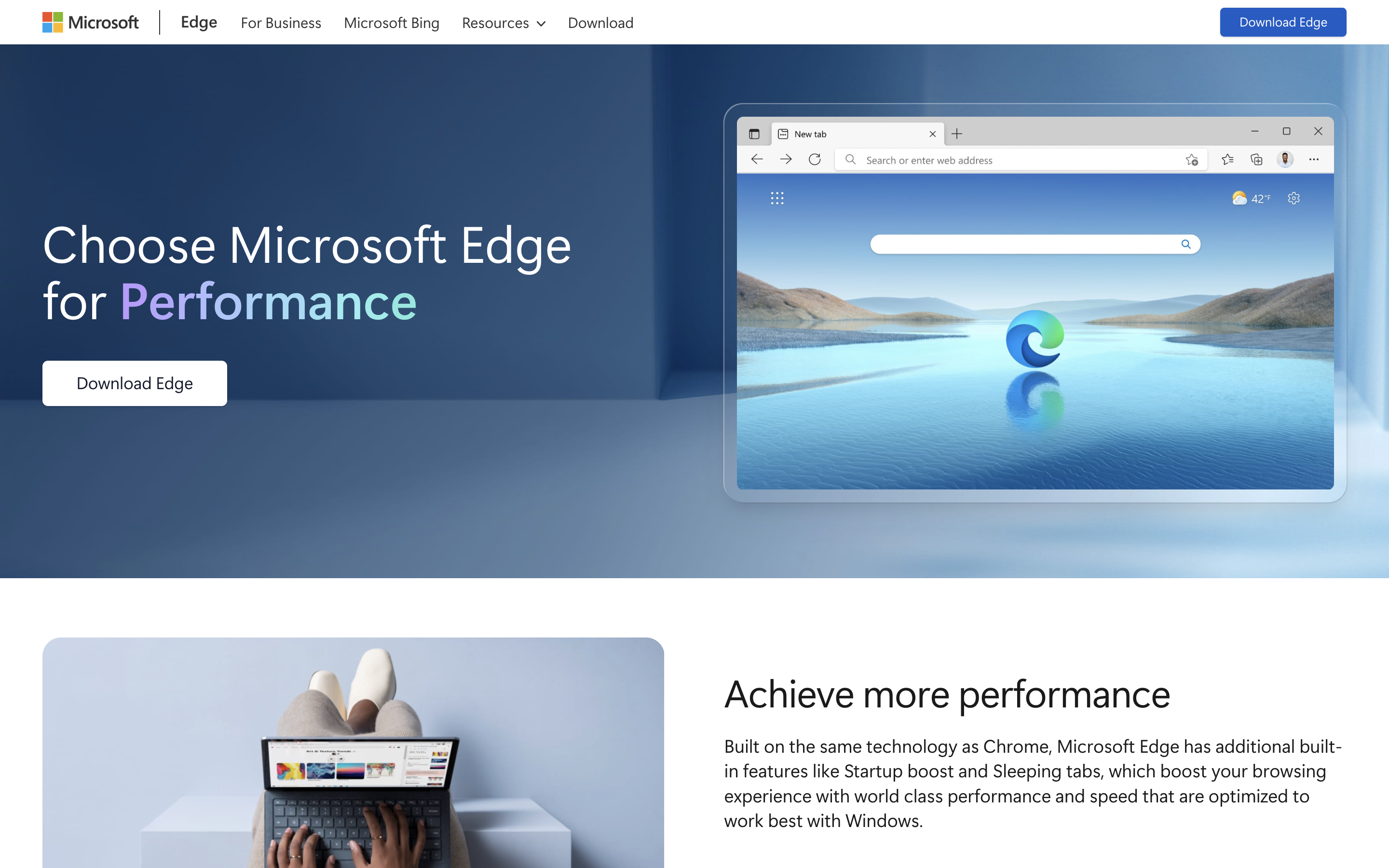
- Uses Chrome extensions
- Built-in PDF editor
- Quick access to Microsoft services
- Design can be cluttered
- Works best with Microsoft account
Microsoft initially launched Edge with its own engine, but after a while decided to adopt the Chromium one that drives Google’s Chrome browser. Since then, the app has grown into a very good option for the those who want the Chrome experience but with it’s own distinct flavour.
The design on Edge is modern and tidy, albeit a little cluttered at times, with plenty of powerful features built into the main menu. Collections opens up a side bar where you can drag web pages or add notes. It’s a great way to use Edge to plan for a trip or research a major purchase. Alternatively you can use the Tab Groups that are similar to the ones on Safari and Chrome. These are displayed on the tab bar along the top, with ones you’ve assigned to group all colour coded so you can see them instantly. Then, if you want to focus on something else, click the group name and all the tabs are collapsed into that, ready to reopen when you want to see them again. Vertical tabs also lets you instantly switch the open tabs from along the top of the page to a list in a column on the left. It’s a nice little feature that can make it easier to find what your looking for quickly.
You’ll also find a reader mode that reduces a page down to just the words, plus Edge can read aloud the contents if you prefer that approach. A very useful addition is a built-in PDF editor that can make filling out online forms a doddle, and the Web Select feature allow you to copy and paste contents from a page while retaining all of the formatting.
As with most major browsers, Edge has a password manager that can store you details for web sites and online accounts, plus it offers a Password Health and Password Monitor feature so you know if your details could be compromised.
If you use Outlook, then you’ll find the quick access to mail, calendar appointments and To Do items very handy. Those with a Microsoft 365 account can also launch free versions of MS Office apps from within the browser, much like with Google apps on Chrome. There’s also a grammar and spelling checker borrowed from Microsoft 365 that helps improve your writing when online in Edge. This new Editor works across social media sites or pretty much anywhere you can enter text.
Microsoft also includes various privacy features, all of which can be tweaked in the settings, plus you have access to the thousands of extentions that come with Chrome. If you’ve dismissed Edge in the past as just Internet Explorer with a facelift, we think you should reconsider that opinion.
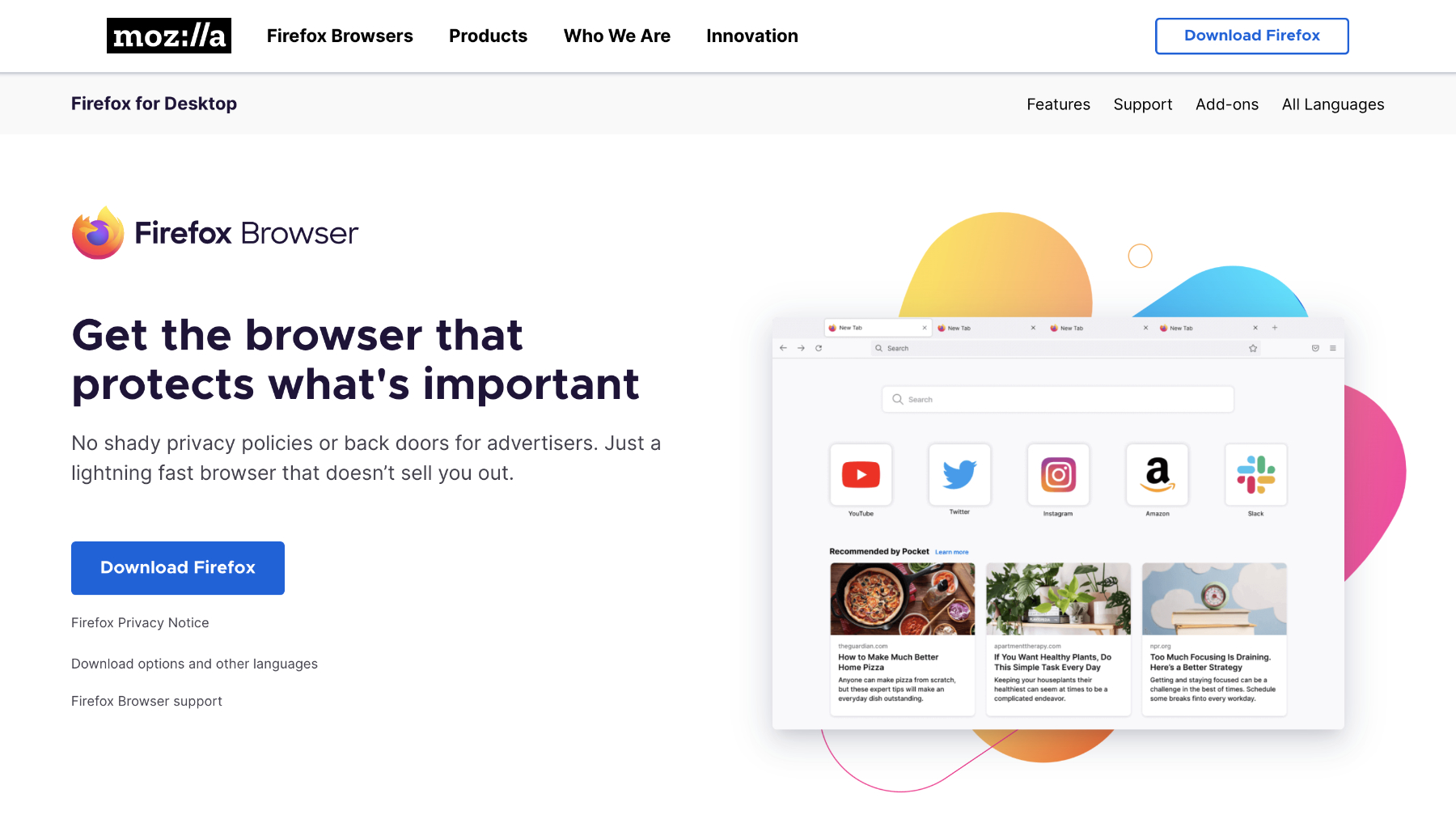
- Focus on privacy
- New Firefox view feature
- Loads of themes and plug-ins available
- Not as many features as Safari or Chrome
Another stalwart that’s received some much-needed spit and polish recently is Firefox. There was a time when this was one of the major players in the browser field, but time hasn’t been kind to Mozilla’s creation and Google Chrome has been one in particular that tempted people away. That’s a shame, as today’s Firefox version is slick, smart, and provides a worthy alternative to its higher profile competitors.
Mozilla takes privacy seriously and has a range of features to keep you safe online. Tracking Protection stops websites from following you around the web and collecting data that can be used to serve ads. There’s also ad and script blocking that speed up webpage loading times. There’s even an extension that sandboxes Facebook so it can’t follow your activities around the web. Whatever the tweaks under the hood, our experience with the app proved it to be rapid and reliable.
Firefox has always been a browser that lets you personalise things, so be sure to take a look at the various themes and extensions available that can decorate the menu section of the browser or add additional features. The menu bar itself has a number of functions that you can easily access by dragging icons onto it, providing quick links to things such as emailing links, saving the page to Firefox’s Pocket app to read later, or sending pages directly to your phone.
Some new features worthy of note include a built-in PDF editor, plus Firefox View which allows you to pick up on your Mac from whether you may have been on a webpage on another device. A bit like Handoff on Safari.
The extensions might not be as plentiful as they are on Chrome, but there’s lots of useful add-ons that can tailor your Firefox experience to just the way you like it. Mozilla also offers various tools such as Relay (similar to iCloud Private Relay) that creates email alisases you can use for signing up to online services or giving to people that you don’t want to know your real address. A VPN that can hide your location, plus Monitor that watches out for password breaches that may have included any of your accounts and passwords.
It may not be the force it once was, but there’s plenty of life left in Firefox yet.
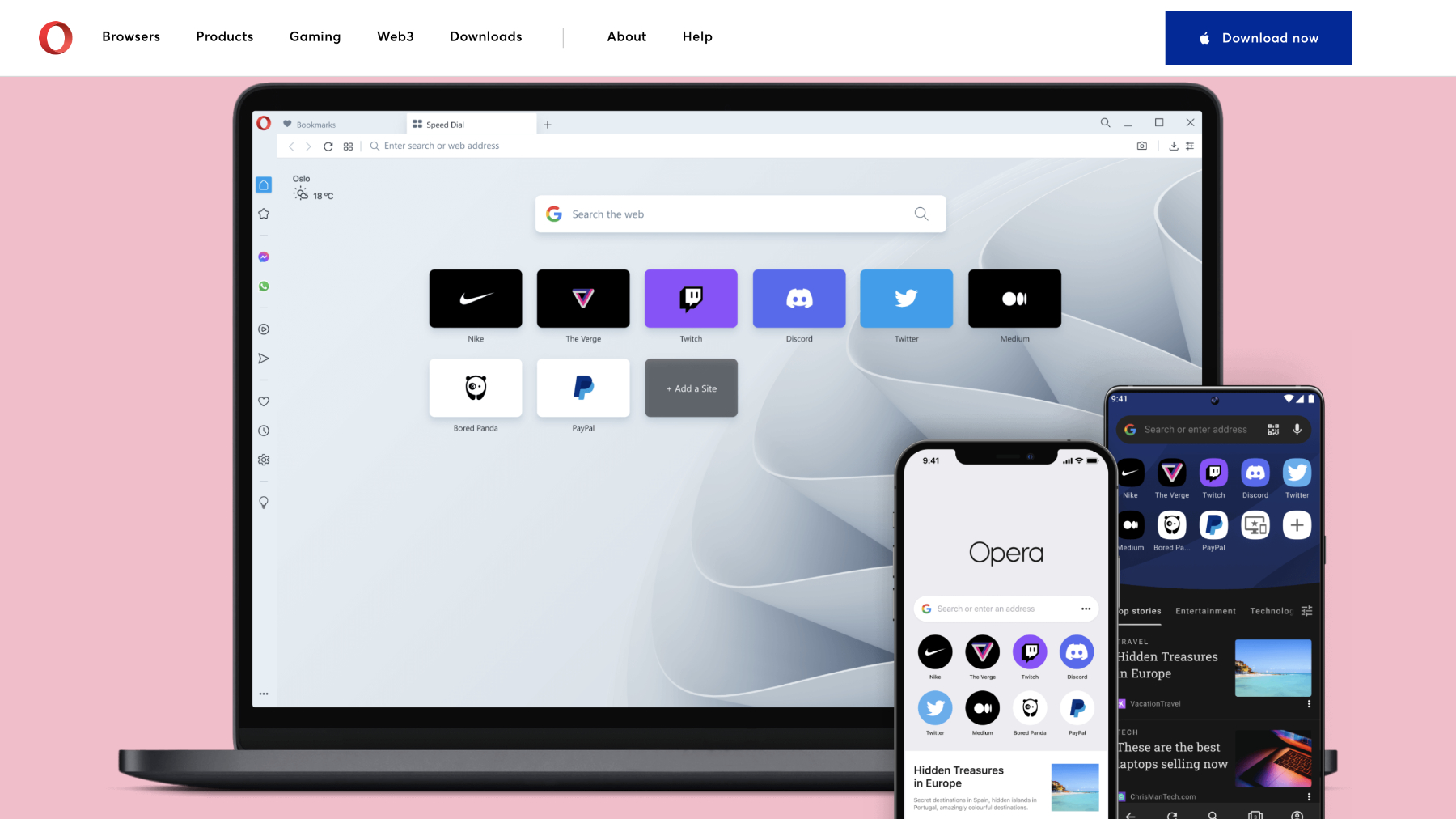
- Quick access to messaging apps
- Group Tabs and Pinboards
- Interface can look busy
Opera is built on the same foundations as Chrome, giving it a familiar feel in terms of features and performance. That doesn’t mean it’s a clone with a different badge though, as the app comes with some interesting design choices and handy tools that make it a solidly modern browser.
The first is a column on the left side of the screen that contains shortcuts to various options. Top of the list are Facebook Messenger, WhatsApp, Telegram and Instagram, all of which can be logged into and used while browsing the web. There’s also an option to add a Twitter account too, all of which is very useful if you don’t want to keep picking up your phone.
Another icon is for My Flow, an Opera specific feature that allows users to send webpages directly to their iPhone. At the bottom of the column are three dots that open the options menu. In here you can add or remove lots of other icons that take you to your bookmarks, a news section that collates the latest stories from your favourite outlets, a speed dial for commonly used sites, and plenty of other goodies.
Opera also has some privacy tools that make life easier when browsing, including a built-in ad blocker and a free VPN. The latter is great for keeping yourself safe when using public WiFi, even if the choice of server locations is limited.
Extensions are available in aplenty, thanks to the Chrome heritage, as are themes to personalise the aesthetic. You can also use Workspaces now, which is essentially the same as Group Tabs in Safari. Here you add new Workspaces (giving them names and choosing a relevant icon), then open various tabs in each one. This means you can quickly switch between themed webpages, simplifying things and stopping you having a million ones open at the same time. There’s also Pinboards, which is essentially a built-on version of Pinterest that lets you collect images from around the web and build them into mood boards.
If you’re looking for a browser that not only protects your privacy online, but also reduces the need for other apps on your system, Opera has much to offer.
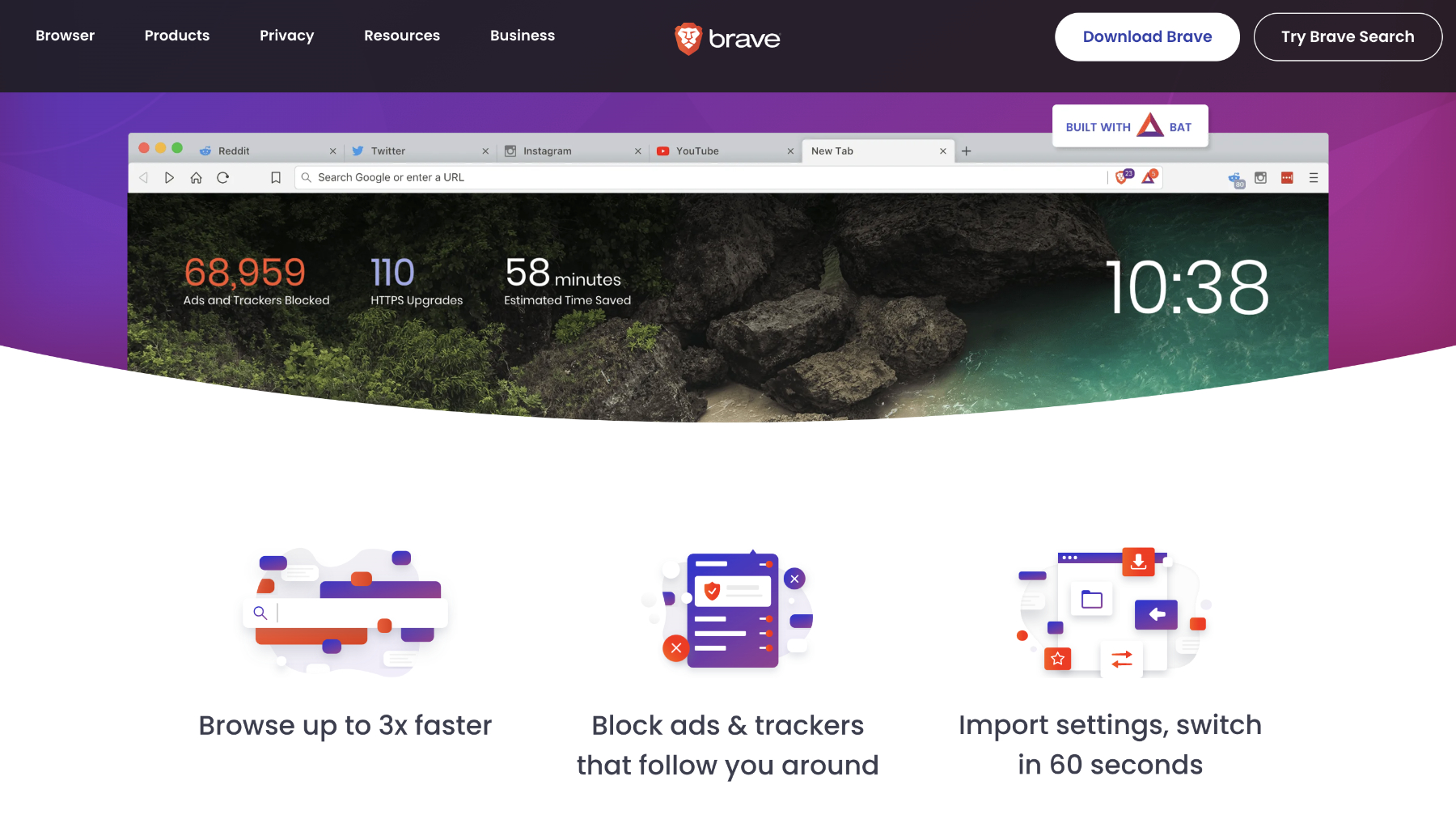
- Great privacy features
- Ad-free browsing
- Limited features compared to Safari and Chrome
- It can be a bit obsessed with Crypto currencies
Brave is a relative newcomer when compared to all of those listed above, making its debut as recently as 2016. Since then it’s gone from strength to strength, powered by its focus on removing all ads from the pages you visit. From a creator’s point of view this can be problematic, as most sites (including this one) rely on advertising in order to pay the writers and technicians who produce the content you’re reading. But for consumers, the freedom from intrusive ads can make the web a place where you can breath once more.
Brave takes things one step further by giving users the option to view ‘privacy-respecting ads’ that will pay them for the honour. This is all done via the Brave Rewards scheme, which is an innovative idea and has the added bonus of allowing users to essentially pay tips to sites they enjoy.
All that aside, Brave is a slimline app that speeds its way around the web. You’ll find plenty of settings to hone its performance to your whims, plus there’s the normal collection of password managers, bookmark menus, and accompanying mobile apps that can sync your profile. You can also avail yourself of a built-in Crypto wallet, plus there’s a Brave VPN, although that will cost you $9.99 per month or $99 for a year.
Brave offers its own Independent Search function that won’t track your enquires, there’s a private video-conferencing feature, the new Playlists capability with which you can compile videos and tracks from the web and have the playlist automatically available to enjoy on your iPhone, plus a customisable news feed that again won’t track your reading activities online. Have you gotten the idea yet? Brave is all about privacy, but not at the expense of functionality.
As it’s built on the Chromium engine, you’ll find all the normal Chrome features, but without some of the ads and tracking behaviour. Whether you support the idea of a total ad-blocking browser or not, there’s little argument that Brave gets the job done in style.
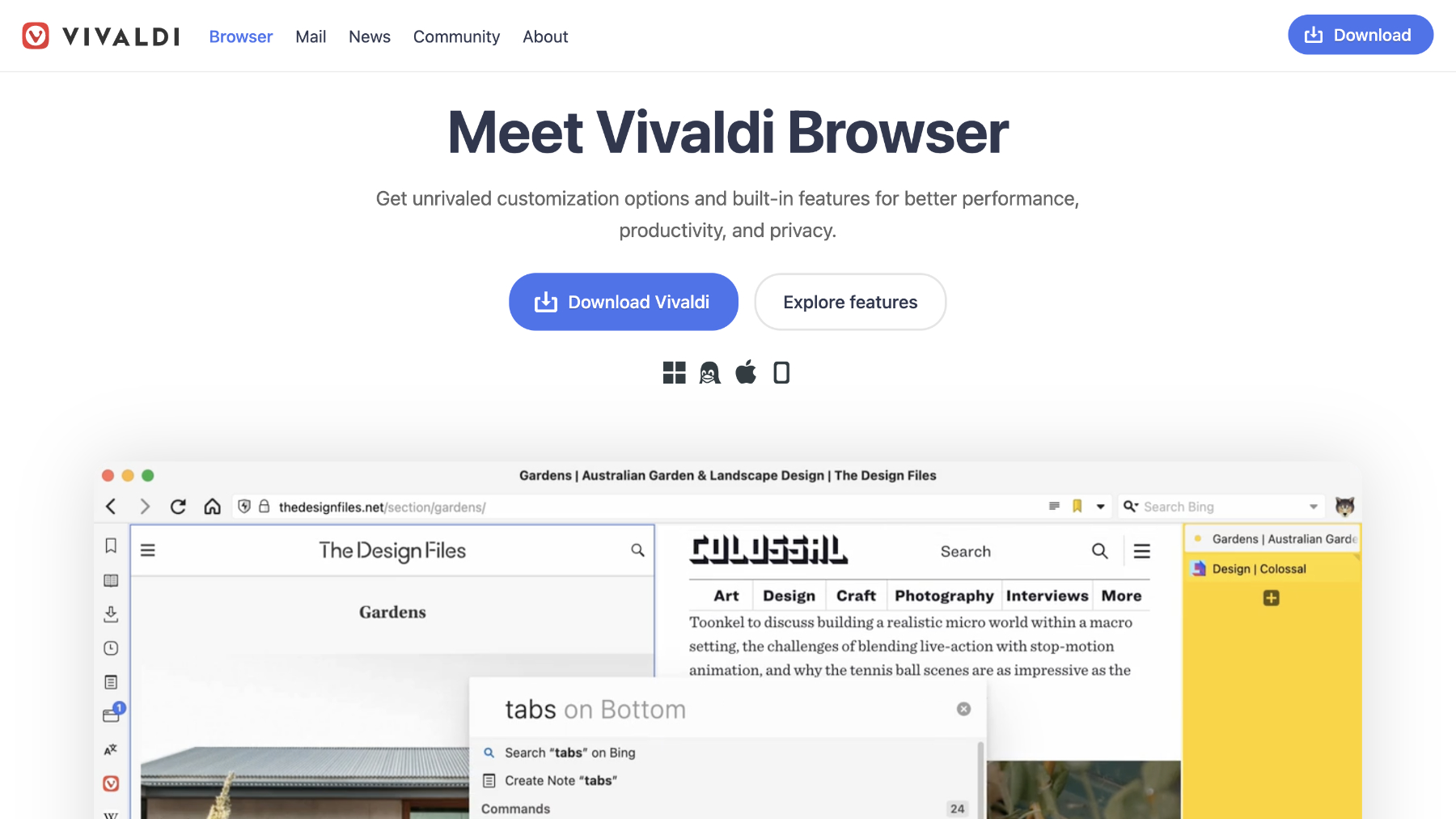
- Fast performance
- Swiss army knife approach to app integration
- New features added regularly
- Almost too many features
There’s a good chance you haven’t have heard of Vivaldi, or at least the browser rather than the 17th century Venetian composer. It’s a name you should familiarise yourself with though, as the company was started by Jón von Tetzchner, who co-founded Opera back in 1994.
Vivaldi has some two main focusses: privacy and customisation. So, if you want to take control of your browsing experience in a granular fashion then it may well be the grail at the end of your quest.
At its heart, Vivaldi is similar to Opera as it uses the Chromium engine. This gives it the advantage that you can use Chrome’s plugins. Where it differs is in its attitude to your data. Once you set up a password on your Mac you can sync your devices (only macOS, Windows, Linux or Android at present) knowing that everything in protected by end-to-end encryption that not even Vivaldi can see. Abusive ads that track you are blocked by default and there are various other settings to minimise any intrusions to your privacy.
Like Opera, Vivaldi has a side bar containing various options such as downloads, bookmarks, history, plus a few innovative options. One is Notes, which allows you to quickly jot down information without having to leave the browser and you can even include screenshots. This is great if you’re researching something or just want to remember a quote. You can also create tab groups and stack them on two levels in the menu bar. That’s not all though! Vivaldi lets you set whether the tab bar appears in the traditional vertical position at the top of the page or move it to the the flanks or along the bottom. You can also open multiple tabs at once in a split screen view, so you can work on them at the same time.
Web panels is another clever feature, in that it enables users to setup mini versions of webpages that can be accessed by clicking on its panel name. This is best suited to messaging services but also for Twitter and mobile optimised sites, as they will fit into the single column view.
You’ll also find further options in the bar across the bottom of the page, including the ability to capture a screenshot, adjust the zoom level via a slider, turning off images and videos on a page, as well as a comprehensive list of page actions you can instantly enable or disable by clicking a tickbox.
Vivaldi is now offering integrated Mail and Calendar apps that can help you stay organised without ever needing to leave the browser, plus the Vivaldi Translate feature means you can look up words and phrases not in your native tongue, but without Google getting to see what you’re translating.
Keeping the open source spirit alive is the recent integration of Mastodon, the federated alternative to the hate-filled Twitter bonfire of Elon Musk’s vanity.
There’s so much to explore in Vivaldi and it keeps growing at a steady pace. It might be one of the newest browsers around, but we think it could well be the way they all go in the future.
Avast Secure Browser
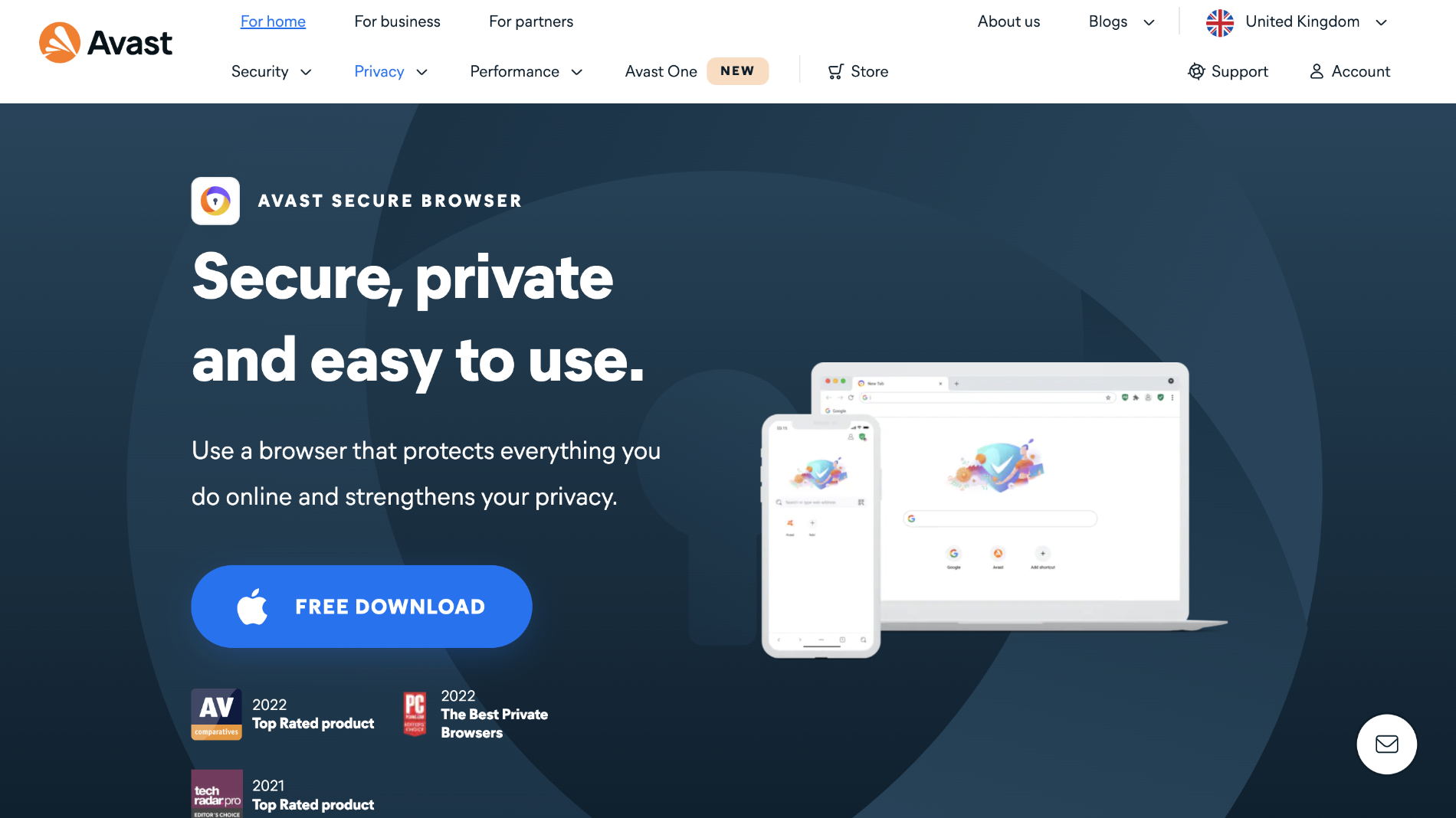
- Slim-line and secure
- Built-in VPN
- A bit basic
Although this browser remains in a beta stage at the moment, it’s another interesting option to those looking for a Chrome-style browser but with beefed up security and privacy. Avast is a name that will be familiar for anyone who has looked at antivirus software in the past, and its putting those years of data security to good use in its Secure Browser.
Using the built-in tools you can have your browsing protected by the included VPN, manage and monitor your passwords, stop trackers from using digital fingerprinting techniques to identify your device, plus a variety of other security features.
Of course, as the Chromium engine is underneath, you can use all the standard Chrome features such as bookmarks, private modes, dark modes, not to mention the wide wealth of extensions available. Syncing all of your data and settings across devices is also available, with the Avast Secure Browser also available on iOS.
It doesn’t have the bells and whistles of Opera, Vivaldi or Brave, but if you want a fast, simple, secure browser for your Mac, it’s well worth a look.
Duck Duck Go for Mac
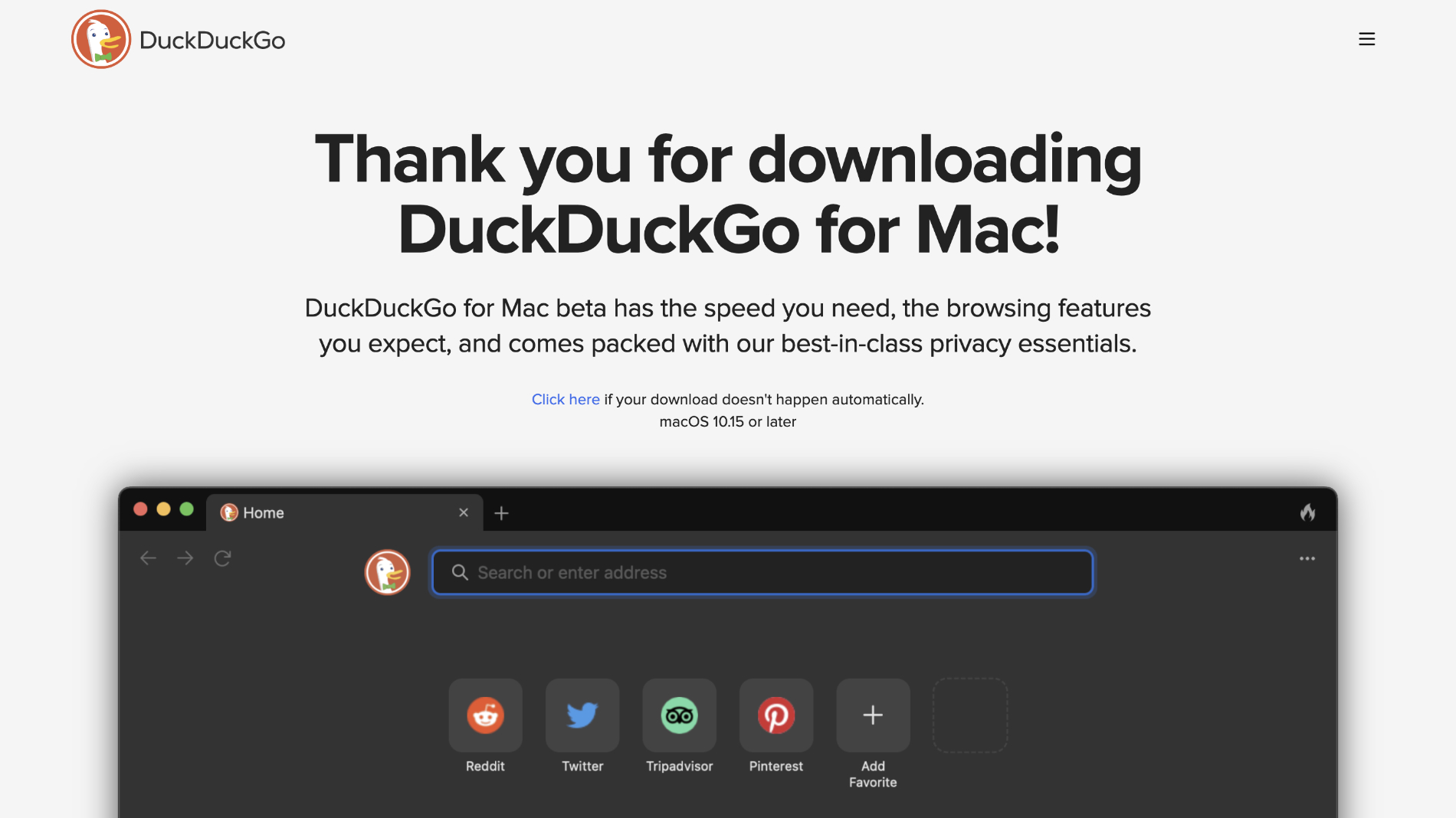
- Safe and secure
- Blocks most trackers
- Very stripped back
- Doesn't work with some plug-ins
Another new entry that still remains in beta is the browser from Duck Duck Go. You may recognise the name from the aponymous privacy-focussed search engine, but now you can use a dedicated browser whose mission it is to stop you being tracked while online. Based on the WebKit engine that powers Safari, DDG is a stripped back experience that gets out of the way and lets you swiftly find the content you want, while stopping anyone else watching. Although it shares the Apple build, DDG is equipped with purpose built password management, bookmarks and tab coding, which does have the knock-on effect of making it incompatible with a lot of plug-ins, most frustratingly password managers.
That being said, if you want a second browser for quickly and securely navigating the web, then the Duck Duck Go beta is well worth consideration. If you want to know more, you can check out our Duck Duck Go for Mac review .
Author: Martyn Casserly , Contributor

Martyn has been involved with tech ever since the arrival of his ZX Spectrum back in the early 80s. He covers iOS, Android, Windows and macOS, writing tutorials, buying guides and reviews for Macworld and its sister site Tech Advisor.
Recent stories by Martyn Casserly:
- How to delete photos from iPhone but not from iCloud
- How to edit a PDF on Mac
- How to find and delete duplicate files on Mac
- Browsers Opera Browser Updated Opera GX Downloads Features New Compare Browsers
- Privacy & Security
- About About Opera Opera Blog
Web browser comparison
Opera Browser has seriously powerful privacy and security features. Compare the best web browsers and see why people are downloading Opera. See more

Ad-blocking, tracking protection and a free VPN help make Opera the best web browser.
Opera automatically protects you from phishing, cryptomining, and paste-hijacking.
Messengers, social media apps and music services are integrated in Opera’s sidebar.
Productivity
Opera’s Workspaces, battery saver and Video Pop-out help you browse more smoothly.
Compare web browsers Opera and Chrome
Summary: Opera Browser provides better privacy and security than Google Chrome, without using up your CPU & RAM. And with more advanced productivity features, Opera is more intuitive and efficient compared to Chrome.
RAM/CPU friendly
Tests show that the Opera web browser uses less memory than its competitors, and Opera GX has RAM/CPU limiters built right in. Chrome on the other hand is well-known for using a lot of your memory and CPU capacity by running a large amount of background processes.
Built-in Ad blocker
Opera includes a built-in Ad blocker that prevents your browser from being littered with ads. Plus, when you block ads and popups you’re better protected from malvertising, and webpages load faster. Opera's Ad blocker also lets you unblock ads for any website you want, giving you complete control over what ads you see online. This type of ad blocking feature is not available in Chrome.
Tracking protection
Unlike Chrome, Opera Browser includes a Tracker Blocker that blocks analytic scripts, cryptojacking, tracking pixels and other methods of data collection. Opera’s tracker blocking feature is accessible through the ad blocking shield icon in its address bar, and you can customize lists and exceptions. In settings, you can choose to auto-clear cookies and site data when closing Opera as well as block third-party cookies. In Chrome, third-party cookies can also be blocked in settings, though it doesn't apply to Google itself. Google collects a lot of user data from Chrome by default, and privacy settings are in a separate section (You and Google), where most of the sync features are enabled by default. This includes address bar autocomplete cookies, browsing history, Google Drive content sharing, statistics and crash reports sending.
A VPN (virtual private network) is the most important feature for your online privacy. Opera includes a free browser VPN that provides privacy and security for your browser traffic when activated. It’s free, built right into the Opera web browser, and doesn’t require any subscription or login. Chrome does not have any built-in VPN.
Integrated messengers
Opera has the most popular messengers built right into the web browser . This lets you chat using Facebook Messenger, WhatsApp, Telegram and more directly from your sidebar, no matter which tab you’re using. Chrome does not have integrated messengers.
Browser comparison Opera and Firefox
Summary: Opera is the best browser in terms of privacy, speed, and freedom of customization when compared to Mozilla Firefox. Opera offers more unique features for productivity and lets you access more content directly in your browser.
Music Player
The world of music is at your fingertips without opening another app. Just flip the Player switch on the Opera Browser sidebar and play your favorite music from the most popular streaming services, like Apple Music, Spotify, YouTube Music, Deezer and Tidal, directly in your browser. Firefox does not have this feature.
Built-in Ad Blocker
Opera's built-in Ad blocker ensures your browsing isn’t littered with dozens of ads. And when it blocks ads, web pages load faster and you enjoy more protection from malvertising. Firefox also has a built-in adblocker, but most users opt for a separate extension that works better.
Battery Saver
When browsing on a laptop with no way to plug it in, saving battery life is a great advantage - especially when you need your device for work. Opera Browser’s Battery Saver feature extends your battery life by up to 35% without sacrificing performance. Firefox does not have such a feature.
File sharing
Flow is Opera's custom feature that allows you to securely send attachments (notes, files, images, links) between devices, including your mobile phone. All you have to do is scan the QR code to connect your desktop browser to your mobile version . Anything you send between devices with the Flow feature is encrypted for privacy and security, and is immediately available in your other device’s Opera Browser. Mozilla Firefox used to have a similar feature, but it was discontinued in 2020.
Tab grouping
Do you keep a lot of tabs open at the same time? Opera Browser allows you to group them into separate workspaces so you can organize them by context, like work, shopping, gaming - whatever you want. With one click, you can switch between these groups to keep related tabs together and deal with less at one time. Firefox does not have a workspaces feature, but similar addons can be downloaded for it.
Compare browsers Opera and Edge
Summary: Opera is the best browser for privacy, security and customization. And unlike Microsoft Edge, which you can’t uninstall, you have freedom of choice with the Opera web browser.
Paste protection
Malware exists online that can hijack your clipboard and change the data that you copy and paste. By doing this, hackers can trick you into sending money to their accounts. To prevent this, Opera has included a Paste Protection feature in its browser. When you copy and paste information, Opera’s Paste Protection feature monitors the information for a time, or until you paste it, and warns you if the data is changed. Edge does not have this feature.
Opera Browser comes with Player, a built-in music player, right in the sidebar . Player lets you connect to music services, like Spotify, Apple Music, YouTube Music, Tidal and Deezer, as well as switch between them any time. When you click the Player icon in the sidebar, a handy panel opens up with the music services you’ve connected to, so you don’t have to switch between tabs or windows. Also, when audio starts playing on a webpage, like if you start a YouTube video, the music in Player automatically pauses, then resumes when the other source stops. Microsoft Edge does not have an integrated music player.
A virtual private network protects your online privacy by masking your location and encrypting your online traffic. Opera has a free browser VPN built right into Opera Browser, which doesn’t require logging in or subscribing. Microsoft Edge is currently testing its Secure Network feature, which is quite similar. However, you need to log in with your Microsoft account to enable it. Another difference is that Edge automatically connects to the nearest location, while Opera’s Free VPN lets you choose from a number of locations.
Integrated social media
Opera Browser has social media apps, like Instagram and Twitter , built right into the browser’s sidebar, making it easy to keep up with social media while browsing the web. Once you’ve signed in, you can just click the icon on your sidebar to pop out the app’s panel. This way you can browse, post, and chat without opening new tabs or windows.
Can be uninstalled
Microsoft makes Edge the default browser on Windows devices automatically. While you can change your default web browser through the start menu (default apps), you cannot uninstall Microsoft Edge without deeper technical knowledge. Opera Browser is not the default browser for any device, meaning that its 350+ million users have specifically chosen to download and use Opera.
Compare web browsers Opera and Safari
Summary: Opera Browser provides superior privacy over Safari, with free features that keep you safe online. Plus, Opera’s dedicated features, like browser AI and integrated messengers, allow you to do more and stay connected without leaving your browser.
Opera Browser has a free built-in Ad Blocker hat can be enabled in one click. Opera’s Ad Blocker protects you from malicious ads, keeps your browsing space clean, and makes webpages load faster. You can also unblock ads whenever you want, in general or on specific websites. The Safari browser does not have any built-in ad blocker, but can block pop-ups if you search through settings and enable the function.
Cryptomining protection
Opera Browser blocks crypto mining scripts by default through its Ad Blocker. By preventing crypto mining on your device, Opera saves your device’s speed, battery and processing power. Safari does not block crypto mining scripts. While Safari’s Intelligent Tracking Prevention limits third-party cookies, you would need to rely on third-party extensions to protect against crypto mining.
Opera Browser includes a free browser AI, named Aria , both in Opera for desktop and on Android or iOS. Aria has a chat interface where Aria will provide you with clear answers instantly, saving you from digging through search results and scouring webpages for the information you want. And unlike other AI chatbots, Aria can get information from the web, giving you real-time information that’s not limited to the past. Beyond chatting and answering questions, Aria can generate content based on your requests. Aria’s Compose feature makes this even easier with an interface that lets you assign parameters to the generated content. On Opera for desktop, Aria is available in Opera’s sidebar, or via keyboard shortcut ( Ctrl + / ). On mobile, Aria can be found in the main menu. Safari does not include any AI feature.
The most popular messengers , like WhatsApp , Facebook Messenger and Telegram are built into Opera Browser. Sign into your preferred messenger and access it in one click from Opera’s sidebar to chat easily without leaving your browser. The chat panel can be pinned for browsing and chatting side-by-side. Safari does not have any integrated messengers.

Why is Opera the best browser?
Here’s what users say

10 times faster than Chrome and there’s a built in ad blocker. What more is there to ask for.
Opera user from United States

Finally, NO Ads. Edge was sending me flash adverts so fast I couldn’t get any work done. Opera is a breath of fresh air.
Opera user from United Kingdom

I just switched to Opera from Firefox and it’s a really nice and refreshing browsing experience. Super clean.
Opera user from Poland
You deserve a better browser
Opera's Ad blocker, Player, Lucid Mode and Flow file sharing. Just a few of the must-have features built into Opera for faster, smoother and distraction-free browsing designed to improve your online experience.

- Accessories
- Entertainment
- PCs & Components
- Wi-Fi & Networks
- Newsletters
- Digital Magazine – Subscribe
- Digital Magazine – Info
- Smart Answers
- Best laptops
- Best antivirus
- Best monitors
- Laptop deals
- Desktop PC deals
When you purchase through links in our articles, we may earn a small commission. This doesn't affect our editorial independence .
Best web browser 2021: Chrome, Edge, Firefox, and Opera go head-to-head

The web browser is by far the most important piece of software on your PC. Unless you’re at a workstation crunching numbers or editing Hollywood blockbusters, you probably spend the majority of your computer time staring at a webpage.
That’s why it’s important to have the best tool for the job. So much has changed since our last browser showdown in early 2019. Not only is Internet Explorer out, but classic Edge is about to be replaced by Chromium-based Edge . The latter is not officially a part of Windows yet, but you can already download it manually to replace the original (and basically terrible) Edge. For this latest PCWorld browser showdown, we’ve dumped classic Edge and replaced it with the stable version of Chromium Edge.
There are tons of browser options out there but real choice is limited. With Edge now using Chromium, three of our four browsers in this showdown are based on Google’s open-source project. Even the two most talked about “alternative” browsers, Brave and Vivaldi , are based on Chromium.
We won’t get into the argument here, but suffice to say, from our point of view this is bad. The web thrives when multiple engines adhere to independent web standards, not when developers target a single browser engine. We’re not quite returning to something like the age of Internet Explorer 6. Apple’s Safari browser (based on Webkit) is really the only choice on iOS, for example. Still, it’s concerning.
Let’s take a look at the four major options—Chrome, Edge, Firefox, and Opera—to see how they stack up in 2020. Last time around, Opera topped our charts as the best browser to get. This year, Edge (yes, Edge ) is our top pick, but don’t get too excited. You’re not losing much, if anything, if you stick with Chrome instead. Read on to find out why.
(If none of these internet browsers strike your fancy, head over to PCWorld’s roundup of 10 intriguing alternative browsers .)
Browsers in brief
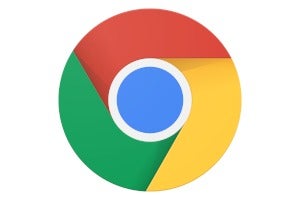
A perennial favorite, Google Chrome tops the metrics charts of both StatCounter and NetMarketShare by a huge margin. Google’s browser has built a dedicated fan base thanks to its massive extensions library, and the fact that it just gets out of your way to put the focus on web content, not the browser’s trimmings.
Chrome isn’t quite as simplistic as it once was, but it’s still very easy to use. There isn’t much to Chrome except a huge URL bar—known as the OmniBar—plus a space for extensions, a bookmarking icon, tabs, and that’s it.
Yet Google still finds a way to hide all kinds of features inside the browser, including deep integration with Google’s services. It can sync bookmarks, passwords, open tabs, and more across devices. Chrome also has multi-account support for family PCs, a built-in PDF viewer, built-in Google Translate functionality, a task manager, and the always handy Paste and go context menu item.
If there’s one complaint people have about Chrome it’s that the browser eats up available memory. Our browser testing in 2015 showed that Chrome was definitely a memory beast, but these days the beast is much more domesticated.

Anyone who loves extensibility but wants greater privacy should look at the open-source Mozilla Firefox. It’s also the only non-Chromium option in this round-up. Firefox paved the way for other browsers to become extensible, and its extensions architecture offers plenty of choice for users. Firefox also has a sync feature to see open and recent tabs, browsing history, and bookmarks across multiple devices.
Firefox 74 is an excellent browser, and continues the Quantum era that started with version 57 . Quantum brought a new and updated design with refreshed icons, and a new library section that houses your history, pocket reading list, downloads, and synced tabs. Firefox also has a task manager, screenshot tool, and the ability to use Windows 10’s native sharing tool.
Where Firefox has really stood out in recent years is with the browser’s incognito mode . All browsers have a private mode that lets you browse without any of your activity being logged in your saved history. But most of the time these private modes still allow websites to track your activity for that specific session. Firefox does away with this by including ad and tracker blockers when using incognito mode. It also supports an optional Facebook Container extension that prevents the social network from tracking you across the web.

Before Chrome, Opera was a popular choice among power users.
Opera is really one of the more under-rated browsers around. It comes with a built-in VPN—though we don’t recommend using it. It also has built-in ad and tracker blocking, a snapshot tool, a unit converter for time zones and currency, and the mobile versions of Opera come with a built-in cryptocurrency wallet.
Opera also has its own take on the social sidebar with one-click access to services such as WhatsApp, Facebook Messenger, and Telegram. Like Chrome and Firefox, Opera also has cross-device syncing features.
Microsoft Edge

Microsoft Edge is dead, long live Microsoft Edge. Edge is now a Chromium-based browser. The new version isn’t bundled with Windows 10 at this writing, but installing it from Microsoft’s site will automatically replace legacy Edge with the new Chromium browser on the desktop.
Performance with Chromium Edge is on par with Chrome and Opera, and it also has similar functionality. That means extensions from the Chrome Web Store are available, but not by default. As with classic Edge, extensions come from the Microsoft Store, but it can be set to install Chrome extensions by typing edge://extensions into the URL bar and pressing Enter . Next, click the Allow extensions from other stores button, select Allow in the pop-up window that appears, and then visit the Chrome Web Store and use it just like on Chrome.
We expect Microsoft to continue to push the Microsoft Store with extensions for Edge. These efforts are most likely in vain, however, as the Chrome Web Store is available to Edge users if they want it, and developers have little incentive to add their work to Microsoft’s store.
As with other Chromium browsers, Edge can sync open tabs, bookmarks, saved passwords, and browsing history across multiple devices. Currently, Chromium Edge lacks many of the Windows 10 features the old version had, such as integration with OneNote and Cortana. Microsoft does plan on bringing out a new feature soon called Collections that can “collect, organize, share, and export web content to Word or Excel.”
Right now, Edge is fairly plain, but that’s normal for a new browser. As Chromium Edge matures we expect to see Microsoft extend the browser’s capabilities.
With the overview of our four contestants out of the way, let’s get down to business. To find out which browser is worthy of your bandwidth in 2020 we used a variety of testing tools.
We largely stuck to our typical testing regimen, but that is set to change in upcoming browser showdowns. A number of the tests we use have been unsupported for years, and it’ll soon be time to shake up our testing approach.
For this round we added WebKit’s JetStream 2.0 , which was released in March 2019. JetStream 2 contains a lot of the tests from JetStream 1.1. It also borrows from newer benchmarks such as WebKit’s Ares-6 and Web Tooling by the V8 team (V8 is the JavaScript and WebAssembly engine for Chromium). WebKit said it also drew inspiration from Mozilla’s Kraken. Anyone who wants to get into the details of JetStream 2 should check out Webkit’s blog post .
In addition to JetStream 2, we used JetStream 1.1 to maintain comparisons to previous runs of the showdown one last time. We also kept the now-unsupported Octane 2.0 and SunSpider 1.0.2 benchmarking tools. Then we turned to WebXPRT 3 and Speedometer to test the browsers under simulated web app workloads.
Finally, we took a look at CPU and RAM usage by loading a set of 20 websites in a single window in quick succession. Once all tabs began loading, we waited 45 seconds, and then checked the CPU and RAM usage. The idea was to see the amount of system resources the browser used during a heavy workload.
For the tests we left each browser in its default state. There are no extensions running, no account sign-ups, nor was there any deliberate tinkering with settings. It’s just raw browser action.
Our test rig was an Acer Aspire E 15-575-33BM laptop loaded with Windows 10 Home, version 1909. The laptop also has a 1TB hard drive, 4GB RAM, and an Intel Core i3-7100U. Each browser was tested over an ethernet connection.
The performance picture
Firefox came out of this showdown a browser of extremes. As we’ll see, it either wins a particular performance test or comes in dead last. This is most likely a result of our current browser monoculture. When a Chromium browser wins a particular category, its two cousins aren’t far behind. Nearly every Chromium-based victory was one of degrees between the three amigos, which inevitably pushes Firefox towards the back.
For all of the benchmarks, we ran the test three times in succession, except for WebXPRT 3 and our homegrown 20-tabs torture test. Each time we ran the test we relaunched the browser window. We then took the average score from the three runs.
Let’s start with JetStream 2, the newest addition to our testing regimen. Our top winner for this round was Edge, but as we said it’s hardly a resounding victory with Chrome and Opera not that far behind. Firefox performed abysmally in this test compared to its counterparts.
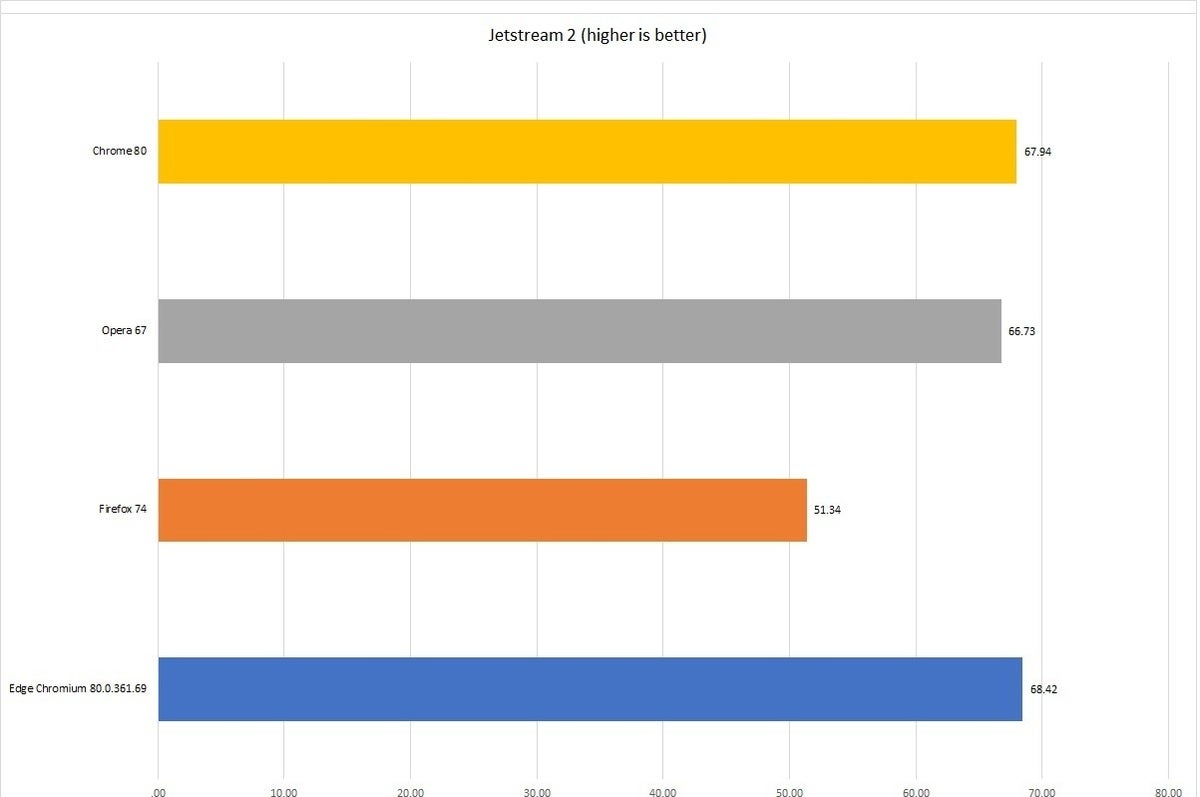
Looking at both JetStream 1.1 and SunSpider, Firefox won top marks. It won the SunSpider test handily (lower is better) with Edge coming in second. Interestingly, Edge was quite a few seconds faster than the other two Chromium browsers. Firefox was marginally better than in our 2019 outing, shaving 8 milliseconds off its score—though that is within the margin of error. Chrome and Opera weren’t even close to Firefox, but they did cut down their scores by more than 100ms. So good job to the V8 team.
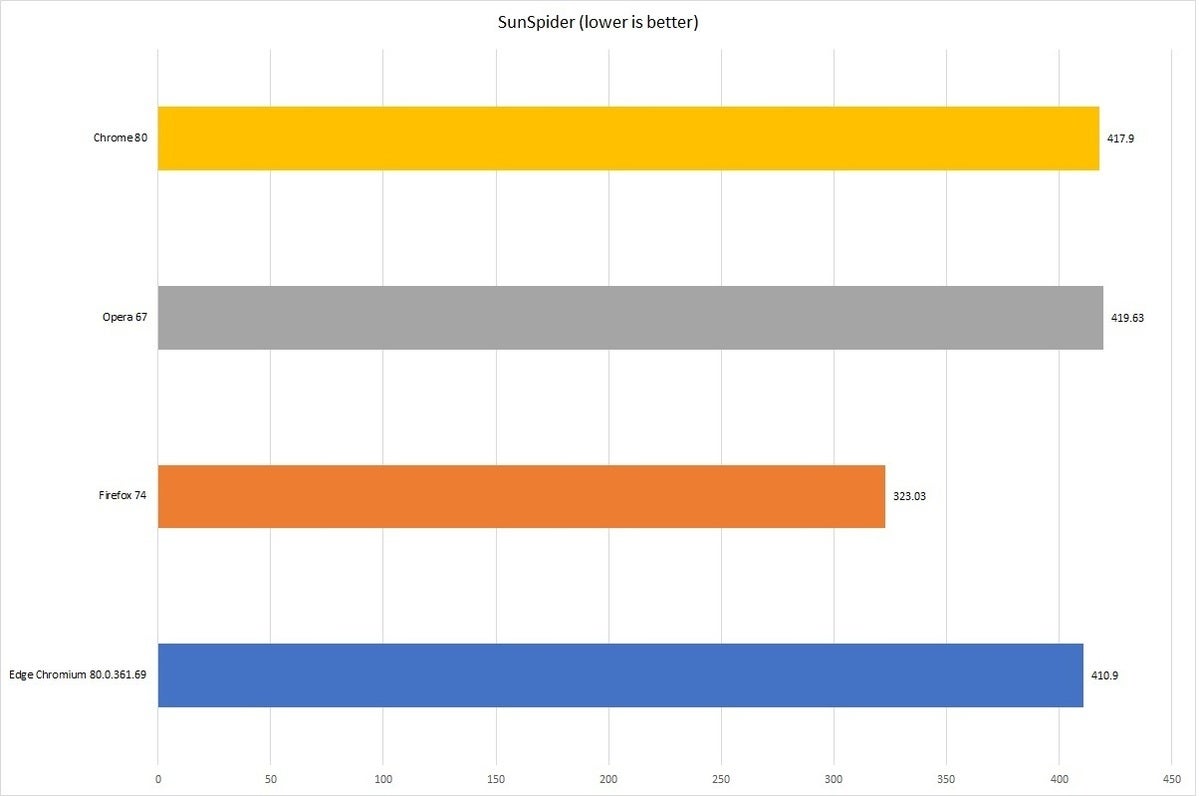
Firefox’s JetStream 1.1 score (higher is better) wasn’t any better this time around than its previous runs, but the other browsers either didn’t improve enough (Chrome and Opera) or changed browser engines (Edge). That puts Firefox at the top spot for not sucking as much as Chromium.
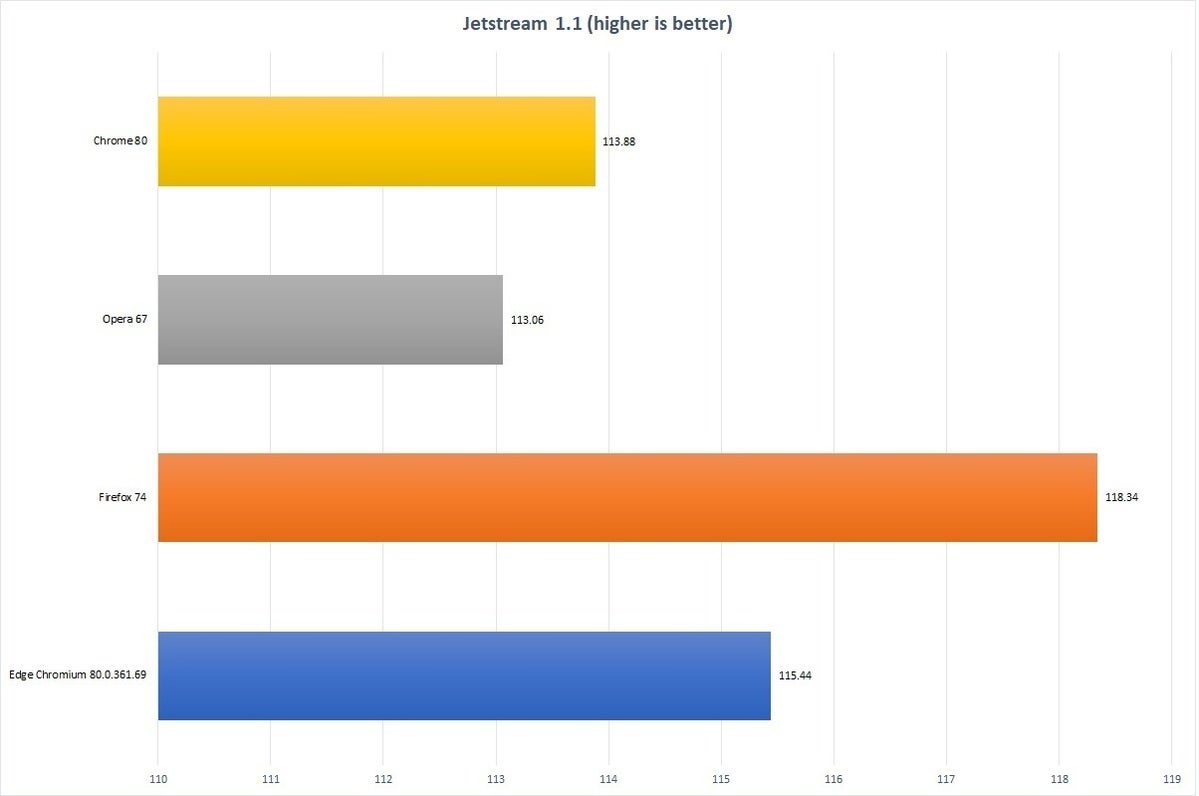
For Octane 2.0, which is also no longer supported, Edge grabbed another victory. Notice, however, that it’s only marginally better than Chrome. Opera, meanwhile, was out to lunch compared to its brethren, and Firefox was pushed towards the back. Mozilla’s score is about the same as it’s always been, but the Chromium browsers improved significantly compared to the 2019 outing.
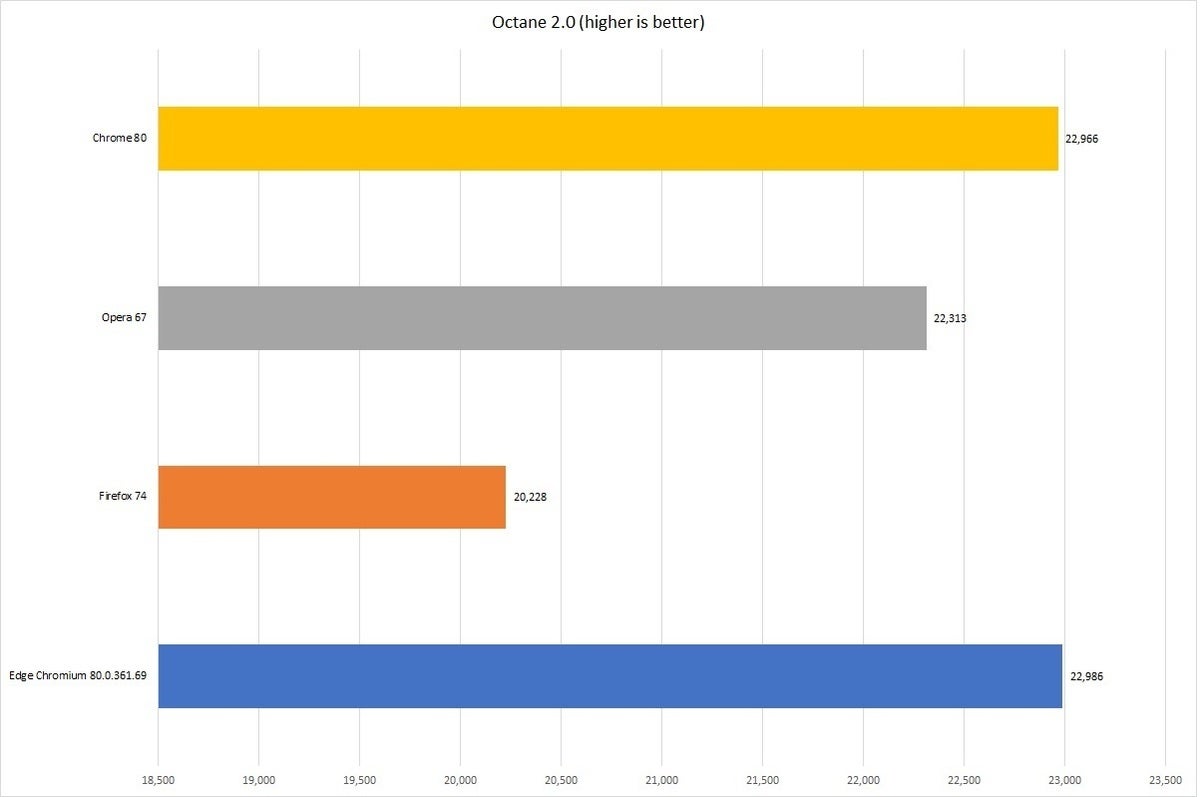
Moving on to the more modern Speedometer test, which quickly iterates through a set of HTML 5-based to-do lists. Chrome came out on top, with Edge a close second and Opera nearly three points behind the leader. Firefox, meanwhile, was way behind team Chromium. It’s worth noting, however, that Speedometer scores for Chromium browsers were much higher just two years ago with 90+ scores being common.
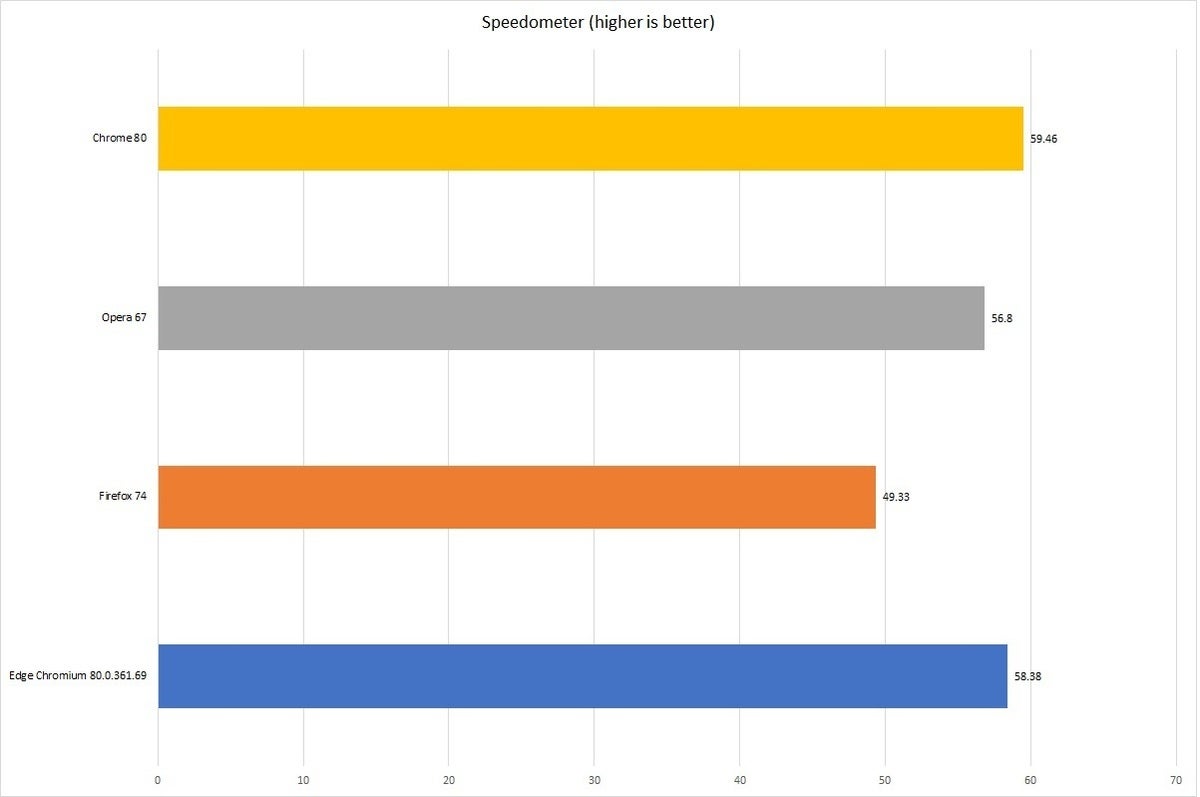
The numbers were much closer for WebXPRT 3, which looks very similar to WebXPRT 2015. The scores, however, are dramatically different. WebXPRT 2015 scores were commonly three hundred or more. With WebXPRT 3 the scores didn’t crack 150. That means comparing these scores to previous runs won’t give us any insights.
WebXPRT uses a wide number of web apps, from photo collections to online note-taking to data sets to score performance. This test is kind of like a PCMark for browsers, and to our mind, one of the most significant tests. Firefox came out on top here by a solid margin, with Edge coming in second followed closely by Chrome and Opera—the latter two tied for third. Again we’re seeing the Chromium effect on these scores.
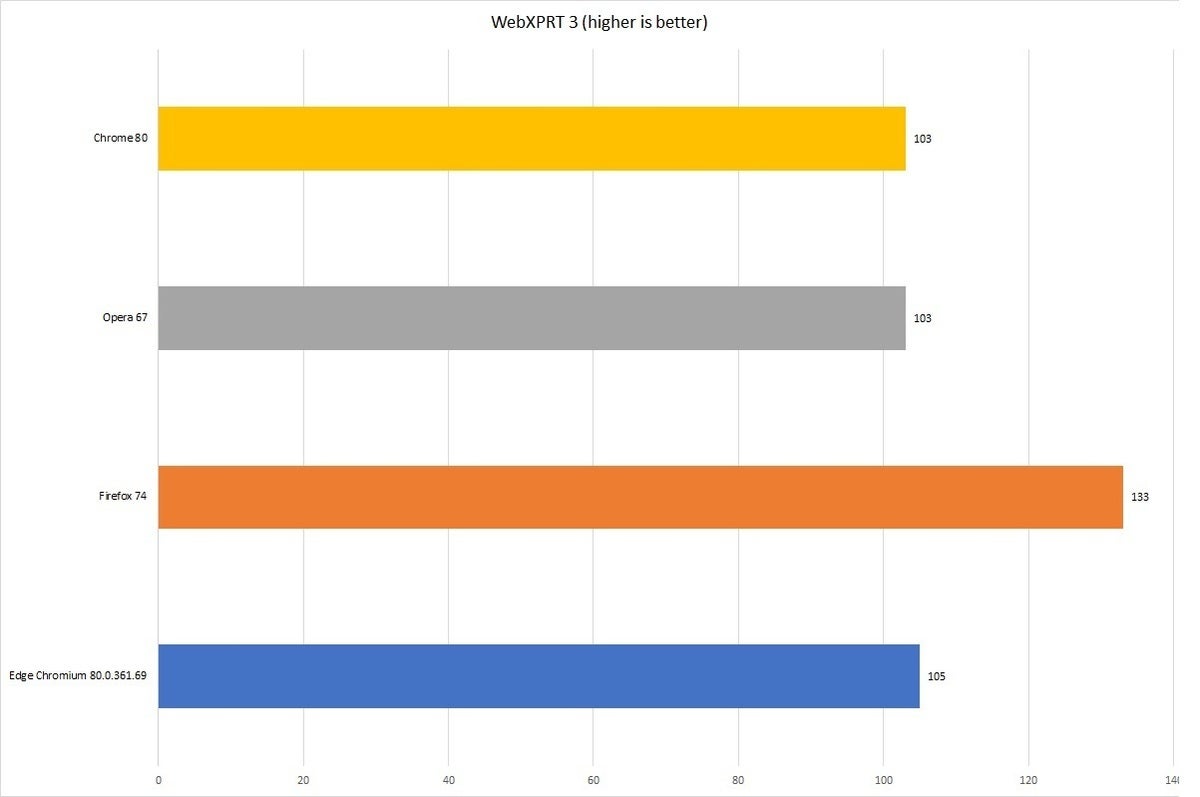
Finally, we come to the memory and CPU tests. Slamming an average PC with 20 tabs of mostly media-rich sites all at once is going to chew up a good chunk of CPU and memory. Most of these browsers did not disappoint in that respect.
Edge was the best performer in CPU usage by a good margin. Opera came in second, followed hot on its heels by Chrome. Mozilla’s performance was a little better than last time, but still nowhere near what it needs to be.
This test is where each browser distinguished itself with finally at least three different outcomes.
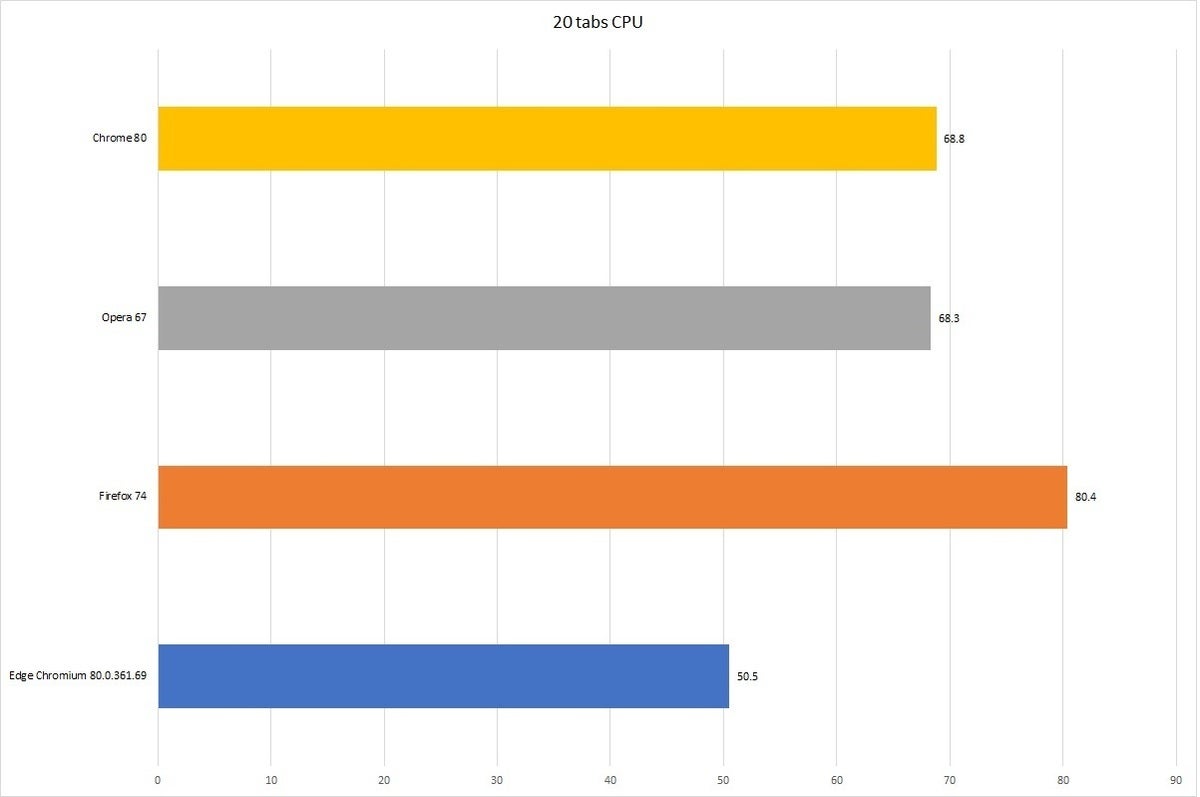
Edge took the crown for memory as well, but Chrome wasn’t that far behind. Interestingly Opera was only marginally better than Firefox. Again, mostly different outcomes for each browser. The Chromium underpinnings matter less here.
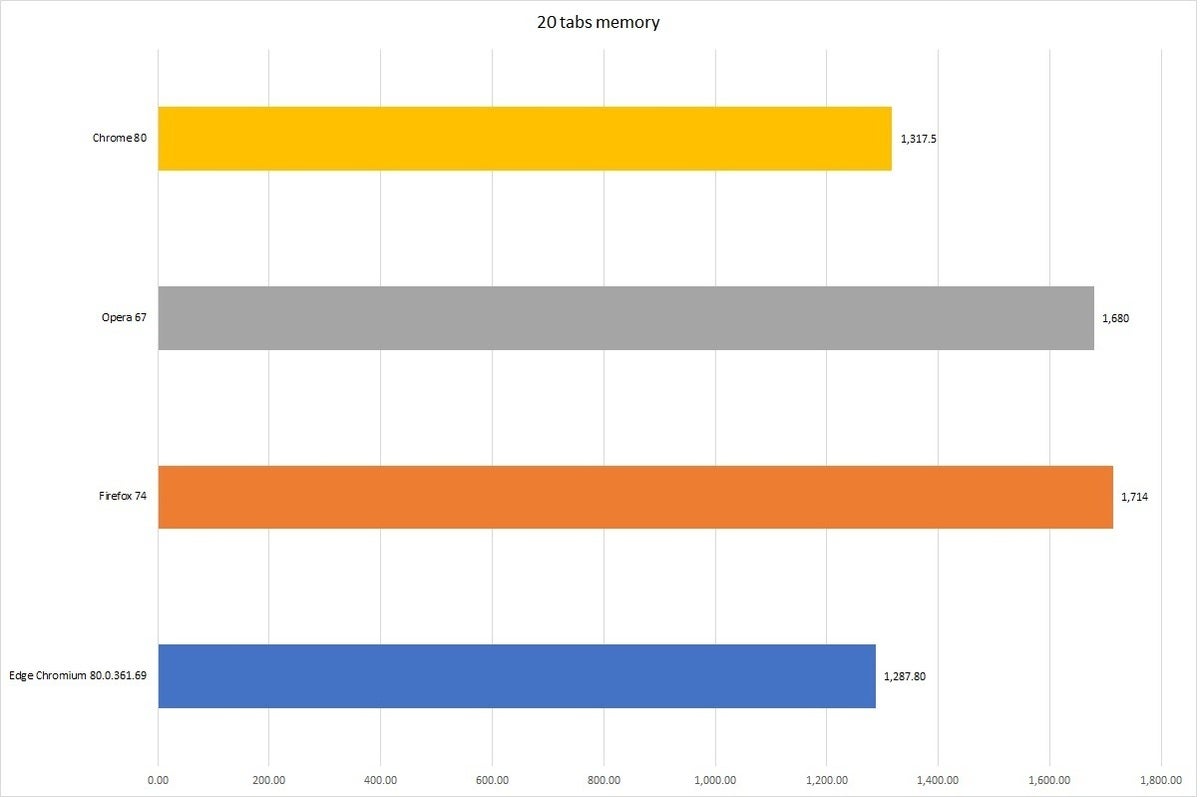
And the winner is…
So who wins? Here’s how we see it.
Chromium Edge wins our top spot for a good showing in the stress test, as well as Octane 2.0 and JetStream 2. Chrome is a close second since its showing was consistently good and not far off of Edge. Really, this could’ve been called a tie as well, but the margins in some of the tests, while not wide, were enough to hand the crown to Edge.
We’re giving Firefox third place for strong showings in the old JetStream 1.1 test, as well as Sunspider and WebXPRT. We also feel compelled to be perhaps a little unfair and send some ire Mozilla’s way.
As the only non-Chromium mainstream browser it simply has to do better—especially in CPU and memory management. The new Quantum versions of Firefox are dramatically better than their predecessors, and as we said last time, if the stress test had gone better it might have taken the top spot or at least second place. PC users need a strong alternative choice to this Chromium soup we’re swimming in, and for that reason Firefox must up its game. To borrow a quote from Princess Leia, “Save us Mozilla, you’re our only hope.”
Opera comes in last for scoring either third or fourth place in every test we ran, save one. Granted, those losses were almost all a matter of degree, but it shows a consistent pattern.
To sum up: Edge is the best browser available right now, though Chrome’s performance is very close to it. Firefox is still a solid option if you want something that isn’t built with Chrome DNA. Finally, if you love Chrome but want something with a little more novelty then Opera is for you.
- Services & Software
Browser battles: IE vs. Firefox vs. Chrome vs. Opera vs. Safari
We run-down the latest versions of all the main browsers in a head-to-head comparison to sort out where each browser scores well or offers something unique that makes them a must-use proposition. Should you make a switch?

Jump to section
- Internet Explorer
A good browser does what you want, when you want it to. At a basic level, any browser you choose will do the basics — page display, secure websites for matters such as online commerce and banking — to a standardised level. So what marks out one browser from another?
We've taken a look at the latest and greatest from Microsoft, Apple, Opera, Google and Mozilla to sort out where each browser scores well or offers something unique that makes them a must-use proposition. Most users tend to use one browser and stick to it as a familiar kind of playground, but are they missing out on the best the web can offer as a result?
We're well past the point where you have to pay for a browser, and with the exception of Internet Explorer, everything we're looking at works across multiple computing platforms. These aren't benchmarks or reviews per se; we're just using the currently most up-to-date browsers to point out where it might be worth switching browsers.
The biggest players get to go first. So up first, we've got Internet Explorer 9.
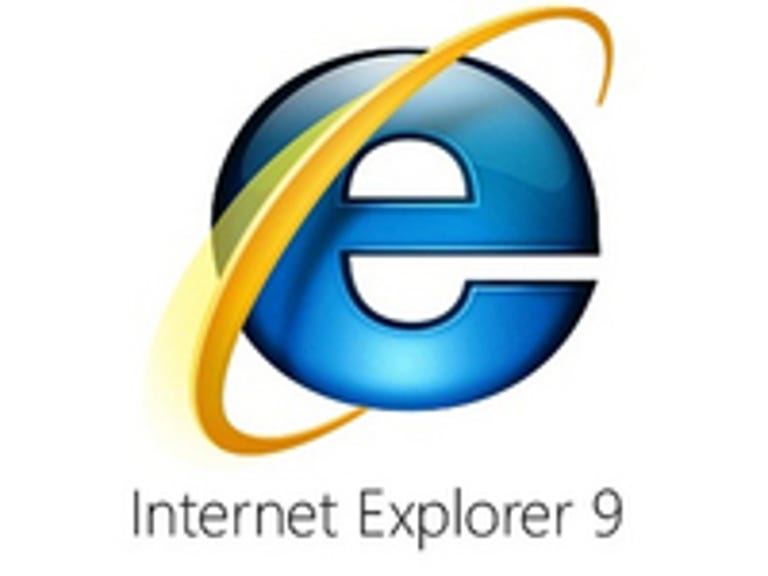
Internet Explorer 9 Beta
Where to get it: http://ie.microsoft.com/testdrive /
There was a time when Internet Explorer was the internet for most folks, with market share that was fast approaching 100 per cent. That time has passed, but IE still holds a commanding market share, and its status as default Windows browser makes it the standard choice for a lot of web users.
Still in beta at the time of writing, most of Internet Explorer 9 's big new features are under the hood and promise speed jumps over previous versions of Internet Explorer. To put it kindly, previous versions could often tend to be rather keen on using up as much memory as possible, but our sampling of IE9 suggests it's been slimmed down extensively. Likewise, the user interface finally drops the toolbar-heavy approach for a slimmed down interface that draws obvious comparisons with Google's Chrome. There's no shame in utilising a good idea, however, and that's what the slick Internet Explorer 9 interface does, right down to integrated search in the URL bar. Bing is not surprisingly the default, but you can easily add other search engines.
Speed is always a very relative thing to test, but in our use of Internet Explorer 9 , we couldn't call it sluggish the way one could so easily do with previous versions. HTML5 is natively supported, the underlying JavaScript engine has been rewritten, and there's support for hardware-accelerated text rendering, depending on the power of your underlying system. All of these things add up to a browser that, for Internet Explorer, is refreshingly fast and lean.
In terms of tweaked features, the two standouts are pinned tabs and the very nifty way that IE manages your add-ons. Pinned sites can be dragged down to the Windows Taskbar where they act like an individual program application instance. You can launch the sites of your choice automatically, and if the site developer enables it, right-click to launch site jump-lists. One-click site launching is very cool, and one of the first things we did with IE9 was add CNET.com.au to our Windows Taskbar. We'll wait while you do the same.
As for Add-On management, the very first time you start up IE9, it'll search out your add-ons and tell you how much time they add to the program start time, with the option to disable them individually or all at once. So if you enable an add-on and IE9 starts dragging its feet, it's easy to find the culprit and lop its head off in just a couple of clicks with no confusion.
And finally — and it's taken long enough, Microsoft — Internet Explorer has a download manager. Quite why we had to wait so long for such a basic feature will no doubt go down as one of history's great mysteries.
If you're still using Windows XP, however, there'll be no Internet Explorer 9 for you. The minimum requirements call for Vista SP2 or better. If you're stuck on XP for a specific reason, we'd suggest switching camps to Chrome or Firefox rather than sticking with an older and potentially less secure IE version, especially as its market penetration make it a favourite of hackers.
In terms of browsers, the current "Fords vs. Holdens" analogy would have to be Internet Explorer vs. Firefox. Over to all things Mozilla we head...
Firefox 4 Beta
Where to get it: www.mozilla.com/en-US/firefox/beta/
From looking at the beta version of Firefox 4 , it's clear that browser minimalism and top-loading tabs are the new black in browser design. Like IE9, Chrome and Safari, the newest version of Firefox eschews complicated toolbars in favour of a clean layout that emphasises the pages you're surfing to. On Windows (Vista and 7 only), the minimalist design means that all of Firefox's menus spring out from the inventively named (and arguably Opera-borrowed) "Firefox button" that sits at the top left of the user interface. Standard menu layouts can also be invoked with a tap of the Alt key. Our only complaint with the Firefox button is that it sits in a vertical plane by itself, taking up what feels like a lot of screen real estate. It's still early beta days, so hopefully that'll change for final release. Tabs have shifted by default from the bottom to the top, although you can tweak this back if you're not in favour of it.
If you're the type of web surfer who always has hundreds of tabs open, you'll appreciate Firefox 4's Switch To Tab feature. If you're entering in the URL bar ... sorry, "Awesome Bar" by official Firefox parlance, the details of something that matches an existing open tab, it'll offer you the option to switch straight to that tab. Not so useful for single tabs, but if you've got dozens shrunk down to the point where they can't be found, it's potentially quite handy.

On the technical side, Firefox 4 supports yet another new video standard, WebM. It's open source and seems reasonably slick, but whether it'll unseat Flash and H.264 in any significant way isn't yet clear.
Firefox 4 is still very much in beta, and with that in mind, there's a permanently affixed Feedback button on the top left of the browser screen. We'll give them extra points for naming the feedback options "FireFox Made Me Happy Because" and "Firefox Made Me Sad Because..." if only because it's a cute way to engage browser testers.
Firefox 4 is still a beta, and it showed intermittently in our testing, with a few crashes along the way. Other than that, however, it's a swift browser that performs well. Existing Firefox users should upgrade to it once it's gone final, and those wanting cross-platform compatibility and a good browser could well be tempted to switch camps.
Between them, Firefox and Internet Explorer eat up at least 80 per cent of the world's browser share. Moving over to Google next...
Google Chrome 8.0.552.224 Beta
Where to get it: www.google.com/landing/chrome/beta/
Is Google's Chrome ever not in beta? You can always play it safe and download the stable version, but for those who like to live a little on the wild side, Google's Chrome page has a permanent link to the latest beta version of the company's search-centric application. This makes picking the beta-specific updates rather tricky to actually spot, as so many features end up being organically adopted by the browser along the way. We tested with version 8.0.552.224, but there could well be a more fresh public beta by the time you read this. It gave us the choice on loading of importing existing settings and, to our surprise, choosing our preferred search engine. If ever there was a setting we'd figure Google would lock down by default, it's search.
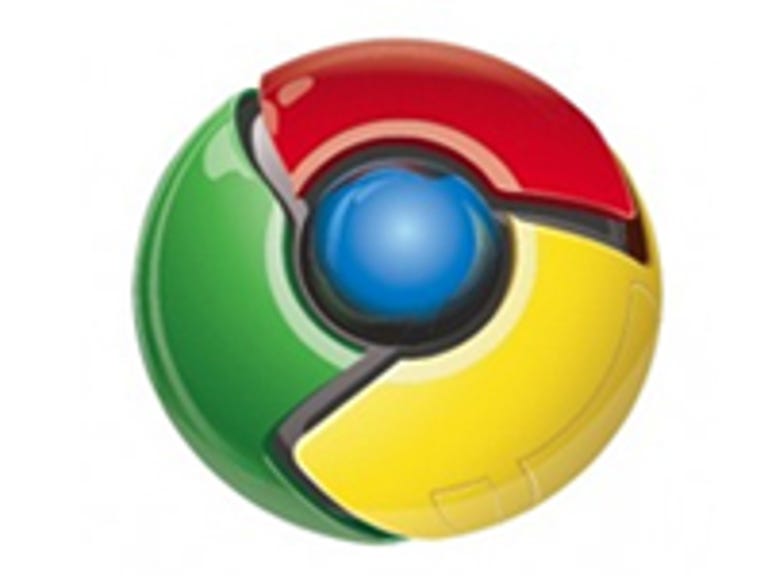
The big new feature (from a web surfer's perspective) in the Chrome 8.0.552 branch is Google's Chrome Web Store, a one-stop shop for various applications — everything from games to productivity applications is on offer, although at the time of writing, it's technically US only. This can be worked around with a credit card and a Google Checkout account, but developers keen on getting money out of Google should note that there's no way for Aussie developers to get paid — yet. Chrome Apps aren't really applications in the standard Windows sense; they're more like a mix of add-ons/extensions mixed with web pages, as nothing ends up as a distinct application on your desktop in the way you might expect.
As a browser, Chrome continues to be good at its core competency points. The stripped down look that every other browser is "borrowing" for its 2011 look was pioneered on Chrome, and it still arguably does it best, with a single bar for all searches and URL entry. PDF viewing is built in, and in version 8 it's sandboxed, so if you do end up with an errant PDF that would otherwise crash the whole browser session, everything else is protected.
The Chrome Web Store, in its current incarnation, probably isn't enough to get anyone to particularly switch camps if they're married to their current browser, but Chrome's swift page rendering, even in beta form, just might be.
From Google, we head into Operatic territory...
Where to get it: www.opera.com/browser/next/
Opera's main web page poses the question "What is faster than the fastest?", which, if nothing else, proves that the Norwegian firm doesn't really understand how comparative terms actually work. We do get what they're aiming at, though, which is to claim that Opera's browser is, perhaps, quicker than other browsers you might consider. The speed jokes continue with the latest beta, with the Spinal Tap-inspired tag line "This one goes to Eleven".
Opera has grimly kept hold of an idea that once permeated the browser space, namely that your browser could be multiple applications at once. It's the only browser in our round-up that comes with an integrated email client. It's neatly enough laid out, but the utility of this (especially in an age of web-based email clients that work across any browser) is debatable.

Opera's claim is that the browser code itself has been optimised to be 30 per cent smaller than Opera 10.60, making it a swifter install. It was fast to install in our tests, and while we weren't sitting with a stopwatch, we couldn't honestly say it was significantly faster than other browser installs. Once it's installed, it's there permanently anyway.
The big new feature for web surfers that Opera touts in Opera 11 is Tab Stacking. Clearly, we're all opening too many tabs at once, and Opera's solution to this crisis is to allow you to stack them into logical groups, which can then be previewed by hovering over a group, or fanned out across the tab bar. Creating groups is as simple as dragging one tab on top of another, although we did find it frustrating that you can't drag tabs sideways to group them. You've got to fully detach them from the tab bar and slot them back up onto another tab to create groups.
Mouse gestures have been made easier to access with a full visual GUI for quick page flipping, zooming, minimisation and duplication, depending on the gestures you wish to use. Mouse gestures are one of those features that you either love or loathe, but they're easily switched off if you don't like them.
Opera 11's browser bar also shrinks down longer URLs and more clearly displays the security information of a given site. Given the prevalence of phishing attacks, this is clearly a good thing.
And moving out of the beta space completely, we go on a Safari...
Apple Safari 5
Where to get it: www.apple.com/safari/download
Apple's notorious for not giving anything away until it's ready to say something, which makes reviewing Safari betas available to the general public rather difficult, although the company did reverse that position for a little while with Safari 4. As such, in the interests of testing something you can use too, we're stuck just looking at the regular stable release of Safari, which at the time of writing was version 5.03.
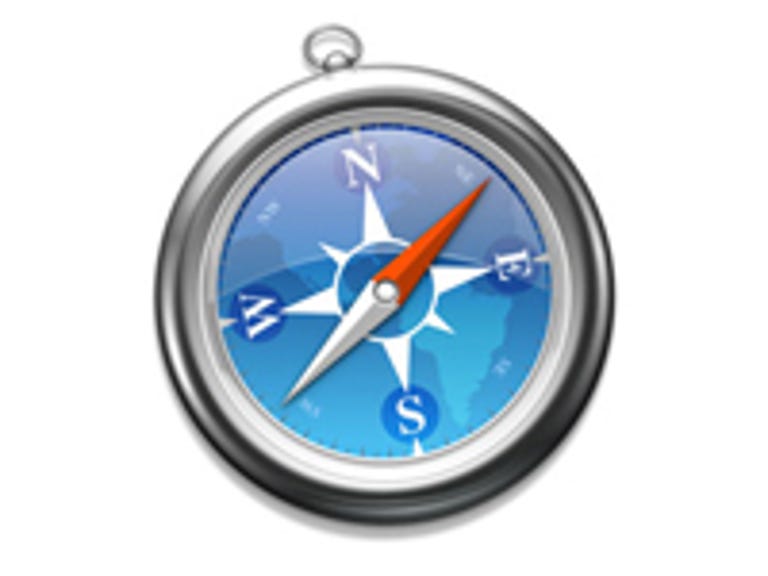
Safari doesn't boast a huge range of world-altering web browsing features, instead opting to run with that rather well-worn Apple credo of "it just works". And, indeed, Safari does just work, with a simple and slick interface that handles basic web tasks competently, if not in a manner that's all that exciting. The default "Top Sites" panel of commonly visited sites is a little more slick-looking than Google Chrome's very similar-looking "Most Visited" panel, but they both basically just do the same thing.
On a Mac, Safari takes the pride of place that Internet Explorer enjoys on Windows, and as such it's the default browser of many Mac users simply because it's "just there". On Windows, however, the reasons to switch to Safari, compared to other, more feature rich browsers, are less obvious. If you're a Mac user who intermittently dips into the PC world we could see the sense in a common user interface, but otherwise switchers would do better with something like Chrome or Firefox for an alternate browsing experience. It's not that Safari's bad at what it does, but in the free browser space, the alternatives simply do a little bit more.
Services and Software Guides
- Best iPhone VPN
- Best Free VPN
- Best Android VPN
- Best Mac VPN
- Best Mobile VPN
- Best VPN for Firestick
- Best VPN for Windows
- Fastest VPN
- Best Cheap VPN
- Best Password Manager
- Best Antivirus
- Best Identity Theft Protection
- Best LastPass Alternative
- Best Live TV Streaming Service
- Best Streaming Service
- Best Free TV Streaming Service
- Best Music Streaming Services
- Best Web Hosting
- Best Minecraft Server Hosting
- Best Website Builder
- Best Dating Sites
- Best Language Learning Apps
- Best Weather App
- Best Stargazing Apps
- Best Cloud Storage
- Best Resume Writing Services
- New Coverage on Operating Systems
- Hostinger Coupon Codes
- HR&R Block Coupons
- ShutterStock Coupon Codes
- FedEx Office Coupons
- Coursera Coupons
- Autodesk Coupons
- Codeacademy Coupon Codes
- iolo Techologies Coupons
- Norton Coupon Codes
Download Free
Mozilla Firefox vs Safari: A Comprehensive Browser Comparison
It's free and super easy to set up
When it comes to choosing a browser, there are plenty of options on the market. Two of the most popular browsers are Mozilla Firefox and Safari, both offering unique features and benefits to users. In this article, we'll take a closer look at both browsers to give you a better understanding of which one might be right for you.
Introduction to Mozilla Firefox and Safari
Mozilla Firefox is an open-source browser developed by the Mozilla Foundation. Its development began in 2002, and since then, it has become one of the most popular browsers out there. Firefox is known for its speed, privacy features, and customization options. It is available on multiple platforms, including Windows, macOS, and Linux, making it a versatile choice for users across the globe.
Firefox offers a range of features that make it a popular choice among users. One of its most significant advantages is its privacy features. Firefox has built-in tracking protection, which blocks third-party trackers from following you around the web. It also has a private browsing mode, which doesn't save your browsing history, cookies, or temporary files. Firefox also has a range of add-ons that can be used to further enhance your browsing experience.
Safari, on the other hand, is a browser developed by Apple exclusively for their devices. It was first released in 2003 and has since become a well-known browser among Apple users. Safari is known for its speed and energy efficiency. It is available on macOS, iOS, and iPadOS, making it a popular choice for Apple users across devices.
Safari offers a range of features that make it a popular choice among Apple users. One of its most significant advantages is its integration with the Apple ecosystem. Safari can sync your browsing history, bookmarks, and tabs across all your Apple devices, making it easy to pick up where you left off. Safari also has a range of privacy features, including Intelligent Tracking Prevention, which blocks third-party trackers from following you around the web.
Both Firefox and Safari have their advantages and disadvantages. Firefox is a versatile browser that is available on multiple platforms and offers a range of customization options. Safari, on the other hand, is a browser that is optimized for Apple devices and offers seamless integration with the Apple ecosystem. Ultimately, the choice between the two browsers comes down to personal preference and the devices you use.
Browser Performance
When it comes to browsing the internet, the performance of your browser can make a significant difference in your overall experience. Two popular browsers, Firefox and Safari, have both made strides in improving their performance in recent years.
Speed and Load Times
One of the most crucial aspects of browser performance is speed and load times. Firefox has a reputation for being a speedy browser, and recent updates have only improved its performance. The browser's Quantum engine has made significant improvements in page rendering and overall speed. On the other hand, Safari also performs well in terms of speed and load times, particularly on Apple devices. Safari's use of Apple's Nitro JavaScript engine and hardware acceleration has made it one of the fastest browsers available.
However, it's important to note that the speed and load times of a browser can be affected by various factors, such as internet connection speed and the complexity of the website being accessed.
Memory Usage and Efficiency
Another significant factor that can determine a browser's performance is memory usage and efficiency. Firefox has improved in this area with recent updates, but it does tend to use more memory than Safari. This can be a concern for users with limited RAM on their devices, as it can slow down overall performance. Safari, on the other hand, tends to be more efficient in its memory usage, making it a better option for users who have limited RAM on their devices.
It's worth noting that both browsers have implemented features to reduce memory usage, such as Firefox's "performance" settings and Safari's "energy-saving" mode. These features can help improve browser performance and reduce memory usage.
Stability and Reliability
When it comes to stability and reliability, both Firefox and Safari are relatively stable and reliable. However, Firefox does have a reputation among some users for occasional crashes. This can be a concern for users who rely heavily on their browser for work or other tasks. On the other hand, Safari is often praised for its stability and rarely experiences crashes or other issues.
Overall, both Firefox and Safari are popular and reliable browsers with their own unique strengths and weaknesses. Choosing the right browser for you will depend on your individual needs and preferences.
Security and Privacy Features
In today's digital age, security and privacy are of utmost importance to internet users. With the rise of cyber attacks and data breaches, it's crucial to have a web browser that offers robust security and privacy features. Two of the most popular web browsers, Firefox and Safari, offer a range of built-in security measures and privacy controls to ensure safe browsing.
Built-in Security Measures
Firefox and Safari both have their own set of built-in security measures to protect users from online threats. Firefox, for instance, has its own certificate authority, which helps to verify the authenticity of websites and ensure secure connections. The browser also offers phishing and malware protection, which helps to prevent users from falling victim to malicious attacks.
Similarly, Safari has an anti-phishing feature that warns users when they come across suspicious websites. It also has a secure password manager that helps to keep passwords safe and secure.
Privacy Settings and Controls
Privacy is a growing concern for internet users, and both Firefox and Safari offer a range of privacy settings and controls to help users protect their data. Firefox, in particular, has been focusing on enhancing its privacy features in recent updates. The browser now offers encrypted DNS, which helps to prevent third-party entities from tracking user activity. It also has remote anti-tracking, which helps to prevent websites from tracking users across the internet.
Safari, on the other hand, has been improving its intelligent tracking prevention feature, which helps to prevent cross-site tracking. The browser also has a range of privacy settings that users can customize to their liking.
Third-Party Extensions and Add-ons
Both Firefox and Safari allow users to install third-party extensions and add-ons to enhance their browsing experience. Firefox tends to have a wider selection of add-ons, which can be both a blessing and a curse. While users have more options to choose from, some add-ons may not be secure and could potentially compromise user data.
Safari, on the other hand, has a more curated selection of extensions and add-ons. This helps to ensure that users are installing only secure and trustworthy add-ons.
In conclusion, both Firefox and Safari offer a range of security and privacy features to ensure safe browsing. Users can choose the browser that best suits their needs based on their preferences and priorities.
User Interface and Customization
When it comes to user interface and customization, there are many factors to consider. While both Firefox and Safari have a clean and straightforward design, there are some notable differences between the two.
Design and Layout
Firefox and Safari both have a modern and sleek design, but Firefox takes it a step further with its customization options. Users can enable dark mode for a more comfortable browsing experience in low light environments, and they can choose from a variety of themes to personalize the look of their browser.
On the other hand, Safari has a simpler design with fewer distractions, which may be more appealing to users who prefer a streamlined interface. The minimalist approach of Safari also makes it easier to focus on the content of the webpage without any distractions.
Customization Options
Firefox offers a wide range of customization options, including the ability to move menus and toolbars to different locations on the browser window. This level of customization can be useful for users who want to optimize their browsing experience to fit their specific needs.
While Safari doesn't offer as many customization options as Firefox, it still provides enough flexibility to make it a viable option for many users. The simplicity of Safari's interface can be appealing to those who prefer a more straightforward browsing experience.
Accessibility Features
Accessibility is an important consideration for many users, and both Firefox and Safari offer features to make browsing more accessible to everyone. For example, users can enable voice commands to navigate the web using their voice, and they can enlarge the font to make it easier to read.
Firefox also offers a range of accessibility features, such as high contrast mode and the ability to change the font size and type. These features can be particularly useful for users with visual impairments or other disabilities.
Overall, both Firefox and Safari have their strengths and weaknesses when it comes to user interface and customization. While Firefox offers more customization options, Safari's simplicity may be more appealing to some users. Regardless of which browser you choose, both Firefox and Safari provide accessibility features to make browsing more accessible to everyone.
Cross-Platform Compatibility
Cross-platform compatibility is a critical factor for users who want to access their browsing history, bookmarks, and preferences across multiple devices. Both Safari and Firefox offer integration between their desktop and mobile versions, allowing users to sync bookmarks and browse seamlessly between devices.
Desktop and Mobile Integration
Firefox Sync offers seamless integration between desktop and mobile versions of the browser. Users can access their browsing history, bookmarks, and preferences across multiple devices, including smartphones, tablets, and desktop computers. Similarly, Safari offers integration across Apple devices, including macOS, iOS, and iPadOS. This means that users can access their bookmarks, browsing history, and preferences on their iPhone, iPad, and Mac without any hassle.
Syncing and Cloud Services
Safari has its own cloud service, iCloud, which allows users to integrate across Apple devices. With iCloud, users can sync their bookmarks, browsing history, and preferences across all their Apple devices. Firefox also offers syncing options, including the ability to sync add-ons and bookmarks to the cloud. This means that users can access their favorite add-ons and bookmarks on any device with Firefox installed.
Supported Operating Systems
Firefox is compatible with a range of operating systems, including Windows, macOS, and Linux. This makes it a versatile browser that can be used on a variety of devices. Safari, on the other hand, is exclusively available on Apple devices, including macOS, iOS, and iPadOS. This means that if you want to use Safari, you need to have an Apple device. However, if you do have an Apple device, you can enjoy the benefits of seamless integration across all your devices.
Developer Tools and Support
Developing a website can be a complex and challenging process, but luckily there are many tools and resources available to make it easier. In this article, we'll take a closer look at the developer tools and support offered by two popular web browsers: Firefox and Safari.
Built-in Developer Tools
Firefox and Safari both offer built-in developer tools that allow developers to debug and test their websites easily. These tools include a variety of features such as a console for logging errors, a network tab for monitoring network activity, and an element inspector for examining the HTML and CSS of a web page.
Firefox's developer tools are particularly robust, with a wide range of features and customization options. In addition to the standard tools mentioned above, Firefox also offers a responsive design mode for testing how a website looks on different screen sizes, a JavaScript debugger for finding and fixing errors in your code, and a performance tool for optimizing website speed.
Safari's developer tools are also powerful, but they have a simpler interface and fewer customization options than Firefox. However, Safari does offer some unique features such as a timeline tool for visualizing website performance and a canvas inspector for examining HTML5 canvas elements.
Extension and Add-on Development
Firefox has long been a favorite among developers, thanks to its wealth of add-ons and extensions. These add-ons can enhance the functionality of the browser itself, as well as provide tools for web development. Firefox's add-on development platform is open and flexible, allowing developers to create a wide range of extensions and customize the browser to their needs.
Safari, on the other hand, has stricter rules and guidelines around add-on development, making it a more curated experience. While this means there are fewer add-ons available for Safari, it also ensures that the ones that do exist are high-quality and well-maintained.
Community and Documentation
Firefox has a large and active developer community, offering a wealth of resources and support. The Mozilla Developer Network (MDN) is a comprehensive resource for web developers, with documentation, tutorials, and forums for asking questions and getting help. Firefox also has a strong presence on social media and hosts regular events and meetups for developers.
Safari also has developer resources available, but not to the same degree as Firefox. Apple's developer website offers documentation and guides for web development, as well as forums for asking questions and getting help. However, Safari's community is smaller and less active than Firefox's.
In conclusion, both Firefox and Safari offer powerful developer tools and resources, but Firefox has a more robust and active developer community, while Safari has a more curated approach to add-on development. Ultimately, the choice between these two browsers will depend on the specific needs and preferences of each individual developer.
Conclusion: Which Browser is Right for You?
Ultimately, the choice between Firefox and Safari comes down to personal preference and needs. Firefox may be a better choice for users who value customization and add-ons, while Safari is ideal for those in the Apple ecosystem who prioritize stability and security. Hopefully, this article has given you a better understanding of what each browser offers, helping you to make an informed decision when it comes to choosing a browser.
Let's set you up !
Working on the web!
Student Tips
Startup Tools
Browser Glossary
Browser Tips
- United States
- United Kingdom
The best Web browser: Chrome, Firefox, Internet Explorer, Opera, or Safari?
Find out which of the leading browsers is the perfect balance of features, speed, innovation, and flexibility for you.
Contributing writer, InfoWorld |
Not too long ago the job of a Web browser was simple: Get the text from the Internet and pour it into the window. If a tag like <strong> comes along, change the font. Now the challenges are greater because the browser is becoming the home for almost everything we do. Do you have documents to edit? There's a website for that. Did you miss a television show? There's a website for that. Do you want to announce your engagement? There's a website for that too. The Web browser handles all of that and more.
Choosing a best browser is an impossible job. On one hand, the programs are as close to commodities as there are in the computer industry. The core standards are pretty solid and the job of rendering the document is well understood. Most differences can be smoothed over when the Web designers use cross-platform libraries like jQuery. Many websites look the same in all of the major browsers, a testament to the hard work of the developers and their desire to get their information out to the largest audience.
[ Which Web browser is the most secure? Download InfoWorld's PDF report, " Web Browser Security Deep Dive: How to stay secure on the Internet ." ]
On the other hand, there's a lot of competition, and some very smart people are working hard to produce very clever new innovations. Yes, some of the so-called innovations are trivial, but if you're going so spend all day with a piece of software, it makes sense to be picky. While you may not care if someone moves a button from the left to the right, other users do -- and the discussion forums are filled with debate.
It may be impossible to be rational about many of the cosmetic issues, like the placement of buttons or the location of the tabs. These are intensely personal decisions, and the look and feel can often be changed with add-ons. There's not much point debating these issues.
The technical details can also be a bit personal and political, but they have bigger implications for developers and consumers everywhere. You may or may not like Adobe Flash , but the support or lack of support is important for all of us. Careers of Flash developers and the fate of projects they build will rise and fall on these issues. And Flash is just the beginning -- all of the browsers are rolling out various combinations of new features, but developers can't begin to use them until there's a stable platform with wide enough adoption. The control of the living room screen is worth billions of dollars, and the success or failure of the browser's video delivery mechanism will determine who may or may not have control over that shimmering rectangle and the zombie eyes glued to it.
Choosing a Web browser is made even harder because solid numbers are often preludes to debate. Some people complain when their browsers suck up every spare byte of memory. Others want their browsers to respond immediately. In many cases there's a trade-off because the programmers gain speed by filling up the memory and precomputing and precompiling every part of the Web page. You can have small or you can have fast, but you can't have both. In my SunSpider JavaScript benchmark tests, Opera and Chrome were fastest. In my memory consumption tests, Firefox proved leanest. And in HTML5 compatibility tests, Safari led the way. For more detail, and caveats, see the sidebar, " Battle of the Web browsers: HTML5 and memory tests ."
Often, the bloat isn't the fault of the browsers themselves, but the Web designers who lard up the site with endless AJAX calls and slick morphing features. Some users may blame the browser when they have 80-odd tabs opened to pages that are issuing AJAX calls left and right. The poor browser has to try to keep them all ready in case someone wants to see any of those tabs immediately.
Choosing among Chrome , Firefox , Internet Explorer , Opera , and Safari is not simple. All are perfectly good choices, but one may be slightly better for certain users than others. Sophisticated users, including developers, may want a browser that supports the latest standards, while casual users may want to avoid the cutting edge for simplicity and stability. Others may have a favorite plug-in they can't live without. Some users may want to choose based on the location of the buttons. The choices are close enough that this could be fair if you really care about your interface.
- Internet Explorer
- React Native
- CSS Frameworks
- JS Frameworks
- Web Development
Opera vs Safari
- Brave vs Safari
- Safari vs Firefox
- Safari vs Google Chrome
- DuckDuckGo vs Safari
- Microsoft Edge vs Safari
- Brave vs Opera
- Opera vs Chrome
- Bootstrap vs Material UI
- Flash vs Maya
- Apple Safari Browser
- Shortcuts for Safari Developer Tools
- How to use Safari for web development
- Console Tab in Safari Browser
- Layer Tab in Apple Safari Browser
- How to Allow Pop-Ups in Safari?
- Sources Tab in Apple Safari Browser
- Storage Tab in Apple Safari Browser
- Developer Mode in Safari Browser
- Graphics Tab in Apple Safari Browser
- Difference between BFS and DFS
- Differences between TCP and UDP
- Difference between comparing String using == and .equals() method in Java
- Stack vs Heap Memory Allocation
- Differences between JDK, JRE and JVM
- Differences between Procedural and Object Oriented Programming
- Difference between Process and Thread
- Differences between IPv4 and IPv6
- Difference Between Call by Value and Call by Reference in C
- Difference between C and C++
Opera is a platform-independent web browser. It was developed by Opera software company. Its initial release was in 1995 and the latest version was released in 2022. It is based on chromium but it has certain advanced features. It is available in nearly 42 languages. This web browser was built using the C++ programming language. It supports various operating systems like Windows, Mac etc.
Safari is also a web browser used for surfing the internet and it was built by Apple. It was mainly used on the Mac operating system but it can also be used on Windows operating system. Initially, it was released in 2003, just like chrome it is also freeware. It is open source and is written using different programming languages like C++, Swift etc.

Following is a table of differences between Safari and Opera:
Please Login to comment...
Similar reads.
- Web Technologies - Difference Between
- Difference Between
- Web Technologies

Improve your Coding Skills with Practice
What kind of Experience do you want to share?
Browser benchmarks: IE, Firefox, Opera and Safari

When Tim Berners-Lee presented his employer CERN with the first browser, WorldWideWeb , to facilitate information flow between the different departments in the European nuclear research centre in Geneva, he little suspected that it would cause a revolution in the information age. Today, the browser is probably the most widely used computer application.
However, the tasks performed by a web browser have changed significantly. As well as displaying text and images, the modern browser needs to accommodate technologies such as JavaScript , DOM and XML in Ajax-based programs. Even if you're not familiar with Ajax , you'll probably have used it via Google Maps , Google Mail or AjaxWrite ; sites such as Flickr and Last.fm also make intense use of this technology. Ajax has even taken root in the business environment: for example, 24SevenOffice is an Enterprise Resource Planning (ERP) and Customer Relationship Management (CRM) solution that runs in a web browser. The advantage of this Web 2.0 technology is platform independence: you don't need a specific operating system or processor to run Ajax applications — just a compatible browser.
Web 2.0 applications and sites place the focus firmly on browser performance. Anyone who still believes that the speed of your DSL connection is the only potential bottleneck is gravely mistaken. Key parts of Ajax applications run locally, which means that — all other things being equal — the speed of the browser will be crucial in determining the user experience. For Ajax-based business applications, the browser becomes even more important because data will be accessed from within-firewall servers rather than the internet. Companies deploying such solutions will be able to improve employee productivity by paying attention to browser performance.
To test the performance of browsers when handling Web 2.0 technologies, we used the iBench 5.0 test suite and SunSpider , a Javascript benchmark.
iBench evaluates browser performance by measuring how fast HTML, XML and JavaScript is handled. The web pages are held on a local web server. SunSpider, which (unlike iBench) is available online, concentrates solely on JavaScript performance. Tests are grouped into nine categories , including 3D, bit operations, cryptography and string processing; there are several tests within each group. The benchmark runs each test multiple times and calculates an error range.
Obviously the speed of the hardware platform is a crucial variable. In our browser tests under Windows Vista and Mac OS 10.5.2 Leopard, we used the following components:
Windows Vista SP1: HTML, XML, JavaScript (iBench 5.0)
The seven browsers we tested load HTML and XML/CSS pages under Windows Vista at a variety of speeds. According to iBench 5.0, Safari 3.1 is the fastest browser and Opera 9.27 the slowest; the latter takes over twice as long as any other browser to load HTML pages. However, the beta version of Opera 9.5 performs significantly better, and is on a par with the middle-ranking browsers.
In the iBench 5.0 JavaScript tests, Safari 3.1 is again the fastest browser, while Microsoft's browsers bring up the rear in JavaScript/HTML DOM tests. The JavaScript tests also expose greater performance differences among the browsers than the HTML/XML tests: in the JavaScript tests, the slowest browser is about 10 times slower than the fastest.
The various beta versions show significant performance improvements in some tests. For example, Firefox 2.0.13 completed the JavaScript/HTML DOM test in 3.1 seconds, while the Firefox 3 Beta 5 took only 0.65 seconds. The two Opera browsers show a similar pattern: Opera 9.27 was slowest in the JavaScript test (2.54s), while Opera 9.5 Beta 4758 delivered the second best result (0.36s).
It should be noted that iBench 5.0's reported values for the Safari browser are underestimates of the actual timings, which we checked manually. The reason is the measuring methodology in iBench 5.0, which uses the 'onload' event to signal that a page has been loaded: most browsers load the page, decode images and run stylesheets and scripts before firing 'onload'. Safari does not do this . There's no doubt that Apple's browser is fast, but it's not as far ahead of its competitors as iBench 5.0 suggests — as our next test shows.
Timings in seconds: shorter bars are better.
Windows Vista SP1: SunSpider JavaScript
The SunSpider JavaScript benchmark shows Microsoft's current browser in a poor light: as in the iBench JavaScript/HTML DOM test, Internet Explorer 7 is by far the slowest of the group. Firefox fans will be pleased with the speed of version 2.0.0.13 compared to IE 7, but Opera 9.27 and Safari 3.1.0 are the real winners here.
Things look different when we consider the beta versions. Microsoft improves its position significantly with IE 8 Beta 1, although it's still the slowest of the betas. Meanwhile, Firefox, whose current version only manages second-last place, leaps to the top of the class ahead of Safari with version 3 Beta 5.
The individual SunSpider JavaScript benchmarks show the strengths and weaknesses of particular browsers, and where the beta versions show the most improvements. The poor performance of Internet Explorer 7, for example, is due to its slow string processing. IE 8 Beta 1 delivers a significantly better result in this test and reels in some of the competition, although it remains slow compared to the other betas and Safari. The current version of Firefox is weak in string and 3D processing and bit operations, but version 3 Beta 5 overcomes these weaknesses to take first place in all of the tests.
Timings in milliseconds: shorter bars are better.
Mac OS X 10.5.2: HTML, XML, JavaScript (iBench 5.0)
According to Apple boss Steve Jobs, the company's Safari browser is the fastest on the market. However, Apple has something of a history with benchmarks: when the PowerMac G5 was introduced in 2003, for example, the company was accused of tweaking its test system and hobbling rival Intel-based machines . Since then, of course, Apple has come round to the attractions of Intel processors .
Jobs' statement that the fastest Safari browser is based on tests the company has carried out using iBench 5.0. However, these benchmark results should be treated with caution: manual measurements with a stopwatch show that Safari is not quite as fast as iBench suggests. This is because, as mentioned earlier, iBench uses the JavaScript 'onload' event to determine page loading time, which Safari triggers before the page has in fact finished loading. Even so, despite these caveats , there's no doubt that Safari is indeed a fast browser.
Safari 3.1.0 is quickest in the HTML tests with a time of under 10 seconds, placing it well ahead of Opera 9.27's 48 seconds. However, the STAND Safari plug-in extends the load time to over 18 seconds — perhaps because it prevents the premature page-loading statement normally reported by iBench. The beta version of Opera 9.5 manages to reduce the load time from over 48 seconds in version 9.27 to less than 20 seconds. In the XML/CSS test, Safari again takes first place — and here, the STAND plug-in has no significant impact on performance. Opera brings up the rear in this test, and this time the 9.5 beta brings no improvement.
Safari is the winner in the JavaScript tests too. These tests also demonstrate the benefits that browser development can deliver. Among the beta versions, Firefox 3 Beta 5 is particularly impressive compared to its predecessor, reducing Firefox 2.0.13's 3.91 seconds to just 1.07 seconds in the HTML/JavaScript DOM test. Opera and Safari also deliver significant performance improvements in their respective betas.
Mac OS X 10.5.2: SunSpider JavaScript
Of the current Mac OS X browsers, Safari 3.1 is clearly the fastest in the SunSpider JavaScript benchmark. However, Firefox 3 Beta 5 beats Apple's browser by a noticeable margin. Elsewhere, the Opera 9.5 beta improves on its predecessor, although it cannot match the performance of Safari and Firefox 3 Beta 5.
The individual tests show exactly how Firefox 3 Beta 5 has overhauled Safari, and where Opera needs to improve in order to catch Firefox and Safari. For example, Firefox 3 Beta 5 took 187 milliseconds for the bit operations test, compared to the current version's 2,241ms. Opera 9.5 Beta also improves on the current version, but not to the same extent.
As well as pure performance, it's important to consider the browsers' resource requirements. Although the CPU load is pretty consistent among the browsers, this is not the case with memory consumption.
In the first test, a web site is loaded and memory consumption measured. A second test measures the resources needed to load 10 tabbed sites. We chose sites without advertising, since the constantly changing content of such sites does not allow for reproducible results: for example, one time you may get a simple image, while the next time the page is loaded a Flash animation may appear.
With only one web site to display, the browsers use between 18.5MB and 35.3MB of memory under Mac OS X 10.5.2. Safari is the most memory-frugal, while Firefox is the biggest memory-hog. However, the picture changes if ten sites are loaded at the same time. Now, Firefox 3 Beta 5 leads the field with 76.2MB, followed by Safari with 93.7MB. Safari uses slightly more memory (98.1MB) if the STAND plug-in is installed. Opera 9.27 uses 134.5MB, while Opera 9.5 Beta uses 139.3MB — slightly more than Firefox 2.0.0.13 with 138.8MB.
Memory usage patterns vary widely under Windows Vista too. With only one web site, Microsoft's browsers perform well: Firefox uses around twice as much RAM as Internet Explorer, while Opera and Safari use around three times as much. With ten sites loaded, the results are almost reversed. Now IE brings up the rear with 143.7MB, while Firefox 3 Beta 5 only uses 50.8MB. As with Mac OS, Firefox 3 Beta 5 is the most memory efficient. The Opera versions use 66.8MB (9.27) and 77.8MB (9.5 Beta), while Safari and Firefox 2.0.13, with 113.3MB and 94MB respectively, need much more memory — but still less than IE.
Memory use in megabytes: shorter bars are better.
Platform comparison: Mac OS v Vista
It's interesting to compare the browsers on different platforms. In the SunSpider JavaScript test, Opera performs best under Windows Vista while Firefox 2.0.0.13 shines under Mac OS. The beta versions and Safari show no significant performance differences across platforms.
In the iBench 5.0 HTML tests, the Windows versions of Firefox are faster than their Mac OS counterparts. With Safari and Opera 9.50 Beta, precisely the opposite is true, while Opera 9.27 performs much the same on Vista and Mac OS. In the XML/CSS tests, all of the browsers except Opera 9.27 are slightly faster under Windows Vista.
Safari is undoubtedly one of the fastest browsers available, even if iBench 5.0 delivers slightly optimistic scores (the SunSpider JavaScript benchmark does not seem to be affected). Under both Mac OS X 10.5.2 and Windows Vista SP1, Apple's browser is a front-runner.
The worst-performing browser in our tests is Internet Explorer 7 — The SunSpider JavaScript benchmark, in particular, shows up the deficiencies of Microsoft's current browser. Things may change with Internet Explorer 8, as the first beta version shows a significant performance improvement. However, the competition is not standing still, with new versions of Firefox (3) and Opera (9.5) closer to release than IE 8.
Overall, and taking the performance of the beta versions into consideration, the browser performance rankings are as follows: Firefox and Safari in a clear lead ahead of Opera and finally Internet Explorer. Firefox 3, due in June, promises very good performance and efficient memory usage. No browser used less memory to open multiple sites than the Beta 5 version of Firefox 3, and only a few sites failed to display correctly. Safari and Opera, however, are more likely to exhibit incompatibilities.
These tests show that when it comes to browser performance, there's plenty of scope for improvement. In some tests, we observed speed boosts of the order of 100 per cent between the current version and the latest beta.
The work laptop I recommend to most people is not made by Apple or Lenovo
7 reasons i use copilot instead of chatgpt, have an old kindle whatever you do, do not do this one thing.

IMAGES
VIDEO
COMMENTS
Chrome maintains its longtime lead on this test with a score of 528. Edge, Opera, and other Chromium-based browsers hew closely to Chrome. Firefox and Safari bring up the rear, at 515 and 468 ...
Chrome, Safari, Vivaldi, Opera, and Firefox all rely on Google's Safe Browsing API to detect potentially dangerous sites. Thanks to constant updates, Mozilla, Chrome, and Opera all make constant ...
3.0 Good. The default Mac and iOS browser is a strong choice, though its interface has some nonstandard elements. Safari was a forerunner in several areas of browser features. For example, it was ...
Chrome came out on top in JetStream 2 testing, while Safari took second place. MotionMark browser benchmarks. Safari was the fastest in MotionMark benchmark testing. Speedometer browser benchmarks ...
Read about new Firefox features and ways to stay safe online. Release Notes. Get the details on the latest Firefox updates. View all Firefox Browsers. Products. Close Products menu. Mozilla Monitor. See if your email has appeared in a company's data breach. Facebook Container.
Support for Dolby Digital and screenshots. Opera and other Chromium-based browsers hew closely to Chrome, while Firefox gets 491, and Safari 471. Just a few years ago, a score in the 300s was ...
Chrome currently leads with a score of 528. Opera and other Chromium-based browsers hew closely to this, while Edge gets 492, Firefox 491, and Safari 471. Just a few years ago, a score in the 300s ...
It's a pretty equal match. Opera Browser and Safari offer productivity features with similar functionality, like file sharing, data synchronization, reader mode and user accounts. Opera productivity features focus more on web navigation and organization, while Safari focuses on accessibility. Download Opera.
We pick our favourites, including Safari, Edge, Chrome, Brave, Vivaldi and more. By Martyn Casserly. Contributor DEC 16, 2022 3:42 am PST. We spend a lot of our time on browsers. Whether it's ...
Browser comparison Opera and Firefox. Summary: Opera is the best browser in terms of privacy, speed, and freedom of customization when compared to Mozilla Firefox. Opera offers more unique features for productivity and lets you access more content directly in your browser.
Whether Chrome, Firefox, Internet Explorer, Opera, or Safari is your current choice, our tests found distinct differences in speed and ease of use. We also compared how each browser uses system ...
Choosing among Chrome, Firefox, Internet Explorer, Opera, and Safari is not simple. All are perfectly good choices, but one may be slightly better for certain users than others.
Apple's Safari browser (based on Webkit) is really the only choice on iOS, for example. Still, it's concerning. Let's take a look at the four major options—Chrome, Edge, Firefox, and Opera ...
You probably take your web browser for granted, but you have real options: Performance, feature sets, and privacy tools vary wildly among internet-surfing ap...
From looking at the beta version of Firefox 4, it's clear that browser minimalism and top-loading tabs are the new black in browser design. Like IE9, Chrome and Safari, the newest version of ...
The winner here, and it wasn't even close, was Chrome 15. Firefox came in a distant second, followed a long way back by Opera, Safari and IE. V8 November 2011 Web Browser Benchmarks. In Google's ...
Firefox is a versatile browser that is available on multiple platforms and offers a range of customization options. Safari, on the other hand, is a browser that is optimized for Apple devices and offers seamless integration with the Apple ecosystem. Ultimately, the choice between the two browsers comes down to personal preference and the ...
In my SunSpider JavaScript benchmark tests, Opera and Chrome were fastest. In my memory consumption tests, Firefox proved leanest. And in HTML5 compatibility tests, Safari led the way. For more ...
We have seen many people saying "Hey! Don't use IE, use Firefox, it's better browser". On the other hand some people say "Don't use Firefox, use Opera, it's the fastest web browser on earth". Some say "Use Safari, new browser from Apple, it's the best". Some people claim Google Chrome is the most popular web browser and so on.
4. The performance of opera is comparatively lower than safari. It provides the best in class performance and is known for its browsing experience. 5. It focuses more on normal people than developers. Developers consider it the best web browser according to their needs. 6. It provides a built-in speed dial feature.
Now IE brings up the rear with 143.7MB, while Firefox 3 Beta 5 only uses 50.8MB. As with Mac OS, Firefox 3 Beta 5 is the most memory efficient. The Opera versions use 66.8MB (9.27) and 77.8MB (9.5 ...
Opera. To see what version of Opera you're using, you'll need to do the following. Once the browser opens, click on the Red O at the top left of the display and go to Help. When the side- menu appears, click on About Chrome. The browser will look for any available updates, but that's where you can also see the version you're running on.
It's of course, the same Blink used in Opera. Successfully tested in: Firefox 0.8 - 61; Chrome 1.0 - 71; Opera 8.0 - 34; Safari 3.0 - 10; IE 6 - 11; Edge - 20-42; Edge Dev - 80.0.361.9; Updated in November 2016 to include detection of Safari browsers from 9.1.3 and upwards. Updated in August 2018 to update the latest successful tests on chrome ...